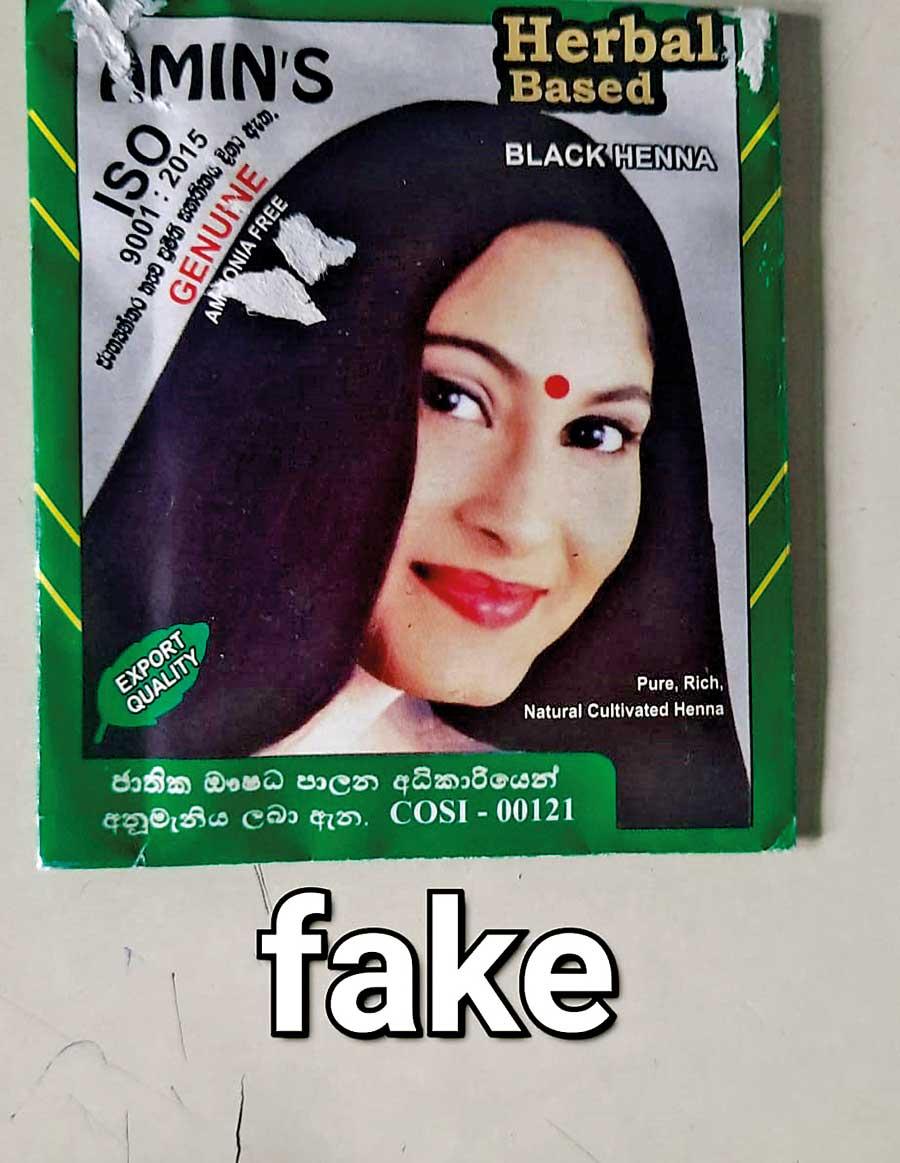
The fake 10 gram packet sold in the market
In 2021, the Central Environmental Authority (CEA) planned to issue a gazette prohibiting the production of various types of plastic, including yogurt and ice cream cups. This was detailed in the Extraordinary Gazette No. 2211/51, issued on January 21, 2021 which was signed by the then Environment Minister Mahinda Amaraweera on January 19, 2021.
in the Extraordinary Gazette No. 2211/51, issued on January 21, 2021 which was signed by the then Environment Minister Mahinda Amaraweera on January 19, 2021.
The gazette imposed a ban on the production of plastic spoons, forks, yogurt and ice cream spoons and similar items. Furthermore, the Ministry of Environment implemented measures to halt the production of sachets , PET bottles storing pesticides and inflatable toys with effect from March 31, 2021. Factories manufacturing sachets were thoroughly inspected by the CEA in an attempt to prevent them from entering the market.
Even though a ban to manufacture sachets was in effect, the CEA conducted a raid on a factory situated in Jaburaliya area in Madapata, Kesbewa Divisional Secretariat, which continued
|
Vishwa de Silva |
to manufacture sachets despite the ban. The CEA took prompt legal action in July 2021 as means of enforcing the law in effect. The CEA took immediate measures to remove the sachets in question while pursuing legal action against the company responsible for producing sachets in violation of the ban that had been imposed.
However, despite previous efforts, banned sachets have been reintroduced to the market. For instance, 10 gram packets of black henna dye are visibly seen in stores for the past six months. The CEA has been accused of not taking the initiative to remove them from the market. Furthermore, these banned sachets are being distributed under the name of a prominent company known for importing black henna dye into the country.
“I discussed this matter with our board of directors. There are two laws in this country. This is a double game. The CEA is trying to shut down legitimate businesses like ours. The 10-gram black henna dye labeled as ‘Amin’s’ is not our product. This is a mafia”-
Dr. Clarence Kumarage, Chairman Charith Enterprises
If a ban on sachets is in effect, there is no possibility for 10 gram black henna dye packets to resurface in the market. If they are available, they are counterfeit products. Furthermore, the law prohibits the use of black henna dye contained in these sachets . There is nobody to take responsibility for any allergies or other potential hazards stemming from the use of black henna dye. The presence of carcinogens or other harmful chemicals in these products is unknown. There has been no investigation conducted regarding this matter. The entry of black henna dye into Sri Lanka has occurred through illegal means or as part of a fraudulent scheme disguised under the pretext of complying with the law. The CEA too has failed to enforce the law in this regard.
 Following the ban, 21 gram black henna dye packets were permitted for sale in the market. Consequently, businessmen in this sector adhered to government regulations by selling 21 gram black henna dye packets instead of 10 gram sachets . Currently, both types of black henna dye packets – one set produced in compliance with Environment Ministry standards and the other set of banned 10 gram packets- are available in the market.
Following the ban, 21 gram black henna dye packets were permitted for sale in the market. Consequently, businessmen in this sector adhered to government regulations by selling 21 gram black henna dye packets instead of 10 gram sachets . Currently, both types of black henna dye packets – one set produced in compliance with Environment Ministry standards and the other set of banned 10 gram packets- are available in the market.
Details mentioned on the banned 10 gram black henna dye sachets indicate that they are being imported to Sri Lanka by a company named Charith Enterprises with an address in Nugegoda. This company distributes 21-gram black henna dye packets in accordance with government regulations. But the same company also sells the illegally imported 10 gram black henna dye packet under the brand name ‘Amins’. This packet closely resembles their 21 gram black henna dye packet and even includes an ISO standard certificate and the National Medicines Regulatory Authority approval. Once again, the CEA has been accused of their failure to take appropriate action in this regard.
“The CEA is trying to frame us” – Dr. Kumarage
When the matter was taken up with Dr. Clarence Kumarage, Chairman of Charith Enterprises, he acknowledged the matter. “I discussed this matter with our board of directors. There are
|
Dr. Clarence Kumarage |
two laws in this country. This is a double game. The CEA is trying to shut down legitimate businesses like ours. The 10-gram black henna dye labeled as ‘Amin’s’ is not our product. This is a mafia. For the past 25 years, we have been selling henna dye that is safe for the body. We also faced significant economic challenges during the COVID-19 pandemic. Subsequently, when import restrictions were lifted, fraudsters took advantage of the situation. By fraudulently scanning our packet and using our name, they have produced counterfeit packets under our brand and have captured the market,” said Dr. Kumarage.
He further said that they had brought this matter before the CEA and had even complained in writing, but no action has been taken as yet. “We respect the government’s law. The government said that the environmental damage would be reduced when 10 gram sachets are banned from the market. But this decision seems illogical. Typically, only 10 grams of dye is used in the dyeing process. When using a 21 gram packet, the remaining amount of unused dye is wasted as it doesn’t have the same quality as dye that comes in a sealed pack. This affects consumers’ budget as well. In an attempt to address this, we proposed separating the 21 gram packet into two equal portions of 10.5 grams each, marked by a dotted line. However, the CEA did not approve of this solution,” Dr. Kumarage continued.
He further said that this law was introduced by an economic impostor who damaged our country’s economy. “While we abide by government regulations, the implementation of this law has allowed fraudsters to take control of our market. As a result, our businesses are now facing imminent closure. When I raised this issue with the CEA, they said that they would seize fake products. However, after they apprehended them, they told the media that they seized ‘Amin’s’ products leaving our company even more affected. They do not say that they seized fake products under the brand name ‘Amin’s’. Fraudulent companies take advantage of this situation. This is why I said there are two laws in this country. We therefore request authorities to conduct a fair investigation and seize any fake products in the market,” Dr. Kumarage urged.
Echoing similar sentiments, Vishwa de Silva, Director of Giriva Lanka Cosmetic Company said that prior to the implementation of this ban, his Company had placed an order to purchase 10 gram sachets from India. “But when we received the order in July 2021, the ban on sachet packet black henna dye was in effect. Respecting the government’s laws, we stored these items in our warehouses but refrained from releasing them to the market. Subsequently, we spent more money to import 21 gram black henna dye packets. Despite this, the CEA visited our warehouses and indicated their intention to enforce the law, but we didn’t release a single packet to the market,” said De Silva.
“When we received the order in July 2021, the ban on sachet packet black henna dye was in effect. Respecting the government’s laws, we stored these items in our warehouses but refrained from releasing them to the market. Subsequently, we spent more money to import 21 gram black henna dye packets”
- Vishwa de Silva, Director of Giriva Lanka Cosmetic Company
He further said that even though we were instructed against releasing our products into the market, there are 10-gram black henna dye packets under the brand name ‘Amin’s’. “That company itself is unable to locate the source of these packets. These fake products have caused significant issues in our market. When we raised this issue with the CEA, they responded by stating that they cannot issue a letter to remove products bearing a fake name. When I raised this issue again, the CEA informed me that there were fake 10-gram black henna dye packets bearing the name ‘Jamila’ in the market, and instructed to seize them. However there were no fake 10-gram black henna dye packets in the market under that name,” De Silva added.
The Director General of the CEA issued a directive to the Assistant Director of Complaint Unit on 13-03-2024 (Letter No. WP/CM/PHO/INV/0002/202) instructing the unit to conduct an investigation into the presence of fake 10-gram black henna dye packets in the market.
In response to this, in Letter No. CAE/INV/01/2018 dated 28-03-2024, PB Hemantha Jayasinghe, Director General of the CEA, responds to a letter sent by Saman Ratnapriya, Director General of Trade Unions to the President on 18-03-2024. The letter states that Giriva Lanka Cosmetics has issued 10 gram black henna dye packets into the market under the brand name ‘Jamila’ while instructing the relevant units to seize the products and apprehend officials linked to the company as means of enforcing the law. Copies were sent to Vishwa de Silva and CEA provincial offices.
The fact that 10 gram black henna dye packets were initially available in the market under the brand name ‘Amins’ and a subsequent letter with CEA Director General’s name to seize products coming under the brand name ‘Jamila’ had raised considerable doubts among industry stakeholders.
“We can’t raid all fake products in the country” – CEA official
When questioned about this matter, a chief officer of the CEA’s Raid Unit stated that he lacked the authority to provide information regarding it. However, he confirmed that a letter had been sent by mistake to the provincial offices instructing them to confiscate the banned products under the name of Jamila, and added that corrective measures would be taken. Additionally, he said that in instances where the CEA intervenes to apprehend banned goods in the market, concerned companies should lodge complaints with the CID to initiate investigations if their brand names had been affected. Subsequently, the officer provided a phone number on April 10, 2021 and advised this paper to contact CEA’s Deputy Director General Ajith Weerasundara for further information.
When this paper contacted Ajith Weerasundara, he informed this writer that he was unable to provide a statement as he had retired from service on April 12, 2024. Subsequently, the Chief Officer of the Raid Unit was contacted again and it was clarified that the individual acting as the media officer on that day was someone else, and that there had been no replacements yet. It was also informed that raids are underway to seize 10 gram black henna dye packets although the officer acknowledged the existence of a challenge of addressing the issue nationwide. Furthermore, it was revealed that the dye had been in the market for six days and not six months.
Several attempts made to contact CEA Director General Hemantha Jayasinghe proved futile.

The hair dye meeting the specifications of the authorities
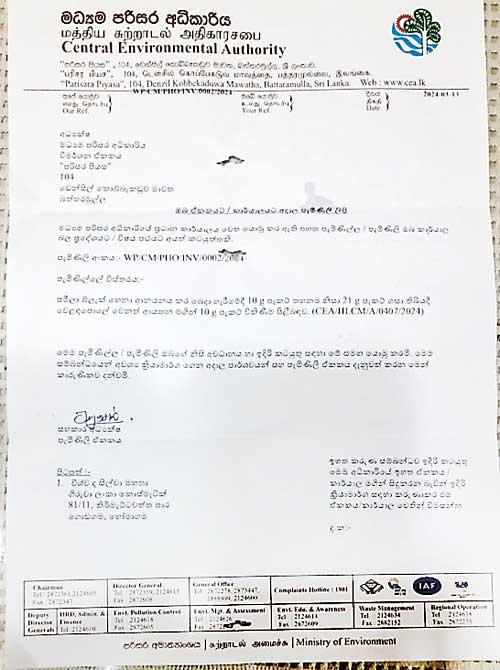
The letter sent to by Vishwa de Silva to the Cental Enviormental Authority
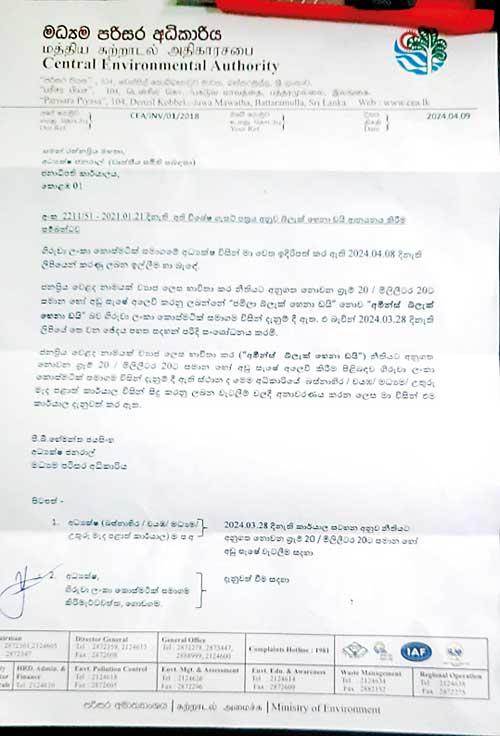
The letter sent to the Cental Enviormental Authority rectifying the error
 ]]>
]]>

The fake 10 gram packet sold in the market
In 2021, the Central Environmental Authority (CEA) planned to issue a gazette prohibiting the production of various types of plastic, including yogurt and ice cream cups. This was detailed in the Extraordinary Gazette No. 2211/51, issued on January 21, 2021 which was signed by the then Environment Minister Mahinda Amaraweera on January 19, 2021.
in the Extraordinary Gazette No. 2211/51, issued on January 21, 2021 which was signed by the then Environment Minister Mahinda Amaraweera on January 19, 2021.
The gazette imposed a ban on the production of plastic spoons, forks, yogurt and ice cream spoons and similar items. Furthermore, the Ministry of Environment implemented measures to halt the production of sachets , PET bottles storing pesticides and inflatable toys with effect from March 31, 2021. Factories manufacturing sachets were thoroughly inspected by the CEA in an attempt to prevent them from entering the market.
Even though a ban to manufacture sachets was in effect, the CEA conducted a raid on a factory situated in Jaburaliya area in Madapata, Kesbewa Divisional Secretariat, which continued
|
Vishwa de Silva |
to manufacture sachets despite the ban. The CEA took prompt legal action in July 2021 as means of enforcing the law in effect. The CEA took immediate measures to remove the sachets in question while pursuing legal action against the company responsible for producing sachets in violation of the ban that had been imposed.
However, despite previous efforts, banned sachets have been reintroduced to the market. For instance, 10 gram packets of black henna dye are visibly seen in stores for the past six months. The CEA has been accused of not taking the initiative to remove them from the market. Furthermore, these banned sachets are being distributed under the name of a prominent company known for importing black henna dye into the country.
“I discussed this matter with our board of directors. There are two laws in this country. This is a double game. The CEA is trying to shut down legitimate businesses like ours. The 10-gram black henna dye labeled as ‘Amin’s’ is not our product. This is a mafia”-
Dr. Clarence Kumarage, Chairman Charith Enterprises
If a ban on sachets is in effect, there is no possibility for 10 gram black henna dye packets to resurface in the market. If they are available, they are counterfeit products. Furthermore, the law prohibits the use of black henna dye contained in these sachets . There is nobody to take responsibility for any allergies or other potential hazards stemming from the use of black henna dye. The presence of carcinogens or other harmful chemicals in these products is unknown. There has been no investigation conducted regarding this matter. The entry of black henna dye into Sri Lanka has occurred through illegal means or as part of a fraudulent scheme disguised under the pretext of complying with the law. The CEA too has failed to enforce the law in this regard.
 Following the ban, 21 gram black henna dye packets were permitted for sale in the market. Consequently, businessmen in this sector adhered to government regulations by selling 21 gram black henna dye packets instead of 10 gram sachets . Currently, both types of black henna dye packets – one set produced in compliance with Environment Ministry standards and the other set of banned 10 gram packets- are available in the market.
Following the ban, 21 gram black henna dye packets were permitted for sale in the market. Consequently, businessmen in this sector adhered to government regulations by selling 21 gram black henna dye packets instead of 10 gram sachets . Currently, both types of black henna dye packets – one set produced in compliance with Environment Ministry standards and the other set of banned 10 gram packets- are available in the market.
Details mentioned on the banned 10 gram black henna dye sachets indicate that they are being imported to Sri Lanka by a company named Charith Enterprises with an address in Nugegoda. This company distributes 21-gram black henna dye packets in accordance with government regulations. But the same company also sells the illegally imported 10 gram black henna dye packet under the brand name ‘Amins’. This packet closely resembles their 21 gram black henna dye packet and even includes an ISO standard certificate and the National Medicines Regulatory Authority approval. Once again, the CEA has been accused of their failure to take appropriate action in this regard.
“The CEA is trying to frame us” – Dr. Kumarage
When the matter was taken up with Dr. Clarence Kumarage, Chairman of Charith Enterprises, he acknowledged the matter. “I discussed this matter with our board of directors. There are
|
Dr. Clarence Kumarage |
two laws in this country. This is a double game. The CEA is trying to shut down legitimate businesses like ours. The 10-gram black henna dye labeled as ‘Amin’s’ is not our product. This is a mafia. For the past 25 years, we have been selling henna dye that is safe for the body. We also faced significant economic challenges during the COVID-19 pandemic. Subsequently, when import restrictions were lifted, fraudsters took advantage of the situation. By fraudulently scanning our packet and using our name, they have produced counterfeit packets under our brand and have captured the market,” said Dr. Kumarage.
He further said that they had brought this matter before the CEA and had even complained in writing, but no action has been taken as yet. “We respect the government’s law. The government said that the environmental damage would be reduced when 10 gram sachets are banned from the market. But this decision seems illogical. Typically, only 10 grams of dye is used in the dyeing process. When using a 21 gram packet, the remaining amount of unused dye is wasted as it doesn’t have the same quality as dye that comes in a sealed pack. This affects consumers’ budget as well. In an attempt to address this, we proposed separating the 21 gram packet into two equal portions of 10.5 grams each, marked by a dotted line. However, the CEA did not approve of this solution,” Dr. Kumarage continued.
He further said that this law was introduced by an economic impostor who damaged our country’s economy. “While we abide by government regulations, the implementation of this law has allowed fraudsters to take control of our market. As a result, our businesses are now facing imminent closure. When I raised this issue with the CEA, they said that they would seize fake products. However, after they apprehended them, they told the media that they seized ‘Amin’s’ products leaving our company even more affected. They do not say that they seized fake products under the brand name ‘Amin’s’. Fraudulent companies take advantage of this situation. This is why I said there are two laws in this country. We therefore request authorities to conduct a fair investigation and seize any fake products in the market,” Dr. Kumarage urged.
Echoing similar sentiments, Vishwa de Silva, Director of Giriva Lanka Cosmetic Company said that prior to the implementation of this ban, his Company had placed an order to purchase 10 gram sachets from India. “But when we received the order in July 2021, the ban on sachet packet black henna dye was in effect. Respecting the government’s laws, we stored these items in our warehouses but refrained from releasing them to the market. Subsequently, we spent more money to import 21 gram black henna dye packets. Despite this, the CEA visited our warehouses and indicated their intention to enforce the law, but we didn’t release a single packet to the market,” said De Silva.
“When we received the order in July 2021, the ban on sachet packet black henna dye was in effect. Respecting the government’s laws, we stored these items in our warehouses but refrained from releasing them to the market. Subsequently, we spent more money to import 21 gram black henna dye packets”
- Vishwa de Silva, Director of Giriva Lanka Cosmetic Company
He further said that even though we were instructed against releasing our products into the market, there are 10-gram black henna dye packets under the brand name ‘Amin’s’. “That company itself is unable to locate the source of these packets. These fake products have caused significant issues in our market. When we raised this issue with the CEA, they responded by stating that they cannot issue a letter to remove products bearing a fake name. When I raised this issue again, the CEA informed me that there were fake 10-gram black henna dye packets bearing the name ‘Jamila’ in the market, and instructed to seize them. However there were no fake 10-gram black henna dye packets in the market under that name,” De Silva added.
The Director General of the CEA issued a directive to the Assistant Director of Complaint Unit on 13-03-2024 (Letter No. WP/CM/PHO/INV/0002/202) instructing the unit to conduct an investigation into the presence of fake 10-gram black henna dye packets in the market.
In response to this, in Letter No. CAE/INV/01/2018 dated 28-03-2024, PB Hemantha Jayasinghe, Director General of the CEA, responds to a letter sent by Saman Ratnapriya, Director General of Trade Unions to the President on 18-03-2024. The letter states that Giriva Lanka Cosmetics has issued 10 gram black henna dye packets into the market under the brand name ‘Jamila’ while instructing the relevant units to seize the products and apprehend officials linked to the company as means of enforcing the law. Copies were sent to Vishwa de Silva and CEA provincial offices.
The fact that 10 gram black henna dye packets were initially available in the market under the brand name ‘Amins’ and a subsequent letter with CEA Director General’s name to seize products coming under the brand name ‘Jamila’ had raised considerable doubts among industry stakeholders.
“We can’t raid all fake products in the country” – CEA official
When questioned about this matter, a chief officer of the CEA’s Raid Unit stated that he lacked the authority to provide information regarding it. However, he confirmed that a letter had been sent by mistake to the provincial offices instructing them to confiscate the banned products under the name of Jamila, and added that corrective measures would be taken. Additionally, he said that in instances where the CEA intervenes to apprehend banned goods in the market, concerned companies should lodge complaints with the CID to initiate investigations if their brand names had been affected. Subsequently, the officer provided a phone number on April 10, 2021 and advised this paper to contact CEA’s Deputy Director General Ajith Weerasundara for further information.
When this paper contacted Ajith Weerasundara, he informed this writer that he was unable to provide a statement as he had retired from service on April 12, 2024. Subsequently, the Chief Officer of the Raid Unit was contacted again and it was clarified that the individual acting as the media officer on that day was someone else, and that there had been no replacements yet. It was also informed that raids are underway to seize 10 gram black henna dye packets although the officer acknowledged the existence of a challenge of addressing the issue nationwide. Furthermore, it was revealed that the dye had been in the market for six days and not six months.
Several attempts made to contact CEA Director General Hemantha Jayasinghe proved futile.

The hair dye meeting the specifications of the authorities

The letter sent to by Vishwa de Silva to the Cental Enviormental Authority

The letter sent to the Cental Enviormental Authority rectifying the error
 ]]>
]]>
 I want to respond to the report published in the Daily Mirror raising concerns about the fairness and transparency of the Indian Housing Project for the plantation community.
I want to respond to the report published in the Daily Mirror raising concerns about the fairness and transparency of the Indian Housing Project for the plantation community.
This report makes a serious allegation that the Indian Government’s decision to select the National Housing Development Authority and the State Engineering Corporation as the implementing partner as a scam. This allegation questions the integrity of the processes adopted and decisions taken by the Indian Government and risks the strong bilateral relationship between our two countries.
The Indian High Commission has clarified in the article itself that the India funded housing project is being executed in phases with a transparent tender process led by India for selecting implementation agencies.
For the latest phase, both the NHDA and SEC were selected by the Indian Government based on criteria established by India itself. In this case, the Government of India has taken the decision that local housing building agencies are better suited to implement projects of this nature than private foreign NGOs. This should be a welcome decision and must be respected. The Government of India is free to select the implementation agency for a project funded through the generosity of the people of India. The Government of India would have no intention of scamming the people of Sri Lanka, particularly the marginalised plantation community from this selection.
The contractors for the various housing schemes are selected by the NHDA with the participation of the Government of India.
In the article, the NHDA’s Senior Manager Development, Mr. Hemantha Tennakoon, has himself refuted allegations of any favouritism. As outlined by him, the selection process for contractors is yet to commence and are required to follow guidelines and criteria agreed to by the Government of India.
The same requirement applies to the selection of beneficiaries for the houses. A criteria for selection of beneficiaries has been established together with the Government of India. As iterated by the NHDA in the article itself, it is the responsibility of the management of every estate together with the NHDA to ensure that all housing beneficiaries meet the established criteria. This list will be further cross checked by the Government of India.
Publishing allegations that my political party, the CWC, is selecting undeserving beneficiaries without appropriate fact and sense checking is hugely damaging to the reputation of the Indian Government.
The procedural details outlined above affirm that the governance and oversight mechanisms have been set up to ensure the successful completion of this project in a transparent manner. The portrayal of these administrative processes as compromised in the media is not only a misrepresentation of the efforts being undertaken by all parties involved, but is accusatory towards the Government of India, risking our bilateral relationship and India’s generosity to the marginalised plantation communities.
The article also highlighted the misappropriation of funds by an estate management official in the Elkaduwa estate. This misappropriation had occurred during Phase III of the Indian Housing Project. These pre-existing issues, including those connected to the previous NGOs implementing Phase III, were highlighted by the Indian High Commission to me shortly after I assumed office in January 2023. The letters mentioned by the article itself on the investigation of the misappropriation date back to April and August of last year and not this year (when the new Phase IV began).
Questions regarding past misappropriations under Phase III of the housing scheme should have rightly been directed by the journalist at the Ministers, MPs and officials in charge at that time. Unfortunately the journalist concerned has failed to direct those questions to the relevant MPs, despite having interviewed some of them for this article. Instead, the author attempts to wrongfully mislead readers by suggesting that this misappropriation is linked to the present phase of the housing scheme - which it wasn’t.
It is important to note that the current phase, Phase IV, of building 10,000 new homes commenced only in February this year under my direction. As no funds have been misappropriated under the current phase, allegations suggesting otherwise are misleading and not rooted in the present administration’s actions.
I sincerely hope that the reputational damage caused to the Government of India by such an irresponsible and poorly written article does not discourage the generosity extended by the Government of India to the plantation community.
Despite the demoralising nature of these allegations, I remain committed in our mission to ensure that every aspect of this project is conducted with the utmost integrity, serving all members of the plantation community equitably and fairly.
Reporter’s Note
Following the Daily Mirror expose titled ‘Plantation Community Alleges Presence of Scam Behind Indian Housing Project’, the Ministry of Water Supply and Estate Infrastructure Development, in their clarification state that the article has caused damage to the reputation of the Government of India (GoI). The Ministry has further stated that the Indian Government has no intention of scamming the people of Sri Lanka marginalizing the plantation community.
Although the Ministry claims that this article has caused damage to the GoI, it has failed to directly address the allegations on why the Estate Superintendents have failed to follow the instructions given by the GoI when selecting the beneficiaries. It is alleged that the representatives of the CWC trade union have demanded the Estate officials to put their members’ names to the list of beneficiaries. Hence the Ministry should know that it is these allegations which were raised with the newspaper by multiple sources that has caused damages to the Indian Government but not this newspaper.
It is also surprising why Minister Jeevan Thondaman failed to reply to any calls or messages directed to him, seeking a comment and his side of the story before the article went to print.
I stand by my reporting.
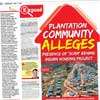 ]]>
]]>
 I want to respond to the report published in the Daily Mirror raising concerns about the fairness and transparency of the Indian Housing Project for the plantation community.
I want to respond to the report published in the Daily Mirror raising concerns about the fairness and transparency of the Indian Housing Project for the plantation community.
This report makes a serious allegation that the Indian Government’s decision to select the National Housing Development Authority and the State Engineering Corporation as the implementing partner as a scam. This allegation questions the integrity of the processes adopted and decisions taken by the Indian Government and risks the strong bilateral relationship between our two countries.
The Indian High Commission has clarified in the article itself that the India funded housing project is being executed in phases with a transparent tender process led by India for selecting implementation agencies.
For the latest phase, both the NHDA and SEC were selected by the Indian Government based on criteria established by India itself. In this case, the Government of India has taken the decision that local housing building agencies are better suited to implement projects of this nature than private foreign NGOs. This should be a welcome decision and must be respected. The Government of India is free to select the implementation agency for a project funded through the generosity of the people of India. The Government of India would have no intention of scamming the people of Sri Lanka, particularly the marginalised plantation community from this selection.
The contractors for the various housing schemes are selected by the NHDA with the participation of the Government of India.
In the article, the NHDA’s Senior Manager Development, Mr. Hemantha Tennakoon, has himself refuted allegations of any favouritism. As outlined by him, the selection process for contractors is yet to commence and are required to follow guidelines and criteria agreed to by the Government of India.
The same requirement applies to the selection of beneficiaries for the houses. A criteria for selection of beneficiaries has been established together with the Government of India. As iterated by the NHDA in the article itself, it is the responsibility of the management of every estate together with the NHDA to ensure that all housing beneficiaries meet the established criteria. This list will be further cross checked by the Government of India.
Publishing allegations that my political party, the CWC, is selecting undeserving beneficiaries without appropriate fact and sense checking is hugely damaging to the reputation of the Indian Government.
The procedural details outlined above affirm that the governance and oversight mechanisms have been set up to ensure the successful completion of this project in a transparent manner. The portrayal of these administrative processes as compromised in the media is not only a misrepresentation of the efforts being undertaken by all parties involved, but is accusatory towards the Government of India, risking our bilateral relationship and India’s generosity to the marginalised plantation communities.
The article also highlighted the misappropriation of funds by an estate management official in the Elkaduwa estate. This misappropriation had occurred during Phase III of the Indian Housing Project. These pre-existing issues, including those connected to the previous NGOs implementing Phase III, were highlighted by the Indian High Commission to me shortly after I assumed office in January 2023. The letters mentioned by the article itself on the investigation of the misappropriation date back to April and August of last year and not this year (when the new Phase IV began).
Questions regarding past misappropriations under Phase III of the housing scheme should have rightly been directed by the journalist at the Ministers, MPs and officials in charge at that time. Unfortunately the journalist concerned has failed to direct those questions to the relevant MPs, despite having interviewed some of them for this article. Instead, the author attempts to wrongfully mislead readers by suggesting that this misappropriation is linked to the present phase of the housing scheme - which it wasn’t.
It is important to note that the current phase, Phase IV, of building 10,000 new homes commenced only in February this year under my direction. As no funds have been misappropriated under the current phase, allegations suggesting otherwise are misleading and not rooted in the present administration’s actions.
I sincerely hope that the reputational damage caused to the Government of India by such an irresponsible and poorly written article does not discourage the generosity extended by the Government of India to the plantation community.
Despite the demoralising nature of these allegations, I remain committed in our mission to ensure that every aspect of this project is conducted with the utmost integrity, serving all members of the plantation community equitably and fairly.
Reporter’s Note
Following the Daily Mirror expose titled ‘Plantation Community Alleges Presence of Scam Behind Indian Housing Project’, the Ministry of Water Supply and Estate Infrastructure Development, in their clarification state that the article has caused damage to the reputation of the Government of India (GoI). The Ministry has further stated that the Indian Government has no intention of scamming the people of Sri Lanka marginalizing the plantation community.
Although the Ministry claims that this article has caused damage to the GoI, it has failed to directly address the allegations on why the Estate Superintendents have failed to follow the instructions given by the GoI when selecting the beneficiaries. It is alleged that the representatives of the CWC trade union have demanded the Estate officials to put their members’ names to the list of beneficiaries. Hence the Ministry should know that it is these allegations which were raised with the newspaper by multiple sources that has caused damages to the Indian Government but not this newspaper.
It is also surprising why Minister Jeevan Thondaman failed to reply to any calls or messages directed to him, seeking a comment and his side of the story before the article went to print.
I stand by my reporting.
 ]]>
]]>
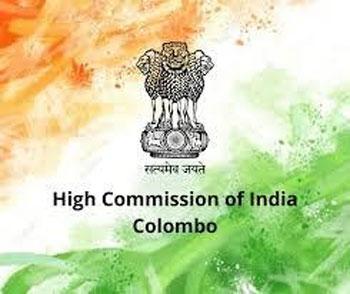 I write in response to the ‘Expose’ titled ‘Plantation community alleges presence of scam behind Indian Housing Project’ in Daily Mirror edition on 17 April 2024.
I write in response to the ‘Expose’ titled ‘Plantation community alleges presence of scam behind Indian Housing Project’ in Daily Mirror edition on 17 April 2024.
At the outset, we would like to mention that certain points mentioned in the Article are outdated and do not reflect the factual position with respect to the current status of Phase-IV of the Indian Housing Project. Further, a specific instance which refers to the Indian Housing Project in Elkaduwa estate pertains to Phase-III of the Project, under which 4000 houses are being constructed in plantation regions of Sri Lanka.
In the above backdrop, the following specific points may be noted:
i) Selection process of Implementing Agencies - High Commission of India engaged four Implementing Agencies through a selection process in the second and third phases of Indian Housing Project. This included NHDA as well.
As regards Implementing Agencies for the fourth Phase, the High Commission of India followed a very transparent selection process – the details of which are available in newspapers and other open sources. An Expression of Interest was floated and several interested parties including those who were associated with the third and fourth phases responded to the same (Relevant newspaper notice is attached). Thereafter, the selection process involved both technical and financial evaluation of the bids submitted by interested parties. These bids were opened in front of all the parties and evaluation results were duly publicized. The technical evaluation results clearly detail the scores which each of the entities obtained along different evaluation parameters.
The relevant link is placed herewith -
Following the publication of results and decision to award work to NHDA and SEC, the parties were given the chance to seek clarifications, if any and no such clarifications were received. Therefore, the process of awarding work to NHDA and SEC was done in a manner that was to the satisfaction of all concerned.
ii) Contractors/Suppliers associated with Phase-IV – Both NHDA and SEC published notices for selecting contractors/suppliers to be associated with Phase-IV of Indian Housing Project. The relevant link on NHDA website is as below https://www.nhda.gov.lk/latest-news/91 The said notice details out the evaluation parameters in depth. Selection of such contractors/suppliers shall be carried out strictly on the basis of documents submitted by the participating entities. The said process will involve the High Commission of India as well.
iii) Current status – As is true with all development projects implemented by Government of India in Sri Lanka, needs of the people and priorities of the Government of Sri Lanka are at its very heart. Driven by this philosophy, certain aspects of a project like beneficiaries, site selection etc are decided by the Sri Lankan authorities. In case of Phase-IV of Indian Housing Project, both Governments have mutually agreed on eligibility criteria for beneficiaries. As on date, High Commission of India has not received the list of beneficiaries from Sri Lankan authorities. Further, High Commission of India is aided by the Implementing Agencies to ensure that the list of beneficiaries meet the prescribed eligibility conditions.
In closing, I would like to mention that India’s overall development portfolio in Sri Lanka stands at close to USD 5 billion with USD 600 million being in grants alone. Projects under the bilateral development cooperation partnership are people-centric in nature and India has touched upon all aspects of daily lives such as education, health, livelihood development, housing, among others. Transparency is a central principle which we strictly adhere to in the execution of projects in Sri Lanka.
‘Exposes’ with sensational and misleading titles does not reflect the spirit of India’s multi-dimensional engagement with Sri Lanka, while also creating a biased impression about India and the projects executed by us for the people of Sri Lanka. You are, therefore, requested to kindly capture the specific points outlined in this letter and carry a clarifications/ rejoinder in the next daily edition of Daily Mirror so as to suitably inform its readers of the actual state of play with respect to Phase IV of Indian Housing Project.
Reporter’s Note -
The Daily Mirror wishes to state that the newspaper at any point did not accuse or level allegations against the Indian Government or the Indian High Commission in Sri Lanka for their involvement in any scams in the Indian Grant housing project for the plantation community, but only highlighted how a powerful trade union is attempting to get the Estate Superintendents to include names of their trade union members as beneficiaries.
Although the High Commission in its statement claims that the Daily Mirror has given a ‘sensational and misleading title’ to the article, the Daily Mirror wishes to state that this newspaper at any instance did not mislead our valued readers by giving wrong information but highlighted the factual details.
 ]]>
]]>
 I write in response to the ‘Expose’ titled ‘Plantation community alleges presence of scam behind Indian Housing Project’ in Daily Mirror edition on 17 April 2024.
I write in response to the ‘Expose’ titled ‘Plantation community alleges presence of scam behind Indian Housing Project’ in Daily Mirror edition on 17 April 2024.
At the outset, we would like to mention that certain points mentioned in the Article are outdated and do not reflect the factual position with respect to the current status of Phase-IV of the Indian Housing Project. Further, a specific instance which refers to the Indian Housing Project in Elkaduwa estate pertains to Phase-III of the Project, under which 4000 houses are being constructed in plantation regions of Sri Lanka.
In the above backdrop, the following specific points may be noted:
i) Selection process of Implementing Agencies - High Commission of India engaged four Implementing Agencies through a selection process in the second and third phases of Indian Housing Project. This included NHDA as well.
As regards Implementing Agencies for the fourth Phase, the High Commission of India followed a very transparent selection process – the details of which are available in newspapers and other open sources. An Expression of Interest was floated and several interested parties including those who were associated with the third and fourth phases responded to the same (Relevant newspaper notice is attached). Thereafter, the selection process involved both technical and financial evaluation of the bids submitted by interested parties. These bids were opened in front of all the parties and evaluation results were duly publicized. The technical evaluation results clearly detail the scores which each of the entities obtained along different evaluation parameters.
The relevant link is placed herewith -
Following the publication of results and decision to award work to NHDA and SEC, the parties were given the chance to seek clarifications, if any and no such clarifications were received. Therefore, the process of awarding work to NHDA and SEC was done in a manner that was to the satisfaction of all concerned.
ii) Contractors/Suppliers associated with Phase-IV – Both NHDA and SEC published notices for selecting contractors/suppliers to be associated with Phase-IV of Indian Housing Project. The relevant link on NHDA website is as below https://www.nhda.gov.lk/latest-news/91 The said notice details out the evaluation parameters in depth. Selection of such contractors/suppliers shall be carried out strictly on the basis of documents submitted by the participating entities. The said process will involve the High Commission of India as well.
iii) Current status – As is true with all development projects implemented by Government of India in Sri Lanka, needs of the people and priorities of the Government of Sri Lanka are at its very heart. Driven by this philosophy, certain aspects of a project like beneficiaries, site selection etc are decided by the Sri Lankan authorities. In case of Phase-IV of Indian Housing Project, both Governments have mutually agreed on eligibility criteria for beneficiaries. As on date, High Commission of India has not received the list of beneficiaries from Sri Lankan authorities. Further, High Commission of India is aided by the Implementing Agencies to ensure that the list of beneficiaries meet the prescribed eligibility conditions.
In closing, I would like to mention that India’s overall development portfolio in Sri Lanka stands at close to USD 5 billion with USD 600 million being in grants alone. Projects under the bilateral development cooperation partnership are people-centric in nature and India has touched upon all aspects of daily lives such as education, health, livelihood development, housing, among others. Transparency is a central principle which we strictly adhere to in the execution of projects in Sri Lanka.
‘Exposes’ with sensational and misleading titles does not reflect the spirit of India’s multi-dimensional engagement with Sri Lanka, while also creating a biased impression about India and the projects executed by us for the people of Sri Lanka. You are, therefore, requested to kindly capture the specific points outlined in this letter and carry a clarifications/ rejoinder in the next daily edition of Daily Mirror so as to suitably inform its readers of the actual state of play with respect to Phase IV of Indian Housing Project.
Reporter’s Note -
The Daily Mirror wishes to state that the newspaper at any point did not accuse or level allegations against the Indian Government or the Indian High Commission in Sri Lanka for their involvement in any scams in the Indian Grant housing project for the plantation community, but only highlighted how a powerful trade union is attempting to get the Estate Superintendents to include names of their trade union members as beneficiaries.
Although the High Commission in its statement claims that the Daily Mirror has given a ‘sensational and misleading title’ to the article, the Daily Mirror wishes to state that this newspaper at any instance did not mislead our valued readers by giving wrong information but highlighted the factual details.
 ]]>
]]>
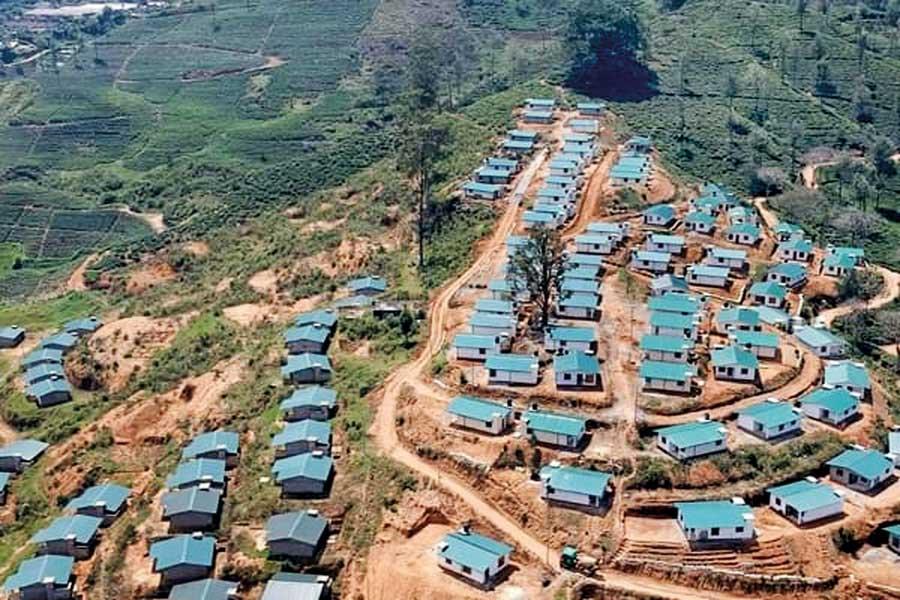
Houses built in the estate sector with the Indian grants received during the Yahapalana regime
Although plantation sector workers accuse that credible implementation agencies weren’t appointed by the High Commission of India, to oversee the work of the proposed plantation housing project- which is a grant from the Government of India-sources from the Government of Sri Lanka, who are working hand in glove with the Indian High Commission, claim that they have appointed implementation agencies in a transparent manner.
proposed plantation housing project- which is a grant from the Government of India-sources from the Government of Sri Lanka, who are working hand in glove with the Indian High Commission, claim that they have appointed implementation agencies in a transparent manner.
However, reliable estate sources speaking on conditions of anonymity told this newspaper how members of Ceylon Workers Congress (CWC) are forcing the Estate Superintendents to select their members as beneficiaries of these Indian grant houses.
“Those who have left the estates, those who already have houses and reside in the estates, but work for other private entities are not eligible for these houses. But we have come under tremendous pressure from the CWC to give houses to individuals falling into these categories; which is not the requirement of the Indian Government. What we were told by the Indian High Commission offices is to select the most suitable beneficiaries, but not to do it based on affiliation to any trade union,” sources said.
According to plantation sector trade unions credible neutral implementation agencies usually tasked with overseeing the implementing of the Indian Housing Scheme have been removed
Credible neutral implementation agencies removed
 On earlier occasions- where Indian granted housing projects were implemented in Sri Lanka- the projects were carried out under the credible neutral implementation agencies of -the International Federation of Red Cross and Red Crescent Societies (IFRC) in partnership with Sri Lanka Red Cross (SLRCS) and United Nations Human Settlements Programme (UN-Habitat). However, according to certain plantation sector trade unions, this time around, these credible neutral implementation agencies have been removed without any reason. This role has been given over to the National Housing Development Authority (NHDA) and the State Engineering Corporation (SEC).
On earlier occasions- where Indian granted housing projects were implemented in Sri Lanka- the projects were carried out under the credible neutral implementation agencies of -the International Federation of Red Cross and Red Crescent Societies (IFRC) in partnership with Sri Lanka Red Cross (SLRCS) and United Nations Human Settlements Programme (UN-Habitat). However, according to certain plantation sector trade unions, this time around, these credible neutral implementation agencies have been removed without any reason. This role has been given over to the National Housing Development Authority (NHDA) and the State Engineering Corporation (SEC).
Representatives of plantation community alleges of a scam behind this move.
“The Government of India (GoI) is so generous and has kept the promise given by the Indian Prime Minister Modi in 2017 when he visited Sri Lanka. But the way the implementation agencies are appointed- which task is alleged to be done by a powerful plantation trade union affiliated to the government-is disturbing our workers. The manner in which the NHDA is going to offer the particular contracts is also dubious. We have received credible information that on the instruction of this trade union the implementation agencies have selected contractors although the selection criterion has to be carried out through the Estate Workers Corporative Housing Society,” sources alleged.
According to these sources, although the beneficiaries of these houses should be selected regardless of the trade unions they are affiliated to, almost all those who are members of this powerful Minister’s trade union are to be benefitted.
We are yet to obtain the details of how many houses will be given to each estate. We have already paid money to the National Building Research Organization (NBRO) to select areas in estates free of landslides”
- Roshan Rajadurai Spokesperson Plantation Association of Ceylon
“The Estate Superintendents have been directed to provide the names of these trade union members in the beneficiary list. This cannot be allowed. We are planning to bring this scandal to the notice of Indian High Commission officials and hope to get them to intervene in the matter,” sources said.
It is learned that although this fourth phase of the Indian aided project comprises 1, 300 houses, the plantation housing project was inaugurated at the Presidential Secretariat in February. As a result, foundation stones were laid simultaneously for these housing projects and the inauguration ceremony was showed on giant screen. However, the plots of lands for these houses are yet to be identified.
When contacted Plantation Association of Ceylon Spokesperson Roshan Rajadurai to find out whether the lands have been allocated for these 1, 300 housing units, he said that the actual allocation of all lands are yet to be finalised.
“Respective plantation companies are willing to allocate the necessary lands for this project. Although the actual allocation of lands is yet to be finalised, the foundation laying ceremony for the donor funded housing sceme was ceremonially carried out recently at the Presidential Secretariat. This event attracted the participation of President Ranil Wickremesinghe, Indian HC Santosh Jha, Estate Infrastructure and Water Supply Minister Jeevan Thondaman and Governor Eastern Province Senthil Thondaman. We are yet to obtain the details of how many houses will be given to each estate. We have already paid money to the National Building Research Organization (NBRO) to select areas in estates free of landslides,” Rajadurai added.
The manner in which the NHDA is going to offer the particular contracts is also dubious
Complaints received
Meanwhile Ceylon National Estate Workers Union Leader Suresh Vadivel MP said that he received some complaints regarding the selection of beneficiaries, but added that he was able to sort it out with the Plantation Managers.
“Those who have houses have been named as beneficiaries. The houses built with an Indian grant should be given only to the vulnerable, but not based on trade union affiliations. As a Senior Trade Union Leader and an MP, I am grateful to India for giving an opportunity for our workers to obtain a house of their own which is a dream in a lifetime,” Vadivel said.
Meanwhile, sources at the Indian High Commission-who did not wish to be named- said that the Indian Housing Project (IHP) for plantation workers is being executed in several phases.
According to these sources, during the second and third phases of the IHP the implementation agencies- including the National Housing Development Authority (NHDA)- were engaged by the Indian High Commission through a selection process.
“Those who have houses have been named as beneficiaries. The houses built with an Indian grant should be given only to the vulnerable, but not based on trade union affiliations. As a Senior Trade Union Leader and an MP, I am grateful to India for giving an opportunity for our workers to obtain a house of their own which is a dream in a lifetime”
- Suresh Vadivel
MP and Ceylon National Estate Workers Union Leader
“Likewise, for the fourth phase too, we initiated a tender process to select Implementing Agencies. Various entities including those associated with earlier phases submitted responses. The selection process involved transparent evaluation criteria outlined in the tender document. As a result NHDA and SEC were chosen as implementation agencies for the fourth phase of the project, under which 10,000 houses are being built in plantation regions of Sri Lanka. As part of the process all participating entities were given the opportunity to seek clarification regarding the tendering process, but no such clarifications were sought,” sources said.
According to him, several stakeholders are involved in the construction process such as the Indian HC, Ministry of Estate Infrastructure, beneficiaries through estate corporative societies and implementation agencies amongst others.
“While these stake holders work very closely in collaboration, each of them have been assigned specific responsibilities. Thousand three hundred houses are being constructed under the first stage of the fourth phase of the project. A community driven approach is being adopted for the construction. The implementation agencies facilitate this process through suppliers and contractors to help these communities. In the current phase no supplier or contractor has been officially engaged for the project till date. The Indian HC is firmly committed to transparency in all processes of the project as also other projects executed by the GoI in Sri Lanka,” sources said.
Each house has to be 550 sq.ft and the land allocation will be 10 perches per unit
Senior Manager Development NHDA Hemantha Tennakoon refuting the allegations said that they obtained the contract fulfilling Indian HC’s requirement and added that they have already identified lands in seven districts for this project.
“We are yet to select the contractors. We will send the criteria for the selection process to the Estate Workers Corporative Housing Society. The contractors should fulfill our requirements. Those who obtain the highest marks will be offered the contract. They have to be registered with the Construction Industry Development Authority (CIDA), should have obtained better grading from them, have to have registered with the Divisional Secretariat, the annual turnover should be more than Rs.20 million, should have necessary machinery capacity and the required experience in housing projects. Those who are from the same district- where the housing project is to be implemented- will get priority at the selection process,” Tennakoon said.
According to Tennakoon, the Indian HC has given them an operational manual and based on it they have sent their bids.
We will send the criteria for the selection process to theEstate Workers Corporative Housing Society. The contractors should fulfill our requirements. Those who obtain the highest marks will be offered the contract. They have to be registered with the Construction Industry Development Authority”
- Hemantha Tennakoon
Senior Manager Development NHDA
“We were the lowest bidder and for each house our price was Rs.2.8 million. All the others bidders have quoted higher rates for each unit. SEC was the second lowest bidder and they too were offered the award. As we have the necessary qualified staff under one roof we were able to quote a lower price. When calling for applications to select the contractor we will give seven days notice. Each house has to be 550 sq.ft. and the land allocation will be 10 perches. The beneficiaries are selected by the Estate Manager.
When asked what the procedure the Estate Superintendent will follow in the selection of beneficiaries, Tennakoon said that no politics will be involved in the selection process. He refuted the allegations that the recipients of these housing units would be selected by a list given by a powerful Minister.
“The Estate Managers are not involved in politics. Even if they receive any instructions from any higher official, they will not abide by such orders. It is these Managers who know very well who the most vulnerable families are that deserves houses,” he said.
Tennakoon further said that out of the 22 locations, five sites from Badulla, eighteen in Nuwara Eliya, two at Galle and one site each at Ratnapura, Colombo (Avissawella), Monaragala and Kalutrara districts to build these housing units have been earmarked.
Almost all those who are members of a powerful Minister’s trade union are to be benefitted when houses are allocated
Money misappropriated?
Although Indian High Commission sources and the NHDA maintained that the project is being carried out in a transparent manner, the Daily Mirror reliably understands that money given for this housing project has been misappropriated by a higher official at the Elkaduwa Estate, Matale.
Mukesh Kumar, Attaches (AAO-IHP), High Commission of India has written to the General Manager Elkaduwa Plantations Ltd, requesting to hold an impartial inquiry on misappropriation of funds in Estate Worker Housing Cooperative Societies (EWHCS) bank account of Indian Housing Project in Elkaduwa Estate.
Mukesh Kumar’s letter further states, ‘As you are aware that two officials from the Indian HC Colombo visited Elkaduwa Estate Matale in district during April 18-19, 2023, to inspect the status of the houses being constructed there with the Indian grant.
‘During the visit, the team had to check the bank statement of EWHCS, but it was not completed as the concerned person handling the record was on training as intimated by your office.
‘In this regard, it is requested to provide us the copies of duly updated
EWHCS bank account statement maintained by the Elkaduwa Estate office which is directly under your supervision. This will enable us to reconcile records at this end and initiate next course of action to complete the pending houses there’.
Following this, by letter dated June 7, 2023, to Chairman Elkaduwa
Plantations, Additional Secretary (Tea Development), Ministry of
Plantation Industries, A. U. K. Dodanwala has requested to take necessary action in this regard. The letter states further, ‘This has reference to the e-mail dated May 4, 2023 and May 22, 2023, by Mukesh Kumar, addressing Deputy General Manager Elkaduwa Plantations with a copy to the Ministry of Plantation Industries.
As many as 10,000 units are being built in plantation regions of Sri Lanka in the fourth phase of the Indian funded housing project
‘Hence you are kindly requested to take necessary actions in this regard and inform to the Ministry regarding the actions taken. ‘Your kind corporation in this regard will be highly appreciated’. Later on August 31, 2023, Senior Superintendent/ President EWHCS, Elkaduwa Estate by letter has informed Secretary, Plantation Industry Ministry that Board of Directors of Elkaduwa Plantation Ltd, had decided to carry out an impartial inquiry and a preliminary investigation had been concluded.
It further states, ‘On the advice of the Board, copies of reports were sent to the Ministry and to the Indian HC for further action. ‘No sooner this complaint was received, the management took a decision and transferred the Elkaduwa Estate Senior Superintendent who was there as the President of the EWHCS to Nalanda Estate with immediate effect.
‘Further as the present President EWHCS, I ensure that the funds received from the Indian Government would only be utilized for the purpose of 25 housing units in the estate. I have also written to the Co-operative Commissioner, Matale to conduct a comprehensive audit to separate the funds received for this housing project. In future, I assure that the rules and regulations as per the tri-party agreement will be enforced’. When this newspaper contacted the present Senior Superintendent, Elkaduwa Estate, Radley Dissage, he said that the Management has now suspended the service of the accused officer until the investigation concludes. “The money given for the housing project was deposited to the EWHCS account. The said that the officer had withdrawn the accumulated interest, but he claimed that the money was spent to renovate old houses in the estate. Mr. Mukesh has asked this officer to produce the bank account book, but it was not given to him. Soon after the complaint he was transferred to another estate, but later his service was suspended until the investigation concludes,” Dissage said.
All attempts made to contact Additional Secretary (Tea Development), Ministry of Plantation Industries to find out the outcome of the investigation, failed.
Dr. Gamini Jayatissa, Landslide Research Risk Management Division of the NBRO said that they have identified 40 sites for resettlement in estates in five districts.
“We have identified 40 sites for resettlement. Two are from Kalutara, two in Matara, twenty four in Neliya, five in Galle and seven in Badulla districts are suitable for these houses.
Indian High Commission sources maintain that the Indian Government funded Housing Project for plantation workers is being executed in several phases
“Our only anticipation is that the grant by GoI should reach target group”- TPA Leader MP Ganesan
Meanwhile Tamil Progressive Alliance (TPA) Leader Mano Ganesan MP said that the most marginalised planation people should receive these Indian grant houses without any political interference.
“India has been very graciously building houses in northern, eastern, southern provinces and in the plantations too in support of all the people of Sri Lanka. This is an outcome of the understanding and agreement between the governments of Sri Lanka and India. The current Phase Four of the Indian housing project becoming a talking point is an unfortunate development. Anyway, I recognise the right of the media to pose questions, seek responses and obtain clarifications from all the stake holders. TPA, is the party that has obtained the largest number of votes from the hill country Tamil community, within which, the plantation segment exist. Our only anticipation is that the gracious grant by the Government of India- meant for the most marginalised planation people- should reach the target group,” he said.
According to him, although there were numerous NGOs, IFRC and SLRCS, UN-Habitat functioned as implementing agencies in the earlier phases, but those agencies are not involved in phase four.
“We have been informed by the Indian High Commission that these agencies did not qualify to meet the criteria for tenders before the nomination of agencies was made for this phase. We are told that they have nominated two state entities: NHDA and SEC as the implementing agencies. It is a grant from the GoI. Hence, it is their decision to select the implementation agencies and whether we like it or not we have to accept it. We have only requested the donors to be more vigilant and cautious and appealed for more transparency in good faith,” he said.
The current Phase Four of the Indian housing project becoming a talking point is an unfortunate development. TPA, is the party that has obtained the largest number of votes from the hill country Tamil community. Our anticipation is that the grant by the Government of India should reach the target group”
- Mano Ganesan
MP and Tamil Progressive
Alliance Leader
Ganesan further said that the TPA was part of the Yahapalanaya Government from 2015-2019. And 4,000 houses under Phase III of the Indian project had been built then.
“The project was overseen by the Hill Country New Villages Estate Infrastructure Minister Palani Thigambaram, who is the TPA Deputy Leader. We performed with maximum transparency. The ministry was only the coordinating agency and the rest was taken care of by the implementing agencies. We have a very proud and honest history in this regard. Current President Ranil Wickremesinghe was our prime minister then. But this time, certain plantation based politicians and their associates have started visiting estates, calling themselves contractors and builders. This has created a semi-chaos and confused situation for the plantation workers. We rightly brought this to the notice of the Indian HC in good faith. Today, we note that the HC has intervened in this process. Hence, we are thankful to the Indian HC. We are informed that no contracts have been awarded yet. Public tenders will be called for the contractors and subsequently contracts will be awarded by the implementing agencies soon. We urge that all the lawful tender procedures shall be strictly followed,” the MP said.
According to him, the estate housing cooperative societies play vital roles in this project. “But the plantation workers who are members of these societies play a secondary role there. Those who wanted to ensure justice to the poor workers shall take this fact to their notice. TPA will monitor and reveal any bad practices or connections existing between forces. Those who indulge in bad practices may envy us. As the largest party of the hill country Tamil community, we have a legitimate duty by our people. Nobody needs to question our right to intervene which we will do right throughout,” he said.
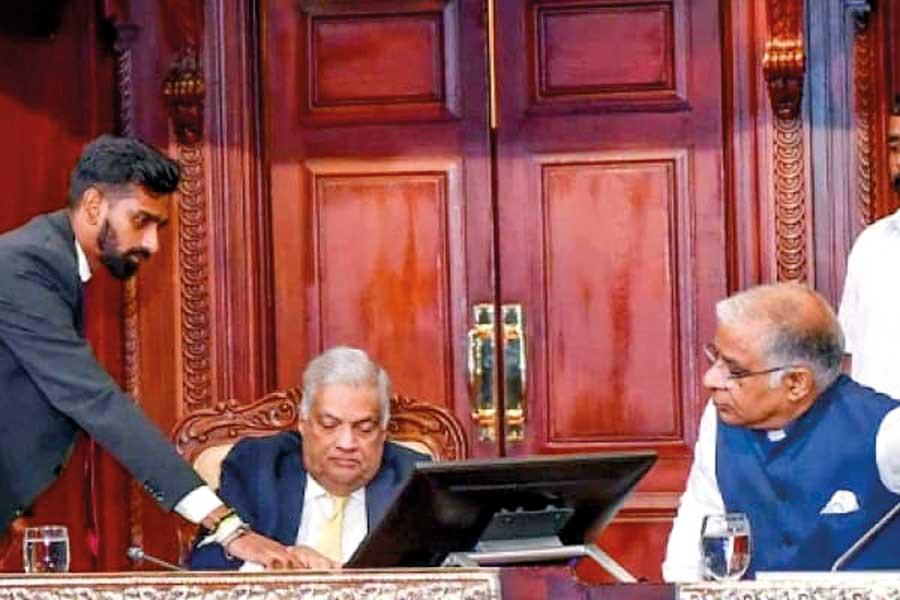
The picture shows the occasion when phase four of the Indian Housing Project was announced in the presence of Sri Lanka President Ranil Wickremesinghe (Centre) flanked by Estate Infrastructure and Water Supply Minister Jeewan Thondaman (left) and Indian High Commissioner Santosh Jha (Right)
‘Jeevan fails to respond to Daily Mirror’
All attempts to contact Estate Infrastructure and Water Supply Minister Jeewan Thondaman for a comment regarding this issue went unanswered. Although a text message via mobile phone was sent seeking a comment, the Minister did not respond until the paper went for publication.
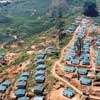 ]]>
]]>
Houses built in the estate sector with the Indian grants received during the Yahapalana regime
Although plantation sector workers accuse that credible implementation agencies weren’t appointed by the High Commission of India, to oversee the work of the proposed plantation housing project- which is a grant from the Government of India-sources from the Government of Sri Lanka, who are working hand in glove with the Indian High Commission, claim that they have appointed implementation agencies in a transparent manner.
proposed plantation housing project- which is a grant from the Government of India-sources from the Government of Sri Lanka, who are working hand in glove with the Indian High Commission, claim that they have appointed implementation agencies in a transparent manner.
However, reliable estate sources speaking on conditions of anonymity told this newspaper how members of Ceylon Workers Congress (CWC) are forcing the Estate Superintendents to select their members as beneficiaries of these Indian grant houses.
“Those who have left the estates, those who already have houses and reside in the estates, but work for other private entities are not eligible for these houses. But we have come under tremendous pressure from the CWC to give houses to individuals falling into these categories; which is not the requirement of the Indian Government. What we were told by the Indian High Commission offices is to select the most suitable beneficiaries, but not to do it based on affiliation to any trade union,” sources said.
According to plantation sector trade unions credible neutral implementation agencies usually tasked with overseeing the implementing of the Indian Housing Scheme have been removed
Credible neutral implementation agencies removed
 On earlier occasions- where Indian granted housing projects were implemented in Sri Lanka- the projects were carried out under the credible neutral implementation agencies of -the International Federation of Red Cross and Red Crescent Societies (IFRC) in partnership with Sri Lanka Red Cross (SLRCS) and United Nations Human Settlements Programme (UN-Habitat). However, according to certain plantation sector trade unions, this time around, these credible neutral implementation agencies have been removed without any reason. This role has been given over to the National Housing Development Authority (NHDA) and the State Engineering Corporation (SEC).
On earlier occasions- where Indian granted housing projects were implemented in Sri Lanka- the projects were carried out under the credible neutral implementation agencies of -the International Federation of Red Cross and Red Crescent Societies (IFRC) in partnership with Sri Lanka Red Cross (SLRCS) and United Nations Human Settlements Programme (UN-Habitat). However, according to certain plantation sector trade unions, this time around, these credible neutral implementation agencies have been removed without any reason. This role has been given over to the National Housing Development Authority (NHDA) and the State Engineering Corporation (SEC).
Representatives of plantation community alleges of a scam behind this move.
“The Government of India (GoI) is so generous and has kept the promise given by the Indian Prime Minister Modi in 2017 when he visited Sri Lanka. But the way the implementation agencies are appointed- which task is alleged to be done by a powerful plantation trade union affiliated to the government-is disturbing our workers. The manner in which the NHDA is going to offer the particular contracts is also dubious. We have received credible information that on the instruction of this trade union the implementation agencies have selected contractors although the selection criterion has to be carried out through the Estate Workers Corporative Housing Society,” sources alleged.
According to these sources, although the beneficiaries of these houses should be selected regardless of the trade unions they are affiliated to, almost all those who are members of this powerful Minister’s trade union are to be benefitted.
We are yet to obtain the details of how many houses will be given to each estate. We have already paid money to the National Building Research Organization (NBRO) to select areas in estates free of landslides”
- Roshan Rajadurai Spokesperson Plantation Association of Ceylon
“The Estate Superintendents have been directed to provide the names of these trade union members in the beneficiary list. This cannot be allowed. We are planning to bring this scandal to the notice of Indian High Commission officials and hope to get them to intervene in the matter,” sources said.
It is learned that although this fourth phase of the Indian aided project comprises 1, 300 houses, the plantation housing project was inaugurated at the Presidential Secretariat in February. As a result, foundation stones were laid simultaneously for these housing projects and the inauguration ceremony was showed on giant screen. However, the plots of lands for these houses are yet to be identified.
When contacted Plantation Association of Ceylon Spokesperson Roshan Rajadurai to find out whether the lands have been allocated for these 1, 300 housing units, he said that the actual allocation of all lands are yet to be finalised.
“Respective plantation companies are willing to allocate the necessary lands for this project. Although the actual allocation of lands is yet to be finalised, the foundation laying ceremony for the donor funded housing sceme was ceremonially carried out recently at the Presidential Secretariat. This event attracted the participation of President Ranil Wickremesinghe, Indian HC Santosh Jha, Estate Infrastructure and Water Supply Minister Jeevan Thondaman and Governor Eastern Province Senthil Thondaman. We are yet to obtain the details of how many houses will be given to each estate. We have already paid money to the National Building Research Organization (NBRO) to select areas in estates free of landslides,” Rajadurai added.
The manner in which the NHDA is going to offer the particular contracts is also dubious
Complaints received
Meanwhile Ceylon National Estate Workers Union Leader Suresh Vadivel MP said that he received some complaints regarding the selection of beneficiaries, but added that he was able to sort it out with the Plantation Managers.
“Those who have houses have been named as beneficiaries. The houses built with an Indian grant should be given only to the vulnerable, but not based on trade union affiliations. As a Senior Trade Union Leader and an MP, I am grateful to India for giving an opportunity for our workers to obtain a house of their own which is a dream in a lifetime,” Vadivel said.
Meanwhile, sources at the Indian High Commission-who did not wish to be named- said that the Indian Housing Project (IHP) for plantation workers is being executed in several phases.
According to these sources, during the second and third phases of the IHP the implementation agencies- including the National Housing Development Authority (NHDA)- were engaged by the Indian High Commission through a selection process.
“Those who have houses have been named as beneficiaries. The houses built with an Indian grant should be given only to the vulnerable, but not based on trade union affiliations. As a Senior Trade Union Leader and an MP, I am grateful to India for giving an opportunity for our workers to obtain a house of their own which is a dream in a lifetime”
- Suresh Vadivel
MP and Ceylon National Estate Workers Union Leader
“Likewise, for the fourth phase too, we initiated a tender process to select Implementing Agencies. Various entities including those associated with earlier phases submitted responses. The selection process involved transparent evaluation criteria outlined in the tender document. As a result NHDA and SEC were chosen as implementation agencies for the fourth phase of the project, under which 10,000 houses are being built in plantation regions of Sri Lanka. As part of the process all participating entities were given the opportunity to seek clarification regarding the tendering process, but no such clarifications were sought,” sources said.
According to him, several stakeholders are involved in the construction process such as the Indian HC, Ministry of Estate Infrastructure, beneficiaries through estate corporative societies and implementation agencies amongst others.
“While these stake holders work very closely in collaboration, each of them have been assigned specific responsibilities. Thousand three hundred houses are being constructed under the first stage of the fourth phase of the project. A community driven approach is being adopted for the construction. The implementation agencies facilitate this process through suppliers and contractors to help these communities. In the current phase no supplier or contractor has been officially engaged for the project till date. The Indian HC is firmly committed to transparency in all processes of the project as also other projects executed by the GoI in Sri Lanka,” sources said.
Each house has to be 550 sq.ft and the land allocation will be 10 perches per unit
Senior Manager Development NHDA Hemantha Tennakoon refuting the allegations said that they obtained the contract fulfilling Indian HC’s requirement and added that they have already identified lands in seven districts for this project.
“We are yet to select the contractors. We will send the criteria for the selection process to the Estate Workers Corporative Housing Society. The contractors should fulfill our requirements. Those who obtain the highest marks will be offered the contract. They have to be registered with the Construction Industry Development Authority (CIDA), should have obtained better grading from them, have to have registered with the Divisional Secretariat, the annual turnover should be more than Rs.20 million, should have necessary machinery capacity and the required experience in housing projects. Those who are from the same district- where the housing project is to be implemented- will get priority at the selection process,” Tennakoon said.
According to Tennakoon, the Indian HC has given them an operational manual and based on it they have sent their bids.
We will send the criteria for the selection process to theEstate Workers Corporative Housing Society. The contractors should fulfill our requirements. Those who obtain the highest marks will be offered the contract. They have to be registered with the Construction Industry Development Authority”
- Hemantha Tennakoon
Senior Manager Development NHDA
“We were the lowest bidder and for each house our price was Rs.2.8 million. All the others bidders have quoted higher rates for each unit. SEC was the second lowest bidder and they too were offered the award. As we have the necessary qualified staff under one roof we were able to quote a lower price. When calling for applications to select the contractor we will give seven days notice. Each house has to be 550 sq.ft. and the land allocation will be 10 perches. The beneficiaries are selected by the Estate Manager.
When asked what the procedure the Estate Superintendent will follow in the selection of beneficiaries, Tennakoon said that no politics will be involved in the selection process. He refuted the allegations that the recipients of these housing units would be selected by a list given by a powerful Minister.
“The Estate Managers are not involved in politics. Even if they receive any instructions from any higher official, they will not abide by such orders. It is these Managers who know very well who the most vulnerable families are that deserves houses,” he said.
Tennakoon further said that out of the 22 locations, five sites from Badulla, eighteen in Nuwara Eliya, two at Galle and one site each at Ratnapura, Colombo (Avissawella), Monaragala and Kalutrara districts to build these housing units have been earmarked.
Almost all those who are members of a powerful Minister’s trade union are to be benefitted when houses are allocated
Money misappropriated?
Although Indian High Commission sources and the NHDA maintained that the project is being carried out in a transparent manner, the Daily Mirror reliably understands that money given for this housing project has been misappropriated by a higher official at the Elkaduwa Estate, Matale.
Mukesh Kumar, Attaches (AAO-IHP), High Commission of India has written to the General Manager Elkaduwa Plantations Ltd, requesting to hold an impartial inquiry on misappropriation of funds in Estate Worker Housing Cooperative Societies (EWHCS) bank account of Indian Housing Project in Elkaduwa Estate.
Mukesh Kumar’s letter further states, ‘As you are aware that two officials from the Indian HC Colombo visited Elkaduwa Estate Matale in district during April 18-19, 2023, to inspect the status of the houses being constructed there with the Indian grant.
‘During the visit, the team had to check the bank statement of EWHCS, but it was not completed as the concerned person handling the record was on training as intimated by your office.
‘In this regard, it is requested to provide us the copies of duly updated
EWHCS bank account statement maintained by the Elkaduwa Estate office which is directly under your supervision. This will enable us to reconcile records at this end and initiate next course of action to complete the pending houses there’.
Following this, by letter dated June 7, 2023, to Chairman Elkaduwa
Plantations, Additional Secretary (Tea Development), Ministry of
Plantation Industries, A. U. K. Dodanwala has requested to take necessary action in this regard. The letter states further, ‘This has reference to the e-mail dated May 4, 2023 and May 22, 2023, by Mukesh Kumar, addressing Deputy General Manager Elkaduwa Plantations with a copy to the Ministry of Plantation Industries.
As many as 10,000 units are being built in plantation regions of Sri Lanka in the fourth phase of the Indian funded housing project
‘Hence you are kindly requested to take necessary actions in this regard and inform to the Ministry regarding the actions taken. ‘Your kind corporation in this regard will be highly appreciated’. Later on August 31, 2023, Senior Superintendent/ President EWHCS, Elkaduwa Estate by letter has informed Secretary, Plantation Industry Ministry that Board of Directors of Elkaduwa Plantation Ltd, had decided to carry out an impartial inquiry and a preliminary investigation had been concluded.
It further states, ‘On the advice of the Board, copies of reports were sent to the Ministry and to the Indian HC for further action. ‘No sooner this complaint was received, the management took a decision and transferred the Elkaduwa Estate Senior Superintendent who was there as the President of the EWHCS to Nalanda Estate with immediate effect.
‘Further as the present President EWHCS, I ensure that the funds received from the Indian Government would only be utilized for the purpose of 25 housing units in the estate. I have also written to the Co-operative Commissioner, Matale to conduct a comprehensive audit to separate the funds received for this housing project. In future, I assure that the rules and regulations as per the tri-party agreement will be enforced’. When this newspaper contacted the present Senior Superintendent, Elkaduwa Estate, Radley Dissage, he said that the Management has now suspended the service of the accused officer until the investigation concludes. “The money given for the housing project was deposited to the EWHCS account. The said that the officer had withdrawn the accumulated interest, but he claimed that the money was spent to renovate old houses in the estate. Mr. Mukesh has asked this officer to produce the bank account book, but it was not given to him. Soon after the complaint he was transferred to another estate, but later his service was suspended until the investigation concludes,” Dissage said.
All attempts made to contact Additional Secretary (Tea Development), Ministry of Plantation Industries to find out the outcome of the investigation, failed.
Dr. Gamini Jayatissa, Landslide Research Risk Management Division of the NBRO said that they have identified 40 sites for resettlement in estates in five districts.
“We have identified 40 sites for resettlement. Two are from Kalutara, two in Matara, twenty four in Neliya, five in Galle and seven in Badulla districts are suitable for these houses.
Indian High Commission sources maintain that the Indian Government funded Housing Project for plantation workers is being executed in several phases
“Our only anticipation is that the grant by GoI should reach target group”- TPA Leader MP Ganesan
Meanwhile Tamil Progressive Alliance (TPA) Leader Mano Ganesan MP said that the most marginalised planation people should receive these Indian grant houses without any political interference.
“India has been very graciously building houses in northern, eastern, southern provinces and in the plantations too in support of all the people of Sri Lanka. This is an outcome of the understanding and agreement between the governments of Sri Lanka and India. The current Phase Four of the Indian housing project becoming a talking point is an unfortunate development. Anyway, I recognise the right of the media to pose questions, seek responses and obtain clarifications from all the stake holders. TPA, is the party that has obtained the largest number of votes from the hill country Tamil community, within which, the plantation segment exist. Our only anticipation is that the gracious grant by the Government of India- meant for the most marginalised planation people- should reach the target group,” he said.
According to him, although there were numerous NGOs, IFRC and SLRCS, UN-Habitat functioned as implementing agencies in the earlier phases, but those agencies are not involved in phase four.
“We have been informed by the Indian High Commission that these agencies did not qualify to meet the criteria for tenders before the nomination of agencies was made for this phase. We are told that they have nominated two state entities: NHDA and SEC as the implementing agencies. It is a grant from the GoI. Hence, it is their decision to select the implementation agencies and whether we like it or not we have to accept it. We have only requested the donors to be more vigilant and cautious and appealed for more transparency in good faith,” he said.
The current Phase Four of the Indian housing project becoming a talking point is an unfortunate development. TPA, is the party that has obtained the largest number of votes from the hill country Tamil community. Our anticipation is that the grant by the Government of India should reach the target group”
- Mano Ganesan
MP and Tamil Progressive
Alliance Leader
Ganesan further said that the TPA was part of the Yahapalanaya Government from 2015-2019. And 4,000 houses under Phase III of the Indian project had been built then.
“The project was overseen by the Hill Country New Villages Estate Infrastructure Minister Palani Thigambaram, who is the TPA Deputy Leader. We performed with maximum transparency. The ministry was only the coordinating agency and the rest was taken care of by the implementing agencies. We have a very proud and honest history in this regard. Current President Ranil Wickremesinghe was our prime minister then. But this time, certain plantation based politicians and their associates have started visiting estates, calling themselves contractors and builders. This has created a semi-chaos and confused situation for the plantation workers. We rightly brought this to the notice of the Indian HC in good faith. Today, we note that the HC has intervened in this process. Hence, we are thankful to the Indian HC. We are informed that no contracts have been awarded yet. Public tenders will be called for the contractors and subsequently contracts will be awarded by the implementing agencies soon. We urge that all the lawful tender procedures shall be strictly followed,” the MP said.
According to him, the estate housing cooperative societies play vital roles in this project. “But the plantation workers who are members of these societies play a secondary role there. Those who wanted to ensure justice to the poor workers shall take this fact to their notice. TPA will monitor and reveal any bad practices or connections existing between forces. Those who indulge in bad practices may envy us. As the largest party of the hill country Tamil community, we have a legitimate duty by our people. Nobody needs to question our right to intervene which we will do right throughout,” he said.

The picture shows the occasion when phase four of the Indian Housing Project was announced in the presence of Sri Lanka President Ranil Wickremesinghe (Centre) flanked by Estate Infrastructure and Water Supply Minister Jeewan Thondaman (left) and Indian High Commissioner Santosh Jha (Right)
‘Jeevan fails to respond to Daily Mirror’
All attempts to contact Estate Infrastructure and Water Supply Minister Jeewan Thondaman for a comment regarding this issue went unanswered. Although a text message via mobile phone was sent seeking a comment, the Minister did not respond until the paper went for publication.
 ]]>
]]>
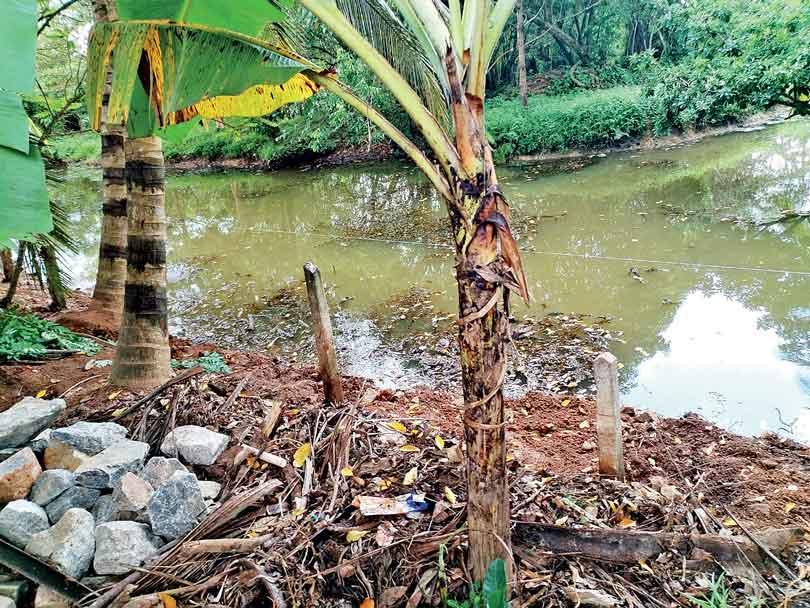
| Efforts being taken to build a structure on area where the canal is present |
|
|
Minister Prasanna Ranatunga is accused of filling up a canal reserve at the end of Perera Mawatha in Thalawathugoda which was previously used by residents as a garbage dumping ground
The company that sold this land designated this reserved part for the protection of the canal at the time of the sale
In this regard the Director-General of the Urban Development Authority has taken legal action under case number 6136/17 in the Kaduwela Magistrate’s Court
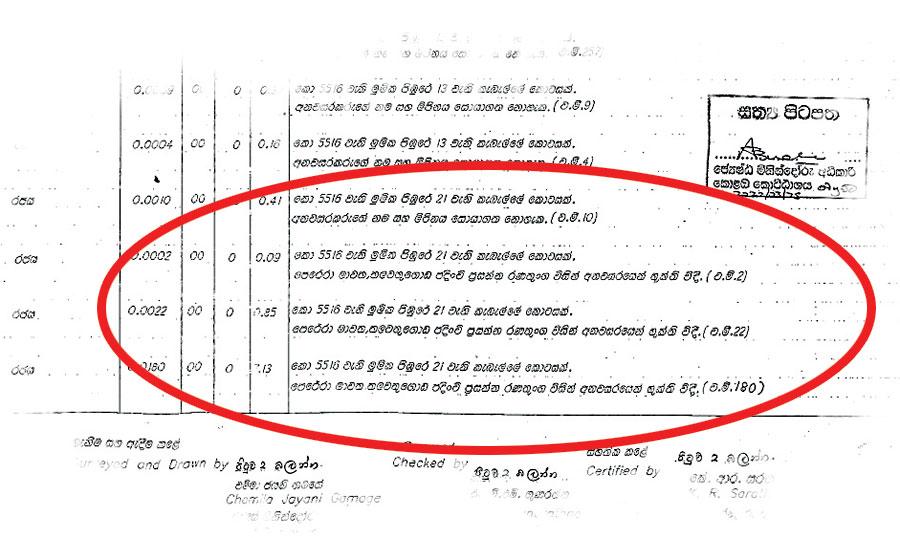
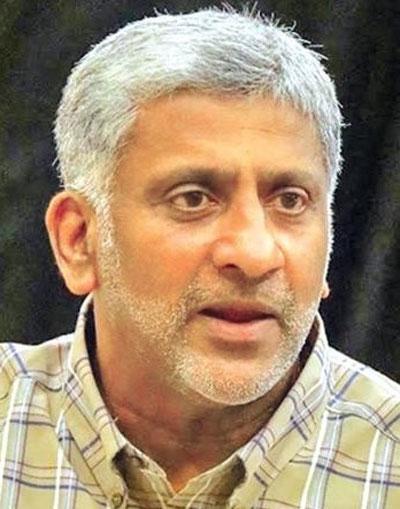 For a long time, accusations have been made against Urban Development and Housing Minister Prasanna Ranatunga, alleging that he forcibly acquired a plot of state-owned land in the Thalawathugoda area and also conducted reclamation and development activities there. The Minister’s daughter resides in a house on a land adjacent to Perera Mawatha in Thalawathugoda where the Minister’s house is located. There is no access to that house directly from Perera Mawatha; hence one must use the road close by to the Thalawathugoda tank to reach it. A protected canal separates the Minister’s daughter’s land from the Minister’s land at the end of that road. It is alleged that Minister Ranatunga is attempting to fill the canal, construct a road to connect the two houses and provide access to both properties from the aforementioned roads.
For a long time, accusations have been made against Urban Development and Housing Minister Prasanna Ranatunga, alleging that he forcibly acquired a plot of state-owned land in the Thalawathugoda area and also conducted reclamation and development activities there. The Minister’s daughter resides in a house on a land adjacent to Perera Mawatha in Thalawathugoda where the Minister’s house is located. There is no access to that house directly from Perera Mawatha; hence one must use the road close by to the Thalawathugoda tank to reach it. A protected canal separates the Minister’s daughter’s land from the Minister’s land at the end of that road. It is alleged that Minister Ranatunga is attempting to fill the canal, construct a road to connect the two houses and provide access to both properties from the aforementioned roads.
The person who has complained against these activities is Ranjeewi De Silva, who resides at house No. 700/107, Perera Mawatha, Thalawathugoda. The portion of the canal reserve at the end of Perera Mawatha in Thalawathugoda was previously used by residents of the area as a dumping ground for garbage. De Silva stated that she cleared the garbage and planted grass and Kumbuk plants to enhance the environment. However, at present Minister Prasanna Ranatunga has forcibly taken over this area and established his office by placing an office container at the location and occupying the relevant land. The company that sold this land designated this reserved part for the protection of the canal at the time of the sale. A small gate was also installed to provide access to this reserved part; enabling the clearing of blockages in the waste disposal drain if a need arose. However, De Silva claimed that Minister Prasanna Ranatunga has blocked this gate. With the gate blocked, if the canal becomes suddenly obstructed with garbage, it would now be unthinkable to clean it. She added that this situation has arisen due to Minister Ranatunga’s forceful occupation of the reserved land.
Additionally, the minister has constructed his office in a manner that obstructs the drain through which rain water coming from the road flows. She mentioned that the minister has taken steps to prevent the erosion of his land by erecting a stone retaining wall on the reserve border of the canal. When the land at the end of Perera Mawatha was auctioned, a proper drainage system was installed, but this was not on a private property. During the division of the land, a drainage system was designated through the reserved portion to manage water and waste disposal. She added that these drains were not placed in anyone’s private property.
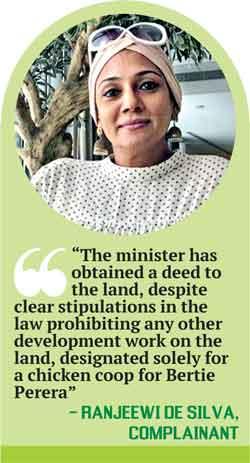 In this regard, Sampath Sumedha Pujitha Ratnayake, Director-General of the Urban Development Authority, took legal action under case number 6136/17 in the Kaduwela Magistrate’s Court. This action pertains to plots 8, 9, and 10 of the tracing CD/DSD/2016/ dated 17.06.2016, located in Thalawathugoda in the Hewagam Korala sub-division of the Kaduwela Divisional Secretariat Division, Colombo District, Western Province certified by K. R. Sarath, Senior Superintendent of Surveys of the Colombo District, in place of the Surveyor. According to the judgment of that case, as per the form “B” of the State Lands (Recovery Of Possession) Act No. 7 of 1979, amended by Acts No. 58 of 1981 and No. 29 of 1983, requests have been made for the eviction of the land in question, which is used by the minister. This occurred on August 16, 2017. However, despite the decision, De Silva stated that the minister has not vacated the land.
In this regard, Sampath Sumedha Pujitha Ratnayake, Director-General of the Urban Development Authority, took legal action under case number 6136/17 in the Kaduwela Magistrate’s Court. This action pertains to plots 8, 9, and 10 of the tracing CD/DSD/2016/ dated 17.06.2016, located in Thalawathugoda in the Hewagam Korala sub-division of the Kaduwela Divisional Secretariat Division, Colombo District, Western Province certified by K. R. Sarath, Senior Superintendent of Surveys of the Colombo District, in place of the Surveyor. According to the judgment of that case, as per the form “B” of the State Lands (Recovery Of Possession) Act No. 7 of 1979, amended by Acts No. 58 of 1981 and No. 29 of 1983, requests have been made for the eviction of the land in question, which is used by the minister. This occurred on August 16, 2017. However, despite the decision, De Silva stated that the minister has not vacated the land.
State-owned lands in Thalawathugoda have been identified in Field Book No. CO. 7519 and CO. 7666, under tracing No. CO/DSD/2016/411 of the Survey Department of Sri Lanka. It is revealed that Minister Ranatunga, a resident of Perera Mawatha, Thalawathugoda, is occupying without authorisation 0.09 perches, 0.85 perches, and 7.13 perches of government lands known as Dah Atalaga and Dolos Kumbura, originating from Plot 21 of the primary plan Co. 5516, as specified in Plot No. 8, 9, and 10.
Notice issued to vacate land
The judgment of the aforementioned case instructed the minister to vacate the relevant reserve promptly. De Silva mentioned that the Urban Development Authority had erected signboards indicating the state ownership of the land; however, Minister Ranatunga had removed and burned these boards, according to De Silva. She further noted, that despite lodging a complaint with the Thalangama Police, legal enforcement has yet to be executed. The deed of my house, drafted in 2013, explicitly delineates a government reserve along one boundary of her property.
Additionally, she underscored that the main plan prepared in 1982, clearly designates the area utilised by Minister Prasanna as part of the government reserve.
According to De Silva, those lands have now been forcibly seized by Minister Ranatunga. She also asserted that the minister has unlawfully acquired a plot measuring 23.8 perches, upon which his house is constructed. Furthermore, she mentioned that the reserved portion, originally 7 perches in size, has expanded to approximately 11 perches due to continuous filling.
The entire land on Perera Mawatha was owned by a person named Bertie Perera in the past. Although the land that the minister is currently utilising belongs to the reserved part, Bertie Perera had been granted permission by the Urban Development Authority to build a chicken coop there, subject to specified conditions. De Silva added that, “the minister has obtained a deed to the land, despite clear stipulations in the law prohibiting any other development work on the land, designated solely for a chicken coop for Bertie Perera”.
Minister Rantunga has acquired the government reserve land on a lease basis in the name of his wife. De Silva stated that the Urban Development Authority arranged for the Minister to use the land, despite being instructed to vacate it following court action. In letter No 01/01, sent by N.P.K. Ranaweera, Director-General of the Urban Development Authority, to De Silva on August 15, 2022, it is stated:”Based on a request made by Maureen Stella Ranatunga, a resident of No. 700/17, Perera Mawatha, Thalawathugoda, to the Urban Development Authority, a plot of land measuring 6.22 perches was leased to her for 30 years, subject to the approval of the then Minister of Urban Development and Housing, and in accordance with the provisions of the Urban Development Authority.”The letter specifies that the property is leased to her under the condition that there is a prohibition of erecting any permanent building on the land. However the letter states that, instead, the property can be used for landscaping and cultivation purposes. It also states that the Urban Development Authority does not oppose the request to use a container box, which is not a permanent building, for necessary purposes. Furthermore, it is noted in the investigation that only Minister Ranatunga has been sued regarding a land owned by Maureen Stella Ranatunga. Additionally, the letter mentions that Prasanna Ranatunga agreed to return the aforementioned lands he possesses after settling the boundary issues connected with these respective lands.
Legally, there is typically no authorisation to reclaim land by building a structure across a canal. If an ordinary resident were to undertake such an action, the Department of Lowlands and the Urban Development Authority would initiate legal proceedings to evict them and return the land to the government. However, De Silva added that the silence of government institutions when the minister in charge of those subjects commits such an offense is regrettable. Additionally, the Urban Development Authority leased this land to Maureen Stella Ranatunga, in violation of Extraordinary Gazette 185/6 issued on Tuesday, March 23, 1982, which stipulates that no government reserve land in Thalawathugoda can be leased. The law in this country operates differently for Minister Ranatunga when he is compared to the ordinary citizens; largely due to the influence he wields as a minister. Despite De Silva exposing these happenings through the media for years, no legal action has been taken against the minister. However, she said that she has already initiated legal proceedings against the minister and the government officials who supported this offence.
“Accusations were found to be baseless”- Balasuriya
Commenting on this issue, Sri Lanka Land Development Corporation Chairman Hiran Balasuriya stated, “The land located near a canal in Thalawathugoda, Battaramulla is an area that is continuously experiencing soil erosion. This was confirmed during our observations. Accordingly, the wife of Minister Prasanna Ranatunga informed the Sri Lanka Land Development Corporation on June 14, 2023, that the banks of the Urban Development Authority land she has leased are eroding. Consequently, we informed Prasanna’s wife that since the land was acquired on a lease basis, measures cannot be taken to prevent soil erosion under government provisions unless payment is made. She agreed to this arrangement. The estimated cost was around 1.2 million rupees. She had paid nearly 0.5 million rupees, and accordingly, the corporation worked to build a side wall to prevent soil erosion.
“According to the powers vested in the Land Development Corporation, there is no obstacle to the construction of such a side wall. The construction is carried out subject to the conditions outlined by the Urban Development Authority when the land was transferred to the minister’s wife on a lease basis,” said Balasuriya.
The other accusation against Minister Ranatunga is that another piece of land adjacent to his daughter’s house is being reclaimed. In response to this, Balasuriya stated that measures have been taken to prevent bank erosion at the relevant location. The chairman clarified that the land being developed bordering the minister’s daughter’s house belongs to his corporation, and his corporation is implementing a development project to prevent the banks of the Battaramulla and Thalawathugoda canals from eroding. He emphasised that this project commenced in the canal areas a few months ago and is aimed at preventing bank erosion in the reserve canal, bordering the house of the minister’s daughter. Another allegation made by the concerned woman against the minister is that he has blocked the water drains where water flowing from the road goes through. However, Balasuriya stated that the accusations were found to be baseless upon their observation.
|
UDA DG admits leasing state land to Mininster’s wife N.P.K. Ranaweera, Director General of the Urban Development Authority, commented on this matter, stating, “We have legally allocated a piece of land belonging to the Urban Development Authority in Thalawathugoda Perera Mawatha to the applicant who applied in the name of Maureen Stella Ranatunga. The land has been leased for 30 years after undergoing a proper assessment by the Government Valuation Department and making the necessary payments. There’s a misunderstanding that the minister was given priority in the allocation of this land. This is incorrect. If there is a piece of land behind the area where I reside, and if it is not accessible to anyone and is beneficial to me, I would request that piece of land from the Urban Development Authority. If feasible, the land would be allocated. Similarly, land belonging to the Urban Development Authority has been leased to many individuals around Battaramulla”. |
|
“This allegation is baseless and malicious”-Minister Ranatunga Commenting on this issue, Urban Development and Housing Minister Prasanna Ranatunga said, “I completely deny the accusations that my house on Perera Mawatha, Thalawathugoda, is an unauthorised construction and that an adjoining state-owned land is being illegally filled using my authority. I’ve already taken legal action against those who make these accusations. Ranjeewi De Silva has continuously alleged that the house owned by Prasanna Ranatunga’s wife on Perera Mawatha in Thalawathugoda is an unauthorised construction and that the minister is using his authority to fill up an Urban Development Authority land adjacent to that house, as well as that a canal reserve is being filled up adjacent to a house owned by the minister’s daughter. This allegation is baseless and malicious. My wife purchased the 25.8 perches of land on Perera Mawatha, where I currently reside, in 2004 from Bertie Perera. This transaction is confirmed by Deed No. 2813. Additionally, it is confirmed by Folio No. 1470/206 registered by the Homagama Land Registrar. Prior to my wife’s acquisition of this land, the original owner, Bertie Perera, obtained approval on 16.10.2003 to develop the land. Approval from the Land Development Corporation, Urban Development Authority, and Department of Agrarian Services was granted to Bertie Perera for this purpose, as evidenced by the relevant documents. It is important to note that during the period 2003-2004, there was a United National Party Government in Sri Lanka. Any suggestion that the approval for the development of this land was obtained through political influence is therefore denied.
“The approval to build a house on the land purchased by my wife was obtained on July 10th, 2014. The Kaduwela Municipal Council approved this building plan. However, a woman named Ranjeewi de Silva alleges that there is a court order for the minister to vacate this land. Case number 06/36/17/1715E was assigned by the Yahapalana Government at Kaduwela Magistrate’s Court. I had been accused of misusing plots No. 08, 09, 10 adjacent to the land where I reside; belonging to the preliminary map Co. 5516. However, during the hearing, the Director of Land Development and Management of the Urban Development Authority informed the court that the Authority has built a security fence to enclose the land portion specified as Lot No. 10 and has installed two signboards indicating that the land is owned and protected by the authority. Accordingly, it has been stated in the letter dated November 30, 2017, that no unauthorised seizure has taken place in Lot No. 10. However, during the relevant hearing, it was confirmed that 0.94 perches of land indicated as plot No. 08 and 09 have been included in the land claimed by my wife. Additionally, it was stated that a perch from the land belonging to my wife was included in plot number 10, which was fenced by the Urban Development Authority. This was confirmed during the measurements made according to the court order. Accordingly, the portion of 0.94 perches that had included in my wife’s land was taken over by the Urban Development Authority, and the perch of my wife’s land, which was included in the land of the Urban Development Authority, was released by the authority. Consequently, the Urban Development Authority settled the case and withdrew the related case on April 23, 2018, during the period of the Yahapalana Government. No court decision has been issued to me or my wife to vacate the land that rightfully belongs to us. The 6.22 perches of land belonging to the Urban Development Authority, adjacent to the house for which I am accused of forcibly enjoying, has been leased by my wife for 30 years after paying the government’s assessed amount of 5.2 million rupees to the Urban Development Authority on November 23, 2021. The Urban Development Authority and my wife have also signed a related agreement, agreeing to the relevant lease conditions. I deny Ranjeewi De Silva’s allegation that the land is being forcibly enjoyed”. |
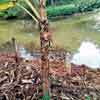 ]]>
]]>
| Efforts being taken to build a structure on area where the canal is present |
|
|
Minister Prasanna Ranatunga is accused of filling up a canal reserve at the end of Perera Mawatha in Thalawathugoda which was previously used by residents as a garbage dumping ground
The company that sold this land designated this reserved part for the protection of the canal at the time of the sale
In this regard the Director-General of the Urban Development Authority has taken legal action under case number 6136/17 in the Kaduwela Magistrate’s Court

 For a long time, accusations have been made against Urban Development and Housing Minister Prasanna Ranatunga, alleging that he forcibly acquired a plot of state-owned land in the Thalawathugoda area and also conducted reclamation and development activities there. The Minister’s daughter resides in a house on a land adjacent to Perera Mawatha in Thalawathugoda where the Minister’s house is located. There is no access to that house directly from Perera Mawatha; hence one must use the road close by to the Thalawathugoda tank to reach it. A protected canal separates the Minister’s daughter’s land from the Minister’s land at the end of that road. It is alleged that Minister Ranatunga is attempting to fill the canal, construct a road to connect the two houses and provide access to both properties from the aforementioned roads.
For a long time, accusations have been made against Urban Development and Housing Minister Prasanna Ranatunga, alleging that he forcibly acquired a plot of state-owned land in the Thalawathugoda area and also conducted reclamation and development activities there. The Minister’s daughter resides in a house on a land adjacent to Perera Mawatha in Thalawathugoda where the Minister’s house is located. There is no access to that house directly from Perera Mawatha; hence one must use the road close by to the Thalawathugoda tank to reach it. A protected canal separates the Minister’s daughter’s land from the Minister’s land at the end of that road. It is alleged that Minister Ranatunga is attempting to fill the canal, construct a road to connect the two houses and provide access to both properties from the aforementioned roads.
The person who has complained against these activities is Ranjeewi De Silva, who resides at house No. 700/107, Perera Mawatha, Thalawathugoda. The portion of the canal reserve at the end of Perera Mawatha in Thalawathugoda was previously used by residents of the area as a dumping ground for garbage. De Silva stated that she cleared the garbage and planted grass and Kumbuk plants to enhance the environment. However, at present Minister Prasanna Ranatunga has forcibly taken over this area and established his office by placing an office container at the location and occupying the relevant land. The company that sold this land designated this reserved part for the protection of the canal at the time of the sale. A small gate was also installed to provide access to this reserved part; enabling the clearing of blockages in the waste disposal drain if a need arose. However, De Silva claimed that Minister Prasanna Ranatunga has blocked this gate. With the gate blocked, if the canal becomes suddenly obstructed with garbage, it would now be unthinkable to clean it. She added that this situation has arisen due to Minister Ranatunga’s forceful occupation of the reserved land.
Additionally, the minister has constructed his office in a manner that obstructs the drain through which rain water coming from the road flows. She mentioned that the minister has taken steps to prevent the erosion of his land by erecting a stone retaining wall on the reserve border of the canal. When the land at the end of Perera Mawatha was auctioned, a proper drainage system was installed, but this was not on a private property. During the division of the land, a drainage system was designated through the reserved portion to manage water and waste disposal. She added that these drains were not placed in anyone’s private property.
 In this regard, Sampath Sumedha Pujitha Ratnayake, Director-General of the Urban Development Authority, took legal action under case number 6136/17 in the Kaduwela Magistrate’s Court. This action pertains to plots 8, 9, and 10 of the tracing CD/DSD/2016/ dated 17.06.2016, located in Thalawathugoda in the Hewagam Korala sub-division of the Kaduwela Divisional Secretariat Division, Colombo District, Western Province certified by K. R. Sarath, Senior Superintendent of Surveys of the Colombo District, in place of the Surveyor. According to the judgment of that case, as per the form “B” of the State Lands (Recovery Of Possession) Act No. 7 of 1979, amended by Acts No. 58 of 1981 and No. 29 of 1983, requests have been made for the eviction of the land in question, which is used by the minister. This occurred on August 16, 2017. However, despite the decision, De Silva stated that the minister has not vacated the land.
In this regard, Sampath Sumedha Pujitha Ratnayake, Director-General of the Urban Development Authority, took legal action under case number 6136/17 in the Kaduwela Magistrate’s Court. This action pertains to plots 8, 9, and 10 of the tracing CD/DSD/2016/ dated 17.06.2016, located in Thalawathugoda in the Hewagam Korala sub-division of the Kaduwela Divisional Secretariat Division, Colombo District, Western Province certified by K. R. Sarath, Senior Superintendent of Surveys of the Colombo District, in place of the Surveyor. According to the judgment of that case, as per the form “B” of the State Lands (Recovery Of Possession) Act No. 7 of 1979, amended by Acts No. 58 of 1981 and No. 29 of 1983, requests have been made for the eviction of the land in question, which is used by the minister. This occurred on August 16, 2017. However, despite the decision, De Silva stated that the minister has not vacated the land.
State-owned lands in Thalawathugoda have been identified in Field Book No. CO. 7519 and CO. 7666, under tracing No. CO/DSD/2016/411 of the Survey Department of Sri Lanka. It is revealed that Minister Ranatunga, a resident of Perera Mawatha, Thalawathugoda, is occupying without authorisation 0.09 perches, 0.85 perches, and 7.13 perches of government lands known as Dah Atalaga and Dolos Kumbura, originating from Plot 21 of the primary plan Co. 5516, as specified in Plot No. 8, 9, and 10.
Notice issued to vacate land
The judgment of the aforementioned case instructed the minister to vacate the relevant reserve promptly. De Silva mentioned that the Urban Development Authority had erected signboards indicating the state ownership of the land; however, Minister Ranatunga had removed and burned these boards, according to De Silva. She further noted, that despite lodging a complaint with the Thalangama Police, legal enforcement has yet to be executed. The deed of my house, drafted in 2013, explicitly delineates a government reserve along one boundary of her property.
Additionally, she underscored that the main plan prepared in 1982, clearly designates the area utilised by Minister Prasanna as part of the government reserve.
According to De Silva, those lands have now been forcibly seized by Minister Ranatunga. She also asserted that the minister has unlawfully acquired a plot measuring 23.8 perches, upon which his house is constructed. Furthermore, she mentioned that the reserved portion, originally 7 perches in size, has expanded to approximately 11 perches due to continuous filling.
The entire land on Perera Mawatha was owned by a person named Bertie Perera in the past. Although the land that the minister is currently utilising belongs to the reserved part, Bertie Perera had been granted permission by the Urban Development Authority to build a chicken coop there, subject to specified conditions. De Silva added that, “the minister has obtained a deed to the land, despite clear stipulations in the law prohibiting any other development work on the land, designated solely for a chicken coop for Bertie Perera”.
Minister Rantunga has acquired the government reserve land on a lease basis in the name of his wife. De Silva stated that the Urban Development Authority arranged for the Minister to use the land, despite being instructed to vacate it following court action. In letter No 01/01, sent by N.P.K. Ranaweera, Director-General of the Urban Development Authority, to De Silva on August 15, 2022, it is stated:”Based on a request made by Maureen Stella Ranatunga, a resident of No. 700/17, Perera Mawatha, Thalawathugoda, to the Urban Development Authority, a plot of land measuring 6.22 perches was leased to her for 30 years, subject to the approval of the then Minister of Urban Development and Housing, and in accordance with the provisions of the Urban Development Authority.”The letter specifies that the property is leased to her under the condition that there is a prohibition of erecting any permanent building on the land. However the letter states that, instead, the property can be used for landscaping and cultivation purposes. It also states that the Urban Development Authority does not oppose the request to use a container box, which is not a permanent building, for necessary purposes. Furthermore, it is noted in the investigation that only Minister Ranatunga has been sued regarding a land owned by Maureen Stella Ranatunga. Additionally, the letter mentions that Prasanna Ranatunga agreed to return the aforementioned lands he possesses after settling the boundary issues connected with these respective lands.
Legally, there is typically no authorisation to reclaim land by building a structure across a canal. If an ordinary resident were to undertake such an action, the Department of Lowlands and the Urban Development Authority would initiate legal proceedings to evict them and return the land to the government. However, De Silva added that the silence of government institutions when the minister in charge of those subjects commits such an offense is regrettable. Additionally, the Urban Development Authority leased this land to Maureen Stella Ranatunga, in violation of Extraordinary Gazette 185/6 issued on Tuesday, March 23, 1982, which stipulates that no government reserve land in Thalawathugoda can be leased. The law in this country operates differently for Minister Ranatunga when he is compared to the ordinary citizens; largely due to the influence he wields as a minister. Despite De Silva exposing these happenings through the media for years, no legal action has been taken against the minister. However, she said that she has already initiated legal proceedings against the minister and the government officials who supported this offence.
“Accusations were found to be baseless”- Balasuriya
Commenting on this issue, Sri Lanka Land Development Corporation Chairman Hiran Balasuriya stated, “The land located near a canal in Thalawathugoda, Battaramulla is an area that is continuously experiencing soil erosion. This was confirmed during our observations. Accordingly, the wife of Minister Prasanna Ranatunga informed the Sri Lanka Land Development Corporation on June 14, 2023, that the banks of the Urban Development Authority land she has leased are eroding. Consequently, we informed Prasanna’s wife that since the land was acquired on a lease basis, measures cannot be taken to prevent soil erosion under government provisions unless payment is made. She agreed to this arrangement. The estimated cost was around 1.2 million rupees. She had paid nearly 0.5 million rupees, and accordingly, the corporation worked to build a side wall to prevent soil erosion.
“According to the powers vested in the Land Development Corporation, there is no obstacle to the construction of such a side wall. The construction is carried out subject to the conditions outlined by the Urban Development Authority when the land was transferred to the minister’s wife on a lease basis,” said Balasuriya.
The other accusation against Minister Ranatunga is that another piece of land adjacent to his daughter’s house is being reclaimed. In response to this, Balasuriya stated that measures have been taken to prevent bank erosion at the relevant location. The chairman clarified that the land being developed bordering the minister’s daughter’s house belongs to his corporation, and his corporation is implementing a development project to prevent the banks of the Battaramulla and Thalawathugoda canals from eroding. He emphasised that this project commenced in the canal areas a few months ago and is aimed at preventing bank erosion in the reserve canal, bordering the house of the minister’s daughter. Another allegation made by the concerned woman against the minister is that he has blocked the water drains where water flowing from the road goes through. However, Balasuriya stated that the accusations were found to be baseless upon their observation.
|
UDA DG admits leasing state land to Mininster’s wife N.P.K. Ranaweera, Director General of the Urban Development Authority, commented on this matter, stating, “We have legally allocated a piece of land belonging to the Urban Development Authority in Thalawathugoda Perera Mawatha to the applicant who applied in the name of Maureen Stella Ranatunga. The land has been leased for 30 years after undergoing a proper assessment by the Government Valuation Department and making the necessary payments. There’s a misunderstanding that the minister was given priority in the allocation of this land. This is incorrect. If there is a piece of land behind the area where I reside, and if it is not accessible to anyone and is beneficial to me, I would request that piece of land from the Urban Development Authority. If feasible, the land would be allocated. Similarly, land belonging to the Urban Development Authority has been leased to many individuals around Battaramulla”. |
|
“This allegation is baseless and malicious”-Minister Ranatunga Commenting on this issue, Urban Development and Housing Minister Prasanna Ranatunga said, “I completely deny the accusations that my house on Perera Mawatha, Thalawathugoda, is an unauthorised construction and that an adjoining state-owned land is being illegally filled using my authority. I’ve already taken legal action against those who make these accusations. Ranjeewi De Silva has continuously alleged that the house owned by Prasanna Ranatunga’s wife on Perera Mawatha in Thalawathugoda is an unauthorised construction and that the minister is using his authority to fill up an Urban Development Authority land adjacent to that house, as well as that a canal reserve is being filled up adjacent to a house owned by the minister’s daughter. This allegation is baseless and malicious. My wife purchased the 25.8 perches of land on Perera Mawatha, where I currently reside, in 2004 from Bertie Perera. This transaction is confirmed by Deed No. 2813. Additionally, it is confirmed by Folio No. 1470/206 registered by the Homagama Land Registrar. Prior to my wife’s acquisition of this land, the original owner, Bertie Perera, obtained approval on 16.10.2003 to develop the land. Approval from the Land Development Corporation, Urban Development Authority, and Department of Agrarian Services was granted to Bertie Perera for this purpose, as evidenced by the relevant documents. It is important to note that during the period 2003-2004, there was a United National Party Government in Sri Lanka. Any suggestion that the approval for the development of this land was obtained through political influence is therefore denied.
“The approval to build a house on the land purchased by my wife was obtained on July 10th, 2014. The Kaduwela Municipal Council approved this building plan. However, a woman named Ranjeewi de Silva alleges that there is a court order for the minister to vacate this land. Case number 06/36/17/1715E was assigned by the Yahapalana Government at Kaduwela Magistrate’s Court. I had been accused of misusing plots No. 08, 09, 10 adjacent to the land where I reside; belonging to the preliminary map Co. 5516. However, during the hearing, the Director of Land Development and Management of the Urban Development Authority informed the court that the Authority has built a security fence to enclose the land portion specified as Lot No. 10 and has installed two signboards indicating that the land is owned and protected by the authority. Accordingly, it has been stated in the letter dated November 30, 2017, that no unauthorised seizure has taken place in Lot No. 10. However, during the relevant hearing, it was confirmed that 0.94 perches of land indicated as plot No. 08 and 09 have been included in the land claimed by my wife. Additionally, it was stated that a perch from the land belonging to my wife was included in plot number 10, which was fenced by the Urban Development Authority. This was confirmed during the measurements made according to the court order. Accordingly, the portion of 0.94 perches that had included in my wife’s land was taken over by the Urban Development Authority, and the perch of my wife’s land, which was included in the land of the Urban Development Authority, was released by the authority. Consequently, the Urban Development Authority settled the case and withdrew the related case on April 23, 2018, during the period of the Yahapalana Government. No court decision has been issued to me or my wife to vacate the land that rightfully belongs to us. The 6.22 perches of land belonging to the Urban Development Authority, adjacent to the house for which I am accused of forcibly enjoying, has been leased by my wife for 30 years after paying the government’s assessed amount of 5.2 million rupees to the Urban Development Authority on November 23, 2021. The Urban Development Authority and my wife have also signed a related agreement, agreeing to the relevant lease conditions. I deny Ranjeewi De Silva’s allegation that the land is being forcibly enjoyed”. |
 ]]>
]]>
Bank’s General Manager,Thushara Asuramanna, has recently told this to workers and the trade union members at a public meeting explaining the ‘difficult’ situation that the state bank is going through.
“When we tried to recover certain loans we used to get calls even from the Presidential Secretariat,” Asuramanna, told employees who gathered at the head office at Kollupitiya demanding bonuses for the Sinhala and Hindu New Year.
As the bank employees were not satisfied with regard to their requests for a New Year bonus, they had surrounded the head office. However, the General Manager who intervened in the situation summoned the employees to the auditorium and explained how over the past few years the bank had been going from bad to worse and ended up with nearly Rs 500 million in losses.
Bonuses
“To award a bonus of 25% of the salary, the bank requires several millions of rupees,” the GM has told. Explaining the history of financial struggle, Asuramanna has said that by the middle of 2022, there were around Rs 50 million in loans.
At the meeting he had detailed that with the interests going up by the middle of 2022, the bank took actions to maintain the fixed deposits by giving high-interest rates. By the end of 2022 the cost went up to about 21 million from 8 million.
He has said that in the year 2022, around Rs 48 million operating loss was faced by the bank and this went up to a total of about Rs 500 in 2023.
However according to the GM one of the main reasons for bank’s failure was taking actions on individuals and not following due banking procedures
Amidst the massive losses, the Central Bank has proposed a merger which the bank management has required time for recovery. However, during the meeting, the GM had said that the bank’s loss was not due to workers but outside events. I don’t think this happened due to any fault by the workers. However according to the GM one of the main reasons for bank’s failure was taking actions on individuals and not following due banking procedures.
He said that there are about ten loans which had not taken action to recover. In some loans for nearly 3 years no action was taken to settle them. The General Manager had admitted there are delays to take action. However some debtors had given assurances to sell their other assets and recover the loans, he has told the bank employees.
“This issue had come up at the Audit inquiries and even during COPE and even the Central Bank had inquired about this” the GM told the employees.
“We have not gone for legal actions,” he said.
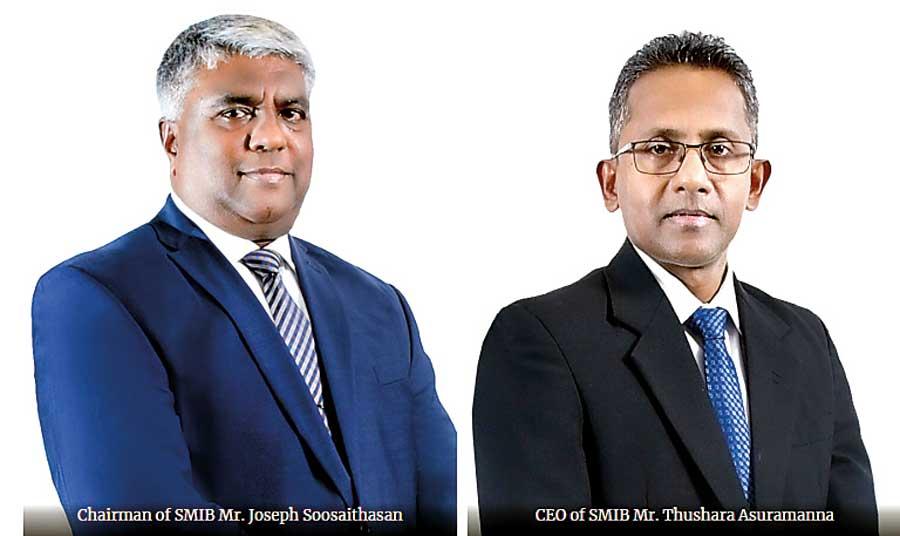
Recovery path
The GM admitted that some loans are not in the 100% recovery path. 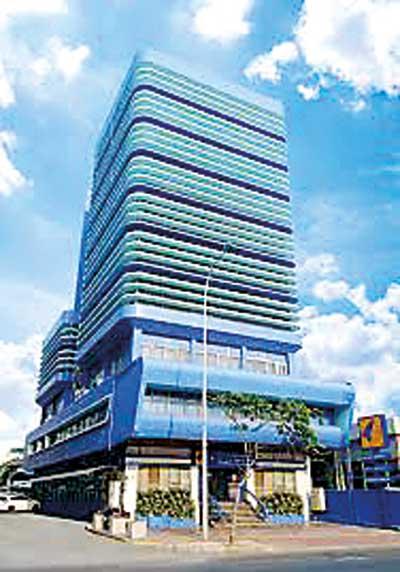
“There are also reasons from external parties. Sometimes when we try to take action, it is not like a private bank we get even calls from the Presidential Secretariat. In some cases, recovery process does not take the speed we expect. Now we have decided to take some action and the Central Bank is keeping an eye on them too.” GM Asuramanna has said.
It was revealed that bank had given business loans to some influential parties who delayed the payment. “Some of these loans released before the Covid-19 pandemic had gone to relatives of former politicians. During the Covid- 19 period they had been given a moratorium as well,” the Bank Union spokesman told.
Last October, the Parliamentary watchdog Committee questioned the bank’s failure to recover a sum of Rs 68 million lost due to a loan scam dating back to 2017.
The COPE had revealed the unsettling delays in the recovery process, despite six years having passed since the incident.
The COPE Committee had issued an order for SMIB officials to submit a comprehensive report to the Committee.
Chairman’s response
When Daily Mirror contacted the Chairman of the SMIB, Joseph Soosaithasan he said that some action has been taken to award New Year bonuses to the employees. However, he asked to contact him today (8) to respond to the bank losses and the political influence when tried to recover loans.
 ]]>
]]>
Bank’s General Manager,Thushara Asuramanna, has recently told this to workers and the trade union members at a public meeting explaining the ‘difficult’ situation that the state bank is going through.
“When we tried to recover certain loans we used to get calls even from the Presidential Secretariat,” Asuramanna, told employees who gathered at the head office at Kollupitiya demanding bonuses for the Sinhala and Hindu New Year.
As the bank employees were not satisfied with regard to their requests for a New Year bonus, they had surrounded the head office. However, the General Manager who intervened in the situation summoned the employees to the auditorium and explained how over the past few years the bank had been going from bad to worse and ended up with nearly Rs 500 million in losses.
Bonuses
“To award a bonus of 25% of the salary, the bank requires several millions of rupees,” the GM has told. Explaining the history of financial struggle, Asuramanna has said that by the middle of 2022, there were around Rs 50 million in loans.
At the meeting he had detailed that with the interests going up by the middle of 2022, the bank took actions to maintain the fixed deposits by giving high-interest rates. By the end of 2022 the cost went up to about 21 million from 8 million.
He has said that in the year 2022, around Rs 48 million operating loss was faced by the bank and this went up to a total of about Rs 500 in 2023.
However according to the GM one of the main reasons for bank’s failure was taking actions on individuals and not following due banking procedures
Amidst the massive losses, the Central Bank has proposed a merger which the bank management has required time for recovery. However, during the meeting, the GM had said that the bank’s loss was not due to workers but outside events. I don’t think this happened due to any fault by the workers. However according to the GM one of the main reasons for bank’s failure was taking actions on individuals and not following due banking procedures.
He said that there are about ten loans which had not taken action to recover. In some loans for nearly 3 years no action was taken to settle them. The General Manager had admitted there are delays to take action. However some debtors had given assurances to sell their other assets and recover the loans, he has told the bank employees.
“This issue had come up at the Audit inquiries and even during COPE and even the Central Bank had inquired about this” the GM told the employees.
“We have not gone for legal actions,” he said.

Recovery path
The GM admitted that some loans are not in the 100% recovery path. 
“There are also reasons from external parties. Sometimes when we try to take action, it is not like a private bank we get even calls from the Presidential Secretariat. In some cases, recovery process does not take the speed we expect. Now we have decided to take some action and the Central Bank is keeping an eye on them too.” GM Asuramanna has said.
It was revealed that bank had given business loans to some influential parties who delayed the payment. “Some of these loans released before the Covid-19 pandemic had gone to relatives of former politicians. During the Covid- 19 period they had been given a moratorium as well,” the Bank Union spokesman told.
Last October, the Parliamentary watchdog Committee questioned the bank’s failure to recover a sum of Rs 68 million lost due to a loan scam dating back to 2017.
The COPE had revealed the unsettling delays in the recovery process, despite six years having passed since the incident.
The COPE Committee had issued an order for SMIB officials to submit a comprehensive report to the Committee.
Chairman’s response
When Daily Mirror contacted the Chairman of the SMIB, Joseph Soosaithasan he said that some action has been taken to award New Year bonuses to the employees. However, he asked to contact him today (8) to respond to the bank losses and the political influence when tried to recover loans.
 ]]>
]]>
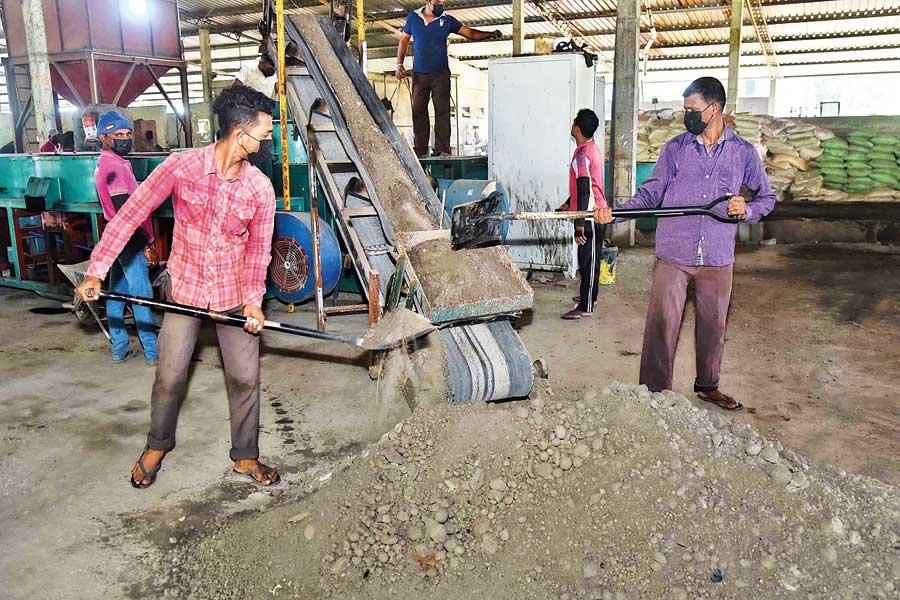
Workers are seen engaged in the process of making carbonic fertilizer
(Pic by Samantha Perera)
- Managing high costs in agriculture can be achieved if the authorities have a system of empowering village farmers’ associations
- There is a lack of collaboration with farmers’ associations or skilled farmers in finding solutions to agriculture related problems
- Currently, agricultural products in our country lack a recognized source, given the absence of producers
- So far, local fertilizer manufacturers have produced local granular fertilizers and met international standards using modern technology
This article is based on a discussion with Ajith Randunu, former Executive Officer of the Ministry of Agriculture and an employee of the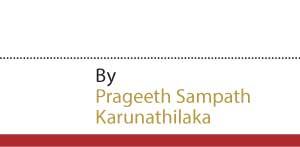 private sector, who also served as the Managing Director of Green Force Agriculture Private Limited, about the changes that need to be made to ensure agriculture progresses in this country by using new technology and knowledge; not forgetting the challenges Sri Lanka also faces in this sector.
private sector, who also served as the Managing Director of Green Force Agriculture Private Limited, about the changes that need to be made to ensure agriculture progresses in this country by using new technology and knowledge; not forgetting the challenges Sri Lanka also faces in this sector.
When it is time to harvest paddy, the farmer has to bear high costs. Even though paddy cultivation doesn’t cost much, the farmer cannot bear the cost of harvesting. “Consequently, the farmer, who harvests his crop, does not have time to dry the paddy. Additionally, the farmer has to pay off existing loans by selling the wet paddy at a low price. This is how much the farmer is burdened with in terms of debt. In the end, the farmer is left with 50,000 rupees or less. From that amount, the farmers have to sustain themselves for six months until the next season arrives,” said Randunu.
According to Randunu due to this issue, about 1.5 million paddy farmers in this country have become slaves in their fields. Many problems have to be faced in farming such as damage by wild elephants, problems associated with water, menaces caused by insects and the purchase of fertilizer and agrochemicals. Consequently, sometimes, the farmer has no other option, but to go into debt due to high costs incurred in engaging in agriculture.
It is possible to manage these high costs. For that, a system of empowering the village farmers’ associations should be implemented. A programme is planned to be implemented starting from the upcoming Yala season. In this programme, the farmer will be able to harvest the paddy by providing one hundred kilos of paddy as payment; resulting in a cost that is only 50 percent of the current expenditure on paddy harvesting. This approach can similarly be applied to plowing fields.
 Many people express their views on integrated pest management in this country, but there is no focus on integrated plant management. Some people mistakenly believe that the organic programme is an initiative by President Gotabaya Rajapaksa; however, organic farming has a historical foundation spanning hundreds of thousands of years. Presently, debating whether it is organic or chemical holds little significance. The focus should be on conserving available funds and prioritizing local resources. Fertilizers are now subject to taxation due to tax reforms implemented during a period of instability in the country. “Due to the war in Ukraine, potassium is not imported. Therefore, what we need to do now is to obtain essential resources and employ other inputs in an integrated manner; moving towards an integrated plant nutrient management. Strategies such as creating polytunnels, using nets to control pests, implementing effective cultivation practices, adopting Kem healing practices, using high-quality seeds, and using local medicines are all viable options. If, despite these efforts, the crop remains prone to insect damage and diseases, the use of chemical insecticides can be considered only when necessary. This is a measure that can be implemented with a plan,” explained Randunu.
Many people express their views on integrated pest management in this country, but there is no focus on integrated plant management. Some people mistakenly believe that the organic programme is an initiative by President Gotabaya Rajapaksa; however, organic farming has a historical foundation spanning hundreds of thousands of years. Presently, debating whether it is organic or chemical holds little significance. The focus should be on conserving available funds and prioritizing local resources. Fertilizers are now subject to taxation due to tax reforms implemented during a period of instability in the country. “Due to the war in Ukraine, potassium is not imported. Therefore, what we need to do now is to obtain essential resources and employ other inputs in an integrated manner; moving towards an integrated plant nutrient management. Strategies such as creating polytunnels, using nets to control pests, implementing effective cultivation practices, adopting Kem healing practices, using high-quality seeds, and using local medicines are all viable options. If, despite these efforts, the crop remains prone to insect damage and diseases, the use of chemical insecticides can be considered only when necessary. This is a measure that can be implemented with a plan,” explained Randunu.
“If a field that has used 100 percent urea is damaged by a Leafhopper infestation, that field can be destroyed within two days. However, with integrated plant management, more than 50 percent of that damage can be avoided. Although organic farming is a politically unsuccessful ideology, it proves more effective when properly planned. This system is associated with liquid manure, solid manure and animal husbandry. Today, aside from officials seeking answers to this question, there is a lack of collaboration with farmers’ associations or skilled farmers in finding solutions. Consequently, it can be observed that the agriculture of our country is stagnating,” he added.
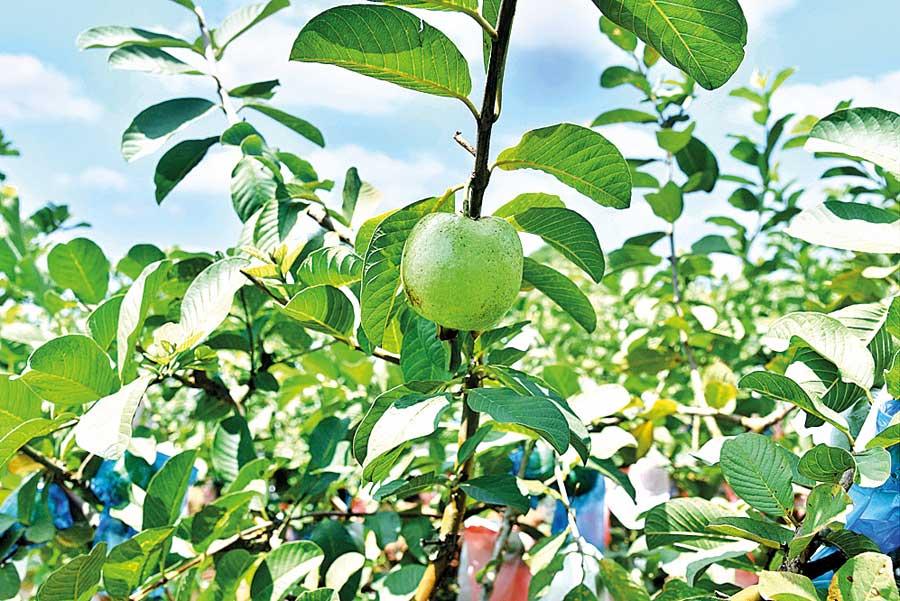
A plot of land cultivated using carbonic fetilizer
Income generating opportunity missed
“To control the prices, officials opted to import eggs from India. However, a more effective approach would have been to support Samurdhi and Aswasuma beneficiaries or the youth in villages to venture into poultry farming as a form of self-employment, rather than spending dollars on importing eggs. By distributing at least 10 backyard chickens among families, it would have been possible to obtain eggs within 4 months, thus creating an opportunity for income generation. This could be achieved without the need to spend money on hormones and vitamins, as the traditional method of raising chickens with small broken flakes of rice, paddy husks, spoiled vegetables, and fruits would suffice. If implemented, this strategy could prevent a drastic rise in egg prices, an egg mafia, and the necessity to import eggs from India,” he said.
According to Randunu, Sri Lanka lacks proper post-harvest management, leading to severe damage to fruits and vegetables. Despite the past increase in vegetable prices, much of the produce had to be discarded due to the absence of post-harvest management. “Currently, agricultural products in our country lack a recognized source, given the absence of producers. Every agricultural product in the country should have an associated producer. For instance, if there is a rice producer, they should address any issues related to rice production. The absence of producers means that any problem affecting rice, for instance, has a widespread impact on Sri Lankan rice. There is no one to take responsibility for the problems associated with agricultural products. To address this issue, it is essential for every vegetable and fruit to have a producer. This ensures the ability to distinguish between good and inferior products. Consequently, the producer is consistently prepared to introduce its products to the market in an exceptional manner. We need to focus on post-harvest management. A system was developed to pack fruits and vegetables in plastic boxes for market distribution, which proved successful. This initiative faced protests, leading to its discontinuation,” he said.
In the past, Sri Lanka prepared green papaya as a curry in villages. “While this curry is not commonly consumed nowadays, Sri Lanka has managed to export thousands of tons of this product to the Dubai market under the name ‘Curry Papaya’. We need to shift to export agriculture through such methods. Presently, urban residents, let alone rural residents, are reluctant to purchase jackfruit from the market. We only buy jackfruit bulbs. An excellent illustration of effective post-harvest technology is the method that allows consumers to buy the desired amount of jackfruit bulbs instead of an entire jackfruit. If farmers’ organizations produce rice and bring it to the market, many people will be tempted to buy it, providing support to these farmers. The government should consider implementing such a system, offering assistance through options like low-interest loans or other methods to help farmers’ organizations establish the necessary infrastructure. The government currently lacks such a plan,” he said.
With the shortage of dollars, many private companies received the opportunity to import fertilizer; resulting in a sufficient supply of fertilizer to Sri Lanka. Consequently, the price of fertilizers decreased. Despite the imposition of taxes on fertilizers, farmers have been able to procure them at a lower cost; even considering the increased and taxed prices. This proved advantageous for the farmers. However, recent reports indicate plans to establish a fertilizer monopoly. “Instead of allowing all companies to import fertilizer, it has been decided to restrict the process to a few selected companies. This approach mirrors the situation with rice, where a monopoly exists among a few individuals, raising concerns that the import of fertilizer may similarly fall into the hands of a select few, inevitably leading to a monopoly,” said Randunu.
So far, local fertilizer manufacturers have produced local granular fertilizers and met international standards using modern technology. “They have successfully developed granular fertilizers that can be applied to crops through drone technology. Applying urea to every crop is useless. The country possesses the capability to produce various local fertilizers tailored to specific crops using new technology, marking a positive trend.
“There is a revival in the agriculture sector in this country. However, the capacity to manage the harvest remains low. Harvest management has been undertaken to some extent by cultivators and entrepreneurs in the field. Entrepreneurs from this country have exported TJC mangoes, Ambul bananas (known as “baby bananas”) from Rajanganaya, and agarwood crops. The government has taken no action in this regard. Presently, the youth are spearheading new initiatives in agriculture, moving towards innovative agro-technical knowledge. Rural lands continue to diminish, as it is being subdivided among children. This makes them unable to cultivate substantial acreages. It is crucial to implement plans, focusing on utilizing the flat house system in villages and the land in rural areas for cultivation. Some individuals own estates in their names without engaging in proper maintenance. If 2000 coconuts are expected from an acre, now only 200 coconuts are taken from those plantations. Hence, there is a need for systematic planning and organising to address these issues effectively,” he said.
There are entrepreneurs in the agricultural sector who are actively using new technology. “The government should establish a reliable policy framework to support them. Currently, the cost to dry and store a kilo of wet paddy is 3.50 rupees. Many farmers lack the financial capacity to store their rice at this cost. The Paddy Marketing Board incurs losses for each kilo of paddy it buys, negatively impacting the national income. Since rice storage is not feasible, it often ends up as animal feed. Private traders, taking advantage of bank overdrafts, purchase the rice; proving profitable for both the traders and the government. If the government can adopt a specific approach in dealing with these traders, there is potential to achieve more significant outcomes,” he said.
“If a field that has used 100 percent urea is damaged by a Leafhopper infestation, that field can be destroyed within two days. However, with integrated plant management, more than 50 percent of that damage can be avoided. Although organic farming is a politically unsuccessful ideology, it proves more effective when properly planned”
There is a revival in the agriculture sector in this country. However, the capacity to manage the harvest remains low. Harvest management has been undertaken to some extent by cultivators and entrepreneurs in the field. Entrepreneurs from this country have exported TJC mangoes, Ambul bananas (known as “baby bananas”) from Rajanganaya, and agarwood crops. The government has taken no action in this regard”
- Ajith Randunu
former Executive Officer of the Ministry of Agriculture
“Due to the extensive use of pesticides on vegetables and fruits in this country, the exportation of approximately 250 types of vegetables and fruits has become unthinkable. This is primarily due to the excessive application of insecticides. The Plant Quarantine Act of 1976 binds us, prohibiting the transport of any harmful substance or organism between countries. Insecticides, if used, may be used excessively; however, if not used, there is a high risk of transmitting harmful insects to other countries. To address this, it is crucial to implement integrated crop and pest management from the beginning. Involving the youth community using new technology is essential. However, there is no such plan from the government in this regard. Consequently, the formulation of a national policy is imperative for agriculture in this country.
“It is recommended to apply four kilograms of APM, along with one kilogram of dolomite, one kilogram of Eppavala phosphate, 15 kilograms of manure, one kilogram of common salt, and one kilogram of MOP fertilizer to a fruit-bearing coconut tree. However, officials have neglected informing the public regarding these recommendations. They say that coconuts exclusively require APM fertilizers and endorse the use of fertilizers from specific brands. Bragging about agriculture proves fruitless; practical demonstrations of these methods are imperative. I have personally experimented with these recommendations and attained positive results,” he said.
Calcium in this country can be processed into calcium nitrate and calcium liquid. Dolomite can be used to make Chrysonite. “It is possible to hybridize organic granules with Eppavala phosphate and other fillers, and we have already initiated the production of these products. These are endeavours any entrepreneur should pursue. Becoming a fertilizer producer involves more than just having money and a warehouse. We have invested significant funds in fertilizers that could be obtained from trees. Nevertheless, we can locally manufacture the same fertilizers imported from abroad in Sri Lanka,” he explained.
Many graduates are assigned to Divisional Secretariats without clear responsibilities. “Promising assistance, the government should conduct a comprehensive study of all the shops in the economic centers. This study should include an analysis of the types of vegetables available, their pricing variations, the clustering of similar vegetables, and the seasonal crops cultivated by farmers. The examination should offer insights into identifying the optimal vegetables for cultivation; pinpointing more profitable crops for each season, discovering diverse types of vegetables that farmers should cultivate, avoiding the repetition of the same vegetables, and addressing issues such as wastage. Furthermore, an understanding about vegetable distribution to hospitals, railways, the army and other government institutions could also be obtained. An application can be developed for this, implementing a new system similar to those in other countries,” he added.
Agriculture experts observe that talented young graduates have the potential to excel as farmers or entrepreneurs. “In our country, numerous government agencies related to agriculture are operating, equipped with a substantial number of officers. However, if the sole responsibility assigned to the Agricultural Research and Production Assistant Officer is merely to sign the fertilizer register, it renders their role ineffective. These officers should be deployed in the field, directing them to oversee 200-300 farming families. By systematically gathering information from these villages into a database, the specific needs of farmers can be accurately identified,” Randunu explained.
The Fertilizer Secretariat gives details of the required amount of fertilizer for a year or a season in Sri Lanka. “If a fertilizer quota can be announced, a seed quota should also be announced. However, no official has made such a statement. Among the seeds previously imported to our country were carrot seeds, knolkhol seeds and cabbage seeds, and this was done considering foreign vegetables. Currently, snake gourd and okra seeds are also being imported. Graduates can be assigned to economic centres nationwide to gather this information, and this will cost nothing to the government. If data can be obtained in that manner for a year, a comprehensive data system would be established. If the government lays a solid foundation for this initiative, the future of agriculture in the country can be secured; otherwise, people of this country will withdraw from agriculture,” Randunu concluded.
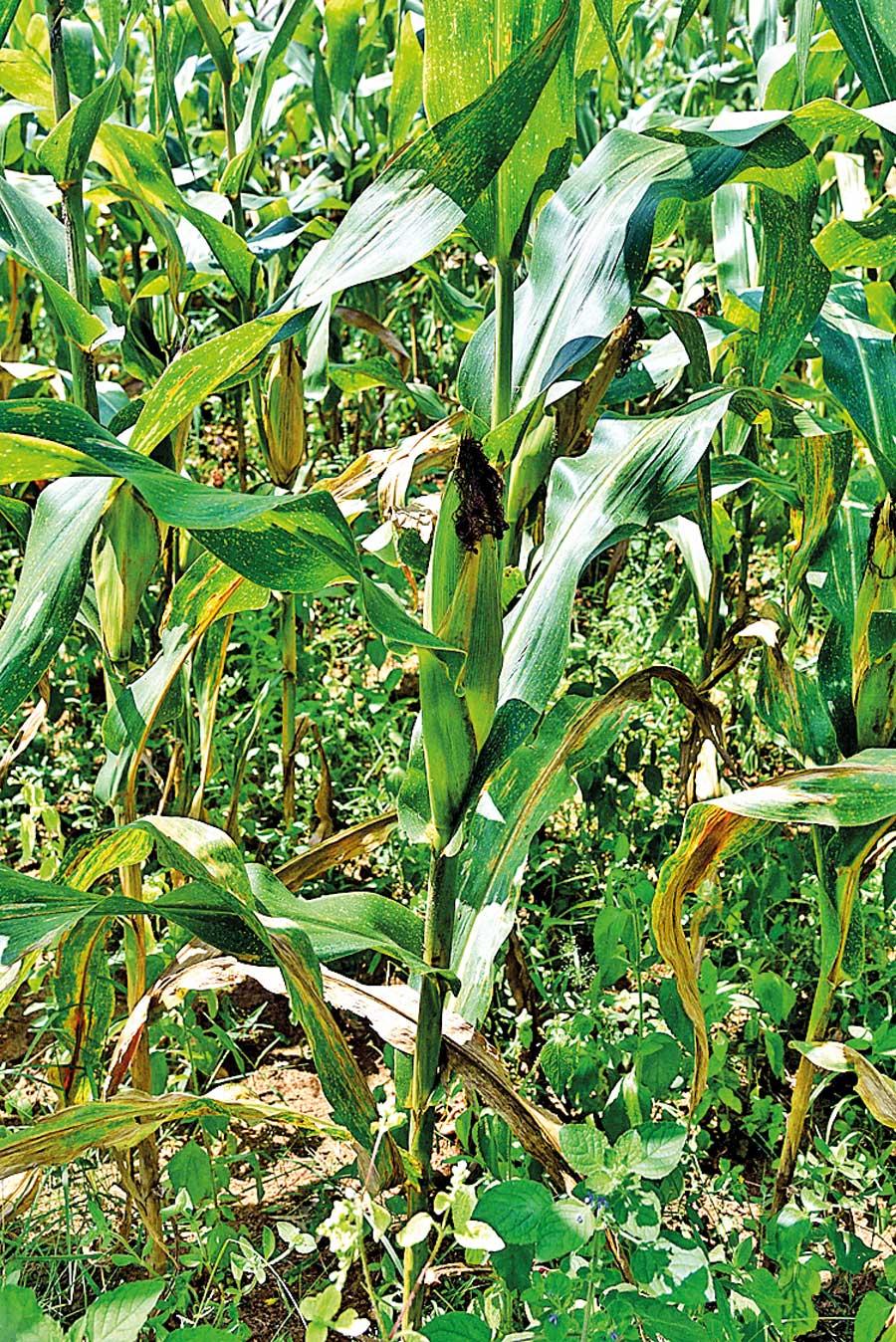
Farming done on a plot of land using carbanic fertilizer
 ]]>
]]>
Workers are seen engaged in the process of making carbonic fertilizer
(Pic by Samantha Perera)
- Managing high costs in agriculture can be achieved if the authorities have a system of empowering village farmers’ associations
- There is a lack of collaboration with farmers’ associations or skilled farmers in finding solutions to agriculture related problems
- Currently, agricultural products in our country lack a recognized source, given the absence of producers
- So far, local fertilizer manufacturers have produced local granular fertilizers and met international standards using modern technology
This article is based on a discussion with Ajith Randunu, former Executive Officer of the Ministry of Agriculture and an employee of the private sector, who also served as the Managing Director of Green Force Agriculture Private Limited, about the changes that need to be made to ensure agriculture progresses in this country by using new technology and knowledge; not forgetting the challenges Sri Lanka also faces in this sector.
private sector, who also served as the Managing Director of Green Force Agriculture Private Limited, about the changes that need to be made to ensure agriculture progresses in this country by using new technology and knowledge; not forgetting the challenges Sri Lanka also faces in this sector.
When it is time to harvest paddy, the farmer has to bear high costs. Even though paddy cultivation doesn’t cost much, the farmer cannot bear the cost of harvesting. “Consequently, the farmer, who harvests his crop, does not have time to dry the paddy. Additionally, the farmer has to pay off existing loans by selling the wet paddy at a low price. This is how much the farmer is burdened with in terms of debt. In the end, the farmer is left with 50,000 rupees or less. From that amount, the farmers have to sustain themselves for six months until the next season arrives,” said Randunu.
According to Randunu due to this issue, about 1.5 million paddy farmers in this country have become slaves in their fields. Many problems have to be faced in farming such as damage by wild elephants, problems associated with water, menaces caused by insects and the purchase of fertilizer and agrochemicals. Consequently, sometimes, the farmer has no other option, but to go into debt due to high costs incurred in engaging in agriculture.
It is possible to manage these high costs. For that, a system of empowering the village farmers’ associations should be implemented. A programme is planned to be implemented starting from the upcoming Yala season. In this programme, the farmer will be able to harvest the paddy by providing one hundred kilos of paddy as payment; resulting in a cost that is only 50 percent of the current expenditure on paddy harvesting. This approach can similarly be applied to plowing fields.
 Many people express their views on integrated pest management in this country, but there is no focus on integrated plant management. Some people mistakenly believe that the organic programme is an initiative by President Gotabaya Rajapaksa; however, organic farming has a historical foundation spanning hundreds of thousands of years. Presently, debating whether it is organic or chemical holds little significance. The focus should be on conserving available funds and prioritizing local resources. Fertilizers are now subject to taxation due to tax reforms implemented during a period of instability in the country. “Due to the war in Ukraine, potassium is not imported. Therefore, what we need to do now is to obtain essential resources and employ other inputs in an integrated manner; moving towards an integrated plant nutrient management. Strategies such as creating polytunnels, using nets to control pests, implementing effective cultivation practices, adopting Kem healing practices, using high-quality seeds, and using local medicines are all viable options. If, despite these efforts, the crop remains prone to insect damage and diseases, the use of chemical insecticides can be considered only when necessary. This is a measure that can be implemented with a plan,” explained Randunu.
Many people express their views on integrated pest management in this country, but there is no focus on integrated plant management. Some people mistakenly believe that the organic programme is an initiative by President Gotabaya Rajapaksa; however, organic farming has a historical foundation spanning hundreds of thousands of years. Presently, debating whether it is organic or chemical holds little significance. The focus should be on conserving available funds and prioritizing local resources. Fertilizers are now subject to taxation due to tax reforms implemented during a period of instability in the country. “Due to the war in Ukraine, potassium is not imported. Therefore, what we need to do now is to obtain essential resources and employ other inputs in an integrated manner; moving towards an integrated plant nutrient management. Strategies such as creating polytunnels, using nets to control pests, implementing effective cultivation practices, adopting Kem healing practices, using high-quality seeds, and using local medicines are all viable options. If, despite these efforts, the crop remains prone to insect damage and diseases, the use of chemical insecticides can be considered only when necessary. This is a measure that can be implemented with a plan,” explained Randunu.
“If a field that has used 100 percent urea is damaged by a Leafhopper infestation, that field can be destroyed within two days. However, with integrated plant management, more than 50 percent of that damage can be avoided. Although organic farming is a politically unsuccessful ideology, it proves more effective when properly planned. This system is associated with liquid manure, solid manure and animal husbandry. Today, aside from officials seeking answers to this question, there is a lack of collaboration with farmers’ associations or skilled farmers in finding solutions. Consequently, it can be observed that the agriculture of our country is stagnating,” he added.

A plot of land cultivated using carbonic fetilizer
Income generating opportunity missed
“To control the prices, officials opted to import eggs from India. However, a more effective approach would have been to support Samurdhi and Aswasuma beneficiaries or the youth in villages to venture into poultry farming as a form of self-employment, rather than spending dollars on importing eggs. By distributing at least 10 backyard chickens among families, it would have been possible to obtain eggs within 4 months, thus creating an opportunity for income generation. This could be achieved without the need to spend money on hormones and vitamins, as the traditional method of raising chickens with small broken flakes of rice, paddy husks, spoiled vegetables, and fruits would suffice. If implemented, this strategy could prevent a drastic rise in egg prices, an egg mafia, and the necessity to import eggs from India,” he said.
According to Randunu, Sri Lanka lacks proper post-harvest management, leading to severe damage to fruits and vegetables. Despite the past increase in vegetable prices, much of the produce had to be discarded due to the absence of post-harvest management. “Currently, agricultural products in our country lack a recognized source, given the absence of producers. Every agricultural product in the country should have an associated producer. For instance, if there is a rice producer, they should address any issues related to rice production. The absence of producers means that any problem affecting rice, for instance, has a widespread impact on Sri Lankan rice. There is no one to take responsibility for the problems associated with agricultural products. To address this issue, it is essential for every vegetable and fruit to have a producer. This ensures the ability to distinguish between good and inferior products. Consequently, the producer is consistently prepared to introduce its products to the market in an exceptional manner. We need to focus on post-harvest management. A system was developed to pack fruits and vegetables in plastic boxes for market distribution, which proved successful. This initiative faced protests, leading to its discontinuation,” he said.
In the past, Sri Lanka prepared green papaya as a curry in villages. “While this curry is not commonly consumed nowadays, Sri Lanka has managed to export thousands of tons of this product to the Dubai market under the name ‘Curry Papaya’. We need to shift to export agriculture through such methods. Presently, urban residents, let alone rural residents, are reluctant to purchase jackfruit from the market. We only buy jackfruit bulbs. An excellent illustration of effective post-harvest technology is the method that allows consumers to buy the desired amount of jackfruit bulbs instead of an entire jackfruit. If farmers’ organizations produce rice and bring it to the market, many people will be tempted to buy it, providing support to these farmers. The government should consider implementing such a system, offering assistance through options like low-interest loans or other methods to help farmers’ organizations establish the necessary infrastructure. The government currently lacks such a plan,” he said.
With the shortage of dollars, many private companies received the opportunity to import fertilizer; resulting in a sufficient supply of fertilizer to Sri Lanka. Consequently, the price of fertilizers decreased. Despite the imposition of taxes on fertilizers, farmers have been able to procure them at a lower cost; even considering the increased and taxed prices. This proved advantageous for the farmers. However, recent reports indicate plans to establish a fertilizer monopoly. “Instead of allowing all companies to import fertilizer, it has been decided to restrict the process to a few selected companies. This approach mirrors the situation with rice, where a monopoly exists among a few individuals, raising concerns that the import of fertilizer may similarly fall into the hands of a select few, inevitably leading to a monopoly,” said Randunu.
So far, local fertilizer manufacturers have produced local granular fertilizers and met international standards using modern technology. “They have successfully developed granular fertilizers that can be applied to crops through drone technology. Applying urea to every crop is useless. The country possesses the capability to produce various local fertilizers tailored to specific crops using new technology, marking a positive trend.
“There is a revival in the agriculture sector in this country. However, the capacity to manage the harvest remains low. Harvest management has been undertaken to some extent by cultivators and entrepreneurs in the field. Entrepreneurs from this country have exported TJC mangoes, Ambul bananas (known as “baby bananas”) from Rajanganaya, and agarwood crops. The government has taken no action in this regard. Presently, the youth are spearheading new initiatives in agriculture, moving towards innovative agro-technical knowledge. Rural lands continue to diminish, as it is being subdivided among children. This makes them unable to cultivate substantial acreages. It is crucial to implement plans, focusing on utilizing the flat house system in villages and the land in rural areas for cultivation. Some individuals own estates in their names without engaging in proper maintenance. If 2000 coconuts are expected from an acre, now only 200 coconuts are taken from those plantations. Hence, there is a need for systematic planning and organising to address these issues effectively,” he said.
There are entrepreneurs in the agricultural sector who are actively using new technology. “The government should establish a reliable policy framework to support them. Currently, the cost to dry and store a kilo of wet paddy is 3.50 rupees. Many farmers lack the financial capacity to store their rice at this cost. The Paddy Marketing Board incurs losses for each kilo of paddy it buys, negatively impacting the national income. Since rice storage is not feasible, it often ends up as animal feed. Private traders, taking advantage of bank overdrafts, purchase the rice; proving profitable for both the traders and the government. If the government can adopt a specific approach in dealing with these traders, there is potential to achieve more significant outcomes,” he said.
“If a field that has used 100 percent urea is damaged by a Leafhopper infestation, that field can be destroyed within two days. However, with integrated plant management, more than 50 percent of that damage can be avoided. Although organic farming is a politically unsuccessful ideology, it proves more effective when properly planned”
There is a revival in the agriculture sector in this country. However, the capacity to manage the harvest remains low. Harvest management has been undertaken to some extent by cultivators and entrepreneurs in the field. Entrepreneurs from this country have exported TJC mangoes, Ambul bananas (known as “baby bananas”) from Rajanganaya, and agarwood crops. The government has taken no action in this regard”
- Ajith Randunu
former Executive Officer of the Ministry of Agriculture
“Due to the extensive use of pesticides on vegetables and fruits in this country, the exportation of approximately 250 types of vegetables and fruits has become unthinkable. This is primarily due to the excessive application of insecticides. The Plant Quarantine Act of 1976 binds us, prohibiting the transport of any harmful substance or organism between countries. Insecticides, if used, may be used excessively; however, if not used, there is a high risk of transmitting harmful insects to other countries. To address this, it is crucial to implement integrated crop and pest management from the beginning. Involving the youth community using new technology is essential. However, there is no such plan from the government in this regard. Consequently, the formulation of a national policy is imperative for agriculture in this country.
“It is recommended to apply four kilograms of APM, along with one kilogram of dolomite, one kilogram of Eppavala phosphate, 15 kilograms of manure, one kilogram of common salt, and one kilogram of MOP fertilizer to a fruit-bearing coconut tree. However, officials have neglected informing the public regarding these recommendations. They say that coconuts exclusively require APM fertilizers and endorse the use of fertilizers from specific brands. Bragging about agriculture proves fruitless; practical demonstrations of these methods are imperative. I have personally experimented with these recommendations and attained positive results,” he said.
Calcium in this country can be processed into calcium nitrate and calcium liquid. Dolomite can be used to make Chrysonite. “It is possible to hybridize organic granules with Eppavala phosphate and other fillers, and we have already initiated the production of these products. These are endeavours any entrepreneur should pursue. Becoming a fertilizer producer involves more than just having money and a warehouse. We have invested significant funds in fertilizers that could be obtained from trees. Nevertheless, we can locally manufacture the same fertilizers imported from abroad in Sri Lanka,” he explained.
Many graduates are assigned to Divisional Secretariats without clear responsibilities. “Promising assistance, the government should conduct a comprehensive study of all the shops in the economic centers. This study should include an analysis of the types of vegetables available, their pricing variations, the clustering of similar vegetables, and the seasonal crops cultivated by farmers. The examination should offer insights into identifying the optimal vegetables for cultivation; pinpointing more profitable crops for each season, discovering diverse types of vegetables that farmers should cultivate, avoiding the repetition of the same vegetables, and addressing issues such as wastage. Furthermore, an understanding about vegetable distribution to hospitals, railways, the army and other government institutions could also be obtained. An application can be developed for this, implementing a new system similar to those in other countries,” he added.
Agriculture experts observe that talented young graduates have the potential to excel as farmers or entrepreneurs. “In our country, numerous government agencies related to agriculture are operating, equipped with a substantial number of officers. However, if the sole responsibility assigned to the Agricultural Research and Production Assistant Officer is merely to sign the fertilizer register, it renders their role ineffective. These officers should be deployed in the field, directing them to oversee 200-300 farming families. By systematically gathering information from these villages into a database, the specific needs of farmers can be accurately identified,” Randunu explained.
The Fertilizer Secretariat gives details of the required amount of fertilizer for a year or a season in Sri Lanka. “If a fertilizer quota can be announced, a seed quota should also be announced. However, no official has made such a statement. Among the seeds previously imported to our country were carrot seeds, knolkhol seeds and cabbage seeds, and this was done considering foreign vegetables. Currently, snake gourd and okra seeds are also being imported. Graduates can be assigned to economic centres nationwide to gather this information, and this will cost nothing to the government. If data can be obtained in that manner for a year, a comprehensive data system would be established. If the government lays a solid foundation for this initiative, the future of agriculture in the country can be secured; otherwise, people of this country will withdraw from agriculture,” Randunu concluded.

Farming done on a plot of land using carbanic fertilizer
 ]]>
]]>
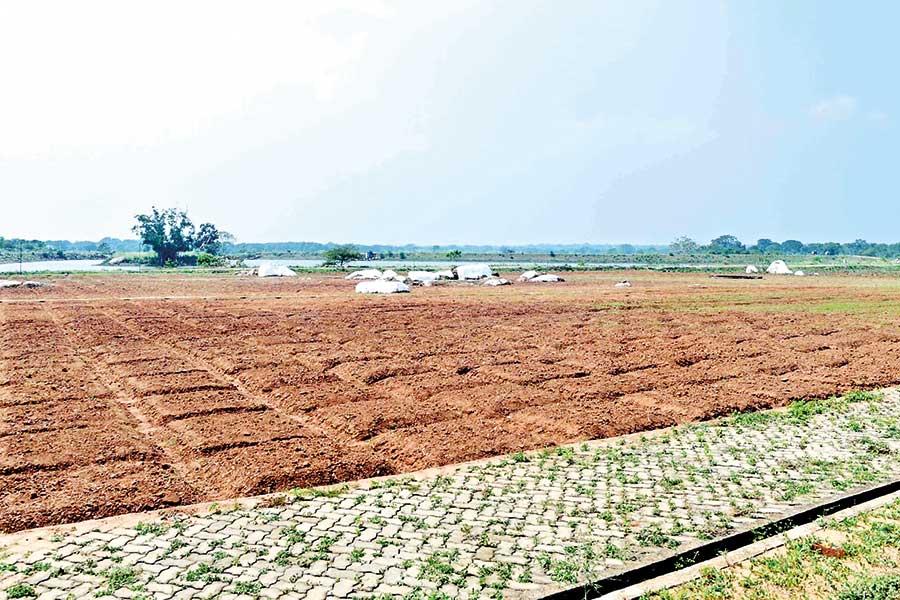
A plot of land being prepared for aloe vera cultivation in the controversial 18 area colony
(pix by Samantha Perera)
- There are concerns about plans to start a large-scale aloe vera plantation in Rajanganaya Yaya ‘18 area’ which endeavour environmental organizations point out would be a threat to the buffer zone of Wilpattu
- Recent developments in planning for the project now question the ownership of the lands of original settlers in the ‘18 area’
There have been allegations for about six years that Aura Lanka Herbals (PVT) Ltd is preparing for a large-scale aloe plantation in the Rajanganaya Yaya ‘18 area’ by destroying the buffer zone of Wilpattu National Park. This accusation has been made by environmental organizations as well as the Department of Wildlife Conservation (DWC). Surakimu Sri Lanka President Pahiyangala Ananda Sagara Thera has also alleged that Viranjith Thambugala, Managing Director of Aura Lanka (PVT) Ltd, intends to acquire 125,000 acres in the Anuradhapura district under the guise of having an aloe vera plantation. Leave aside the intended cultivation of aloe vera there remains a serious concern regarding the rightful ownership of the lands in the ‘18 area’ for the local populace.
zone of Wilpattu National Park. This accusation has been made by environmental organizations as well as the Department of Wildlife Conservation (DWC). Surakimu Sri Lanka President Pahiyangala Ananda Sagara Thera has also alleged that Viranjith Thambugala, Managing Director of Aura Lanka (PVT) Ltd, intends to acquire 125,000 acres in the Anuradhapura district under the guise of having an aloe vera plantation. Leave aside the intended cultivation of aloe vera there remains a serious concern regarding the rightful ownership of the lands in the ‘18 area’ for the local populace.
Colonization scheme in Rajanganaya
The Rajanganaya ‘18 area’ colonization scheme began in the 1960s, centred around the Rajanganaya reservoir. Former Prime Minister Sirima Bandaranaike formulated the plans for it. Initially, this colonization scheme aimed to supply rice, vegetables, and fruits to the local market under the name of Rajanganaya. However, this objective has not been realised as expected. Despite this past, Aura Lanka (PVT) Ltd is currently planning to cultivate aloe vera in the ‘18 area’ colony. Reports indicate that this aloe vera plantation is in the Wilpattu buffer zone, and licences for lands- where cultivation is to take place- have been granted to beneficiaries san the approval of the DWC.
“Around 1980, the old wildlife office was located approximately 2 km from its current location, close to where the Wilpattu National Park stands. We were given lands and we cultivated in the buffer zone. The old wildlife office was situated on the opposite side of Kala Oya, in an area known as ‘Ali Wadiya’. Adjacent to this area is called the ‘Bawum Mayima’, beyond which lies the boundary of Wilpattu. ‘Bawuma’ marks the point where the Wilpattu boundary and the buffer zone diverge. “Roads were constructed to facilitate vehicular access to this area. During the rainy season, when the water level in Kala Oya rises, wildlife officers found it difficult to cross the canal. My father constructed a hut at the end of our land to provide temporary accommodation for wildlife officers. Locals commonly called this hut the ‘game hut’ because it was where captured game meat was held. After we settled in ‘18 area’ we cultivated and the land we farmed on for 40 years remains to this day. Some landowners have permits while others do not. The address is given as ‘18 area’, Kalaoya, Rajanganaya,” Lasantha Ilukwaththa, one of the original residents of ‘18 area’ village, said during a conversation with this newspaper.
After we settled in ‘18 area’ we cultivated and the land we farmed on for 40 years remains to this day. Some landowners have permits while others do not. The address is given as ‘18 area’, Kalaoya, Rajanganaya
- Lasantha Ilukwaththa, one of the original residents of ‘18 area’ village
“Wildlife officers came to our lands and erected a hut, followed by a sign prohibiting entry into the park. Now, the Department of Wildlife Conservation claims that the area belongs to the buffer zone; extending up to 1.6 km from the location of their new office. The boundaries they currently present are incorrect. By adjusting the old boundaries and conducting accurate measurements, the truth of this matter can be revealed. Around 100 families were settled at that time in ’18 area’. During the war, one family from the village was killed. Many people left the old village and resettled in the present lands, which are government-owned. About 2 kilometres towards the forest from the current DWC office, you find the ‘Bawum Mayima’. Beyond that is the Wilpattu boundary. The old wildlife office was situated near ‘Ali Wadiya’. We were allocated land in the buffer zone. Letters submitted to the Grama Niladhari officer in 1990 requesting licences by individuals, who did not have land licences, for the areas we inhabit today, still exist. My father (I. Dharmasena) is well acquainted with this story. He is now 73 years old. During that time, we learned English from Liyanage, who was an officer of the DWC,” he added.
 “Below the Kahambiliyapitiya Wewa there are paddy fields that were formerly cultivated using water from the Rajaganaya reservoir. Initially, we had an ample supply of water. However, problems arose with the canals, resulting in water scarcity, which made people choose chena cultivation. Even today, water is obtained from the Rajanganaya reservoir to supply the Wewa. Canals were dug, culverts were built, and coconut trees were planted during that time; these assets still exist today. We continue to utilise our lands within the buffer zone, cultivating turmeric and lemongrass. However, the DWC authorities have now established a new buffer zone without mentioning the original boundaries, for their convenience, claiming it as government land,” Ilukwaththa said adding that they have evidence to refute this claim.
“Below the Kahambiliyapitiya Wewa there are paddy fields that were formerly cultivated using water from the Rajaganaya reservoir. Initially, we had an ample supply of water. However, problems arose with the canals, resulting in water scarcity, which made people choose chena cultivation. Even today, water is obtained from the Rajanganaya reservoir to supply the Wewa. Canals were dug, culverts were built, and coconut trees were planted during that time; these assets still exist today. We continue to utilise our lands within the buffer zone, cultivating turmeric and lemongrass. However, the DWC authorities have now established a new buffer zone without mentioning the original boundaries, for their convenience, claiming it as government land,” Ilukwaththa said adding that they have evidence to refute this claim.
The Daily Mirror then consulted Rajanganaya Divisional Secretary Upali Rajapaksa regarding this issue. He said, “I have recently assumed duties, but the allocation of these lands and the commencement of aloe vera cultivation began around six years ago. I have discussed this issue with the Grama Niladhari officer and it has been confirmed that licences for these lands were issued legally following proper legal procedures, and after conducting Land Kachcheris. I requested the Department of Wildlife and Conservation officers to show their boundaries. However, they have stated that they cannot provide this information due to an ongoing legal issue. I am seeking clarification on whether these licences were granted within the wildlife zone and if aloe vera cultivation was permitted in the wildlife reserve. I have previously inquired with the Department of Wildlife Conservation regarding this matter, but a proper response wasn’t provided. Aloe vera cultivation is presently being carried out on licenced lands only; no cultivation is being done on lands without a licence. Farmers are engaged in aloe vera cultivation. We need to know the boundaries of the buffer zone. This issue will be solved if there is an accurate demarcation of the buffer zone boundary by the Department of Wildlife Conservation authorities. The Grama Niladhari officer has also pointed out that the buffer zone boundaries have been brought forward by the Department of Wildlife Conservation,” said Rajapaksa.
I have never acquired any land belonging to the Wilpattu National Park or its buffer zone. Aloe plants have not been planted within any wildlife reserve under my direction. My involvement was reaching agreements with farmers in the ‘18 area’ farming colony to cultivate aloe vera on their lands”
-Viranjith Thambugala, Managing Director, Aura Lanka (PVT) Ltd
The divisional secretary can issue licences for plots of land within a buffer zone. However, any development work requires the approval of DWC authorities. DWC officials claim that development work has been undertaken without their permission. “Nevertheless, permission wasn’t sought because the area designated for aloe vera cultivation in ‘18 area’ does not fall under the jurisdiction of DWC. No licences have been issued for lands below the KahambiliapitiyaWewa. However, some farmers have been cultivating that area for 40 years. Department of Wildlife Conservation authorities say that these fields are within the reserve zone. If they obtain a court order to revoke licences issued for buffer zone lands, we can revoke those licences. However, Department of Wildlife Conservation authorities must demonstrate that the licences issued pertain to lands within the reserved area. Furthermore, if the aloe vera plantation is within the buffer zone, wildlife authorities should clearly show the boundaries. This aloe vera cultivation is not an individual project; farmers have only prepared their land. The trees that were there were legally felled in 2018, as confirmed by the Grama Niladhari official. Therefore, it is on the authorities of the Department of Wildlife Conservation to demarcate boundaries and clarify whether the area is within the reserve or not. Our land officers say that the lands granted are not inside the buffer zone, but from government land situated outside. Consequently, we don’t require special permission from Department of Wildlife Conservation authorities when issuing land licences,” Rajapaksa said.
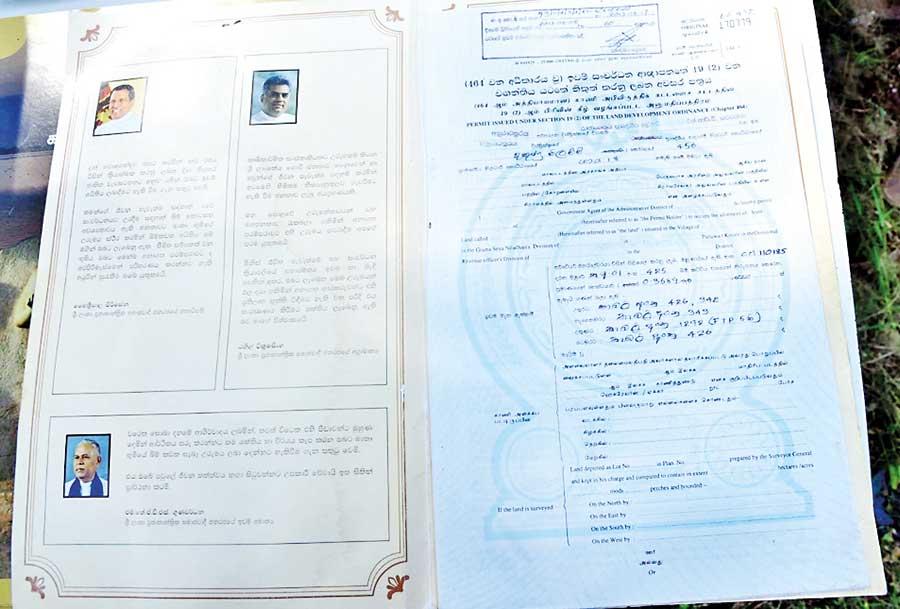
A deed for a land provided in the year 2015
No permission for cultivation
When this newspaper approached Anuradhapura Wildlife Assistant Director W.M.K.S. Chandraratne, he provided the following response: “The 18 area village falls within the wildlife buffer zone, where aloe vera cultivation is taking place. The boundary of the wildlife reserve is near the Kala Oya, with the buffer zone extending 1.6 km from this point. Any development within the reserve requires special permission from the wildlife authorities, accompanied by environmental impact assessments and other necessary approvals. Currently, an aloe vera cultivation is being undertaken without obtaining permission from the Department of Wildlife Conservation, prompting legal action under the fauna and flora Ordinance. However, if proper approval is sought beforehand, we are open to considering such projects. The Rajanganaya Divisional Secretary has issued land licences to farmers in ‘18 area’ without seeking permission from the Department of Wildlife Conservation during the distribution process despite holding Land Kachcheri. Thambugala has failed to obtain permission from the Agrarian Development Department or the Irrigation Department for the construction of Kahambiliapitiya Wewa. Farmers have been allowed to engage in paddy and chena cultivation within the reserve for a long time and these activities continue to this day. The law related to Wildlife Buffer Zone was enacted in the 1990s, stipulating that development may be permitted within the buffer zone provided it does not cause significant environmental harm. This situation arose because aloe vera cultivation was carried out without obtaining approval from us. Once this legal matter is resolved, if a formal request is submitted and there is no significant environmental impact, permission can be considered. The fauna and flora ordinance holds considerable weight in such cases. If these lands fall within the wildlife buffer zone and environmental damage occurs due to the issued licences, the Department of Wildlife Conservation authorities have the authority to revoke those licences,” he added.
This newspaper also consulted Sampath Samarajeeva, Engineer in charge of the Rajanganaya Reservoir in the Irrigation Department. Samarajeeva stated the following: “When establishing a colonization scheme, permission is sought, and government lands, wildlife lands, and forest conservation lands are released for development of canals and dams. The ‘18 area’ village was established with such permission; which is why farmers cultivated fields and chena within the reserve and its buffer zone. However, due to the stringent regulations of the Fauna and Flora Ordinance, the boundaries were later revised, and maybe it was said that these lands fall under the jurisdiction of Department of Wildlife Conservation authorities. If Department of Wildlife Conservation demands the return of lands currently cultivated by our farmers within the buffer zone, we would be obliged to vacate both cultivation and residential lands within the Wilpattu Reserve. Following the establishment of the Rajanganaya ‘18 area’ colonization scheme, there was insufficient water to support cultivation during both seasons. Consequently, farmers alternated between cultivating paddy fields and practising chena cultivation with rainwater. Some individuals relocated from these areas, resulting in certain lands being left fallow, which could potentially be designated as protected areas by wildlife authorities later. However, if wildlife authorities claim ownership of these lands and refuse to release them, the residents of the ‘18 area’ colony will be compelled to vacate the Wilpattu Reserve lands. In such circumstances, the Irrigation Department will intervene to support the farmers. This is not an issue where institutions should act separately. This issue needs collaboration among all government institutions to find solutions,” Samarajeeva added.
Anura Ramanayake, Director Anuradhapura office, Central Environment Authority, made the following statement during an inquiry: “We have not received any requests to initiate an aloe vera project. If it is a project, a report detailing the project’s scope, methodology and cost must be submitted. However, if it involves individual cultivation with farmers, our permission is not required. Permission from our authority is only necessary for formal projects. Should such a request be made, it will be duly considered. We have advised Thambugala to treat aloe vera cultivation as a project and to provide a detailed project report. Individual collaboration among farmers does not make a project,” said Ramanayake.
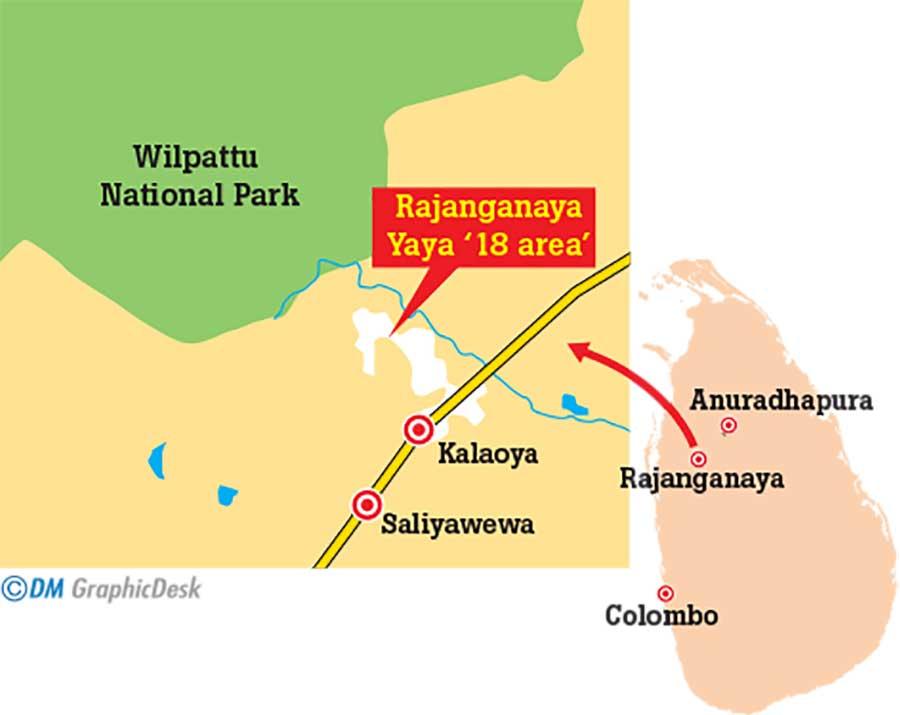
“I have only been granted 6 acres to set up a factory”- Thambugala
 This writer then made queries from the Aura Lanka Managing Director Viranjith Thambugala, regarding this matter. He provided the following response: “I have never acquired any land belonging to the Wilpattu National Park or its buffer zone. Aloe plants have not been planted within any wildlife reserve under my direction. My involvement was reaching agreements with farmers in the ‘18 area’ farming colony to cultivate aloe vera on their lands. I have facilitated the necessary infrastructure for aloe vera cultivation on these farmers’ lands with licences and deeds through agreements with Aura Lanka Herbal (PVT) Ltd.
This writer then made queries from the Aura Lanka Managing Director Viranjith Thambugala, regarding this matter. He provided the following response: “I have never acquired any land belonging to the Wilpattu National Park or its buffer zone. Aloe plants have not been planted within any wildlife reserve under my direction. My involvement was reaching agreements with farmers in the ‘18 area’ farming colony to cultivate aloe vera on their lands. I have facilitated the necessary infrastructure for aloe vera cultivation on these farmers’ lands with licences and deeds through agreements with Aura Lanka Herbal (PVT) Ltd.
“The plan was for Aura Lanka Herbal (PVTP Ltd to purchase harvested aloe vera plants and manufacture herbal products through a production process. This project aimed to contribute to the country’s revenue by generating dollars. There were ambitions to create thousands of direct and indirect job opportunities, from aloe cultivation to factory employment. However, all these plans were halted due to issues surrounding the Wilpattu buffer zone. Up to now, no land within a government reserve without proper licences or deeds has been cleared. Individuals, who farmed using lift irrigation and rainwater since the establishment of the ‘18 area’ colonization scheme, abandoned their lands. My involvement has been in initiating commercial cultivation on these abandoned lands. This initiative aims to uplift the local economy and strengthen the country’s economy. All it required was the participation of farmers within this area in aloe cultivation.
“Many accuse me of attempting to acquire 125,000 acres in Anuradhapura district, which is incorrect. I have only requested 66 acres for now. This is evidenced by Cabinet Memorandum No. MF/LA/07/CM/2021/162 dated 08-27-2021, issued through the Ministry of Finance. Despite my request for 66 acres, I have only been granted 6 acres to set up a factory for manufacturing aloe vera products; subject to approval under certain conditions. However, due to the current situation, work on the factory has been halted, and the allocated 6 acres remain undeveloped.
“I renovated the Kahabiliapitiya Wewa using my personal funds. As a result, farmers have been able to work their fields. The Department of Wildlife Conservation had a plant to build an anicut across the Panankadu canal and I attempted to construct it at my own expense. However, the Department of Wildlife Conservation authorities initiated legal action against me, claiming that it was in the Wilpattu buffer zone. Furthermore, legal proceedings have been initiated against me for providing a backhoe to a farmer to develop a field within the reserve. Apart from these instances, no legal action has been taken to halt aloe vera cultivation.
“If my aloe vera cultivation activities are within the Wilpattu Reserve buffer zone and if I am engaged in a wrongdoing, please let me know. If these lands, allocated to farmers by the government, are part of a wildlife reserve, a survey should be conducted to verify this claim. If I am found to be in violation of any regulations, the authorities should put a halt to this cultivation or inform us about the proper procedure. Then we can carry out these activities legally. We have obtained approval from all relevant institutions required for each of our cultivations,” said Thambugala.
R.M.P. Senaratne and E.A.S. Edirisinghe from the ‘18 area’ village, who have leased their land for the aloe vera cultivation, said that they had entered into agreements with Aura Lanka Herbal (PVT) Ltd voluntarily. These individuals, residing in ‘18 area’ village for 40-60 years, claim to have settled on lands allocated by the government. They say that they have licences and deeds given by various governments that came into power. They explain that due to insufficient income from agriculture, they opted for aloe vera cultivation under agreements with Aura Lanka, (PVTP Ltd with compensation being provided for the use of land. However, they now face a major issue regarding land ownership, as the Department of Wildlife Conservation authorities claim that their settlement falls within the Wilpattu buffer zone. Currently, around 500 families reside within ‘18 area’ village, and they urge the President and relevant authorities to validate their land ownership rights.
Thambugala is a businessman who has undertaken this project with the expectation of long-term profitability. However, given the current precarious situation, he has not given assurance that he will not abandon the aloe vera cultivation project. If the Department of Wildlife Conservation exercises its authority under the ordinance to revoke licences and reclaim these lands, the 500 families of ‘18 area’ stand to lose their livelihoods. While the Irrigation Department claims to support farmers in such circumstances, there is no guarantee of a permanent solution. Against this backdrop, ‘18 area’ farmers may be compelled to leave their homes, resulting in the disappearance of ‘18 area’ colony from the island’s map. It is the responsibility of every responsible government authority to secure the land rights of these farmers to prevent such an unfortunate outcome, ensuring the protection of Wilpattu National Park and its buffer zone.
 ]]>
]]>
A plot of land being prepared for aloe vera cultivation in the controversial 18 area colony
(pix by Samantha Perera)
- There are concerns about plans to start a large-scale aloe vera plantation in Rajanganaya Yaya ‘18 area’ which endeavour environmental organizations point out would be a threat to the buffer zone of Wilpattu
- Recent developments in planning for the project now question the ownership of the lands of original settlers in the ‘18 area’
There have been allegations for about six years that Aura Lanka Herbals (PVT) Ltd is preparing for a large-scale aloe plantation in the Rajanganaya Yaya ‘18 area’ by destroying the buffer zone of Wilpattu National Park. This accusation has been made by environmental organizations as well as the Department of Wildlife Conservation (DWC). Surakimu Sri Lanka President Pahiyangala Ananda Sagara Thera has also alleged that Viranjith Thambugala, Managing Director of Aura Lanka (PVT) Ltd, intends to acquire 125,000 acres in the Anuradhapura district under the guise of having an aloe vera plantation. Leave aside the intended cultivation of aloe vera there remains a serious concern regarding the rightful ownership of the lands in the ‘18 area’ for the local populace.
zone of Wilpattu National Park. This accusation has been made by environmental organizations as well as the Department of Wildlife Conservation (DWC). Surakimu Sri Lanka President Pahiyangala Ananda Sagara Thera has also alleged that Viranjith Thambugala, Managing Director of Aura Lanka (PVT) Ltd, intends to acquire 125,000 acres in the Anuradhapura district under the guise of having an aloe vera plantation. Leave aside the intended cultivation of aloe vera there remains a serious concern regarding the rightful ownership of the lands in the ‘18 area’ for the local populace.
Colonization scheme in Rajanganaya
The Rajanganaya ‘18 area’ colonization scheme began in the 1960s, centred around the Rajanganaya reservoir. Former Prime Minister Sirima Bandaranaike formulated the plans for it. Initially, this colonization scheme aimed to supply rice, vegetables, and fruits to the local market under the name of Rajanganaya. However, this objective has not been realised as expected. Despite this past, Aura Lanka (PVT) Ltd is currently planning to cultivate aloe vera in the ‘18 area’ colony. Reports indicate that this aloe vera plantation is in the Wilpattu buffer zone, and licences for lands- where cultivation is to take place- have been granted to beneficiaries san the approval of the DWC.
“Around 1980, the old wildlife office was located approximately 2 km from its current location, close to where the Wilpattu National Park stands. We were given lands and we cultivated in the buffer zone. The old wildlife office was situated on the opposite side of Kala Oya, in an area known as ‘Ali Wadiya’. Adjacent to this area is called the ‘Bawum Mayima’, beyond which lies the boundary of Wilpattu. ‘Bawuma’ marks the point where the Wilpattu boundary and the buffer zone diverge. “Roads were constructed to facilitate vehicular access to this area. During the rainy season, when the water level in Kala Oya rises, wildlife officers found it difficult to cross the canal. My father constructed a hut at the end of our land to provide temporary accommodation for wildlife officers. Locals commonly called this hut the ‘game hut’ because it was where captured game meat was held. After we settled in ‘18 area’ we cultivated and the land we farmed on for 40 years remains to this day. Some landowners have permits while others do not. The address is given as ‘18 area’, Kalaoya, Rajanganaya,” Lasantha Ilukwaththa, one of the original residents of ‘18 area’ village, said during a conversation with this newspaper.
After we settled in ‘18 area’ we cultivated and the land we farmed on for 40 years remains to this day. Some landowners have permits while others do not. The address is given as ‘18 area’, Kalaoya, Rajanganaya
- Lasantha Ilukwaththa, one of the original residents of ‘18 area’ village
“Wildlife officers came to our lands and erected a hut, followed by a sign prohibiting entry into the park. Now, the Department of Wildlife Conservation claims that the area belongs to the buffer zone; extending up to 1.6 km from the location of their new office. The boundaries they currently present are incorrect. By adjusting the old boundaries and conducting accurate measurements, the truth of this matter can be revealed. Around 100 families were settled at that time in ’18 area’. During the war, one family from the village was killed. Many people left the old village and resettled in the present lands, which are government-owned. About 2 kilometres towards the forest from the current DWC office, you find the ‘Bawum Mayima’. Beyond that is the Wilpattu boundary. The old wildlife office was situated near ‘Ali Wadiya’. We were allocated land in the buffer zone. Letters submitted to the Grama Niladhari officer in 1990 requesting licences by individuals, who did not have land licences, for the areas we inhabit today, still exist. My father (I. Dharmasena) is well acquainted with this story. He is now 73 years old. During that time, we learned English from Liyanage, who was an officer of the DWC,” he added.
 “Below the Kahambiliyapitiya Wewa there are paddy fields that were formerly cultivated using water from the Rajaganaya reservoir. Initially, we had an ample supply of water. However, problems arose with the canals, resulting in water scarcity, which made people choose chena cultivation. Even today, water is obtained from the Rajanganaya reservoir to supply the Wewa. Canals were dug, culverts were built, and coconut trees were planted during that time; these assets still exist today. We continue to utilise our lands within the buffer zone, cultivating turmeric and lemongrass. However, the DWC authorities have now established a new buffer zone without mentioning the original boundaries, for their convenience, claiming it as government land,” Ilukwaththa said adding that they have evidence to refute this claim.
“Below the Kahambiliyapitiya Wewa there are paddy fields that were formerly cultivated using water from the Rajaganaya reservoir. Initially, we had an ample supply of water. However, problems arose with the canals, resulting in water scarcity, which made people choose chena cultivation. Even today, water is obtained from the Rajanganaya reservoir to supply the Wewa. Canals were dug, culverts were built, and coconut trees were planted during that time; these assets still exist today. We continue to utilise our lands within the buffer zone, cultivating turmeric and lemongrass. However, the DWC authorities have now established a new buffer zone without mentioning the original boundaries, for their convenience, claiming it as government land,” Ilukwaththa said adding that they have evidence to refute this claim.
The Daily Mirror then consulted Rajanganaya Divisional Secretary Upali Rajapaksa regarding this issue. He said, “I have recently assumed duties, but the allocation of these lands and the commencement of aloe vera cultivation began around six years ago. I have discussed this issue with the Grama Niladhari officer and it has been confirmed that licences for these lands were issued legally following proper legal procedures, and after conducting Land Kachcheris. I requested the Department of Wildlife and Conservation officers to show their boundaries. However, they have stated that they cannot provide this information due to an ongoing legal issue. I am seeking clarification on whether these licences were granted within the wildlife zone and if aloe vera cultivation was permitted in the wildlife reserve. I have previously inquired with the Department of Wildlife Conservation regarding this matter, but a proper response wasn’t provided. Aloe vera cultivation is presently being carried out on licenced lands only; no cultivation is being done on lands without a licence. Farmers are engaged in aloe vera cultivation. We need to know the boundaries of the buffer zone. This issue will be solved if there is an accurate demarcation of the buffer zone boundary by the Department of Wildlife Conservation authorities. The Grama Niladhari officer has also pointed out that the buffer zone boundaries have been brought forward by the Department of Wildlife Conservation,” said Rajapaksa.
I have never acquired any land belonging to the Wilpattu National Park or its buffer zone. Aloe plants have not been planted within any wildlife reserve under my direction. My involvement was reaching agreements with farmers in the ‘18 area’ farming colony to cultivate aloe vera on their lands”
-Viranjith Thambugala, Managing Director, Aura Lanka (PVT) Ltd
The divisional secretary can issue licences for plots of land within a buffer zone. However, any development work requires the approval of DWC authorities. DWC officials claim that development work has been undertaken without their permission. “Nevertheless, permission wasn’t sought because the area designated for aloe vera cultivation in ‘18 area’ does not fall under the jurisdiction of DWC. No licences have been issued for lands below the KahambiliapitiyaWewa. However, some farmers have been cultivating that area for 40 years. Department of Wildlife Conservation authorities say that these fields are within the reserve zone. If they obtain a court order to revoke licences issued for buffer zone lands, we can revoke those licences. However, Department of Wildlife Conservation authorities must demonstrate that the licences issued pertain to lands within the reserved area. Furthermore, if the aloe vera plantation is within the buffer zone, wildlife authorities should clearly show the boundaries. This aloe vera cultivation is not an individual project; farmers have only prepared their land. The trees that were there were legally felled in 2018, as confirmed by the Grama Niladhari official. Therefore, it is on the authorities of the Department of Wildlife Conservation to demarcate boundaries and clarify whether the area is within the reserve or not. Our land officers say that the lands granted are not inside the buffer zone, but from government land situated outside. Consequently, we don’t require special permission from Department of Wildlife Conservation authorities when issuing land licences,” Rajapaksa said.

A deed for a land provided in the year 2015
No permission for cultivation
When this newspaper approached Anuradhapura Wildlife Assistant Director W.M.K.S. Chandraratne, he provided the following response: “The 18 area village falls within the wildlife buffer zone, where aloe vera cultivation is taking place. The boundary of the wildlife reserve is near the Kala Oya, with the buffer zone extending 1.6 km from this point. Any development within the reserve requires special permission from the wildlife authorities, accompanied by environmental impact assessments and other necessary approvals. Currently, an aloe vera cultivation is being undertaken without obtaining permission from the Department of Wildlife Conservation, prompting legal action under the fauna and flora Ordinance. However, if proper approval is sought beforehand, we are open to considering such projects. The Rajanganaya Divisional Secretary has issued land licences to farmers in ‘18 area’ without seeking permission from the Department of Wildlife Conservation during the distribution process despite holding Land Kachcheri. Thambugala has failed to obtain permission from the Agrarian Development Department or the Irrigation Department for the construction of Kahambiliapitiya Wewa. Farmers have been allowed to engage in paddy and chena cultivation within the reserve for a long time and these activities continue to this day. The law related to Wildlife Buffer Zone was enacted in the 1990s, stipulating that development may be permitted within the buffer zone provided it does not cause significant environmental harm. This situation arose because aloe vera cultivation was carried out without obtaining approval from us. Once this legal matter is resolved, if a formal request is submitted and there is no significant environmental impact, permission can be considered. The fauna and flora ordinance holds considerable weight in such cases. If these lands fall within the wildlife buffer zone and environmental damage occurs due to the issued licences, the Department of Wildlife Conservation authorities have the authority to revoke those licences,” he added.
This newspaper also consulted Sampath Samarajeeva, Engineer in charge of the Rajanganaya Reservoir in the Irrigation Department. Samarajeeva stated the following: “When establishing a colonization scheme, permission is sought, and government lands, wildlife lands, and forest conservation lands are released for development of canals and dams. The ‘18 area’ village was established with such permission; which is why farmers cultivated fields and chena within the reserve and its buffer zone. However, due to the stringent regulations of the Fauna and Flora Ordinance, the boundaries were later revised, and maybe it was said that these lands fall under the jurisdiction of Department of Wildlife Conservation authorities. If Department of Wildlife Conservation demands the return of lands currently cultivated by our farmers within the buffer zone, we would be obliged to vacate both cultivation and residential lands within the Wilpattu Reserve. Following the establishment of the Rajanganaya ‘18 area’ colonization scheme, there was insufficient water to support cultivation during both seasons. Consequently, farmers alternated between cultivating paddy fields and practising chena cultivation with rainwater. Some individuals relocated from these areas, resulting in certain lands being left fallow, which could potentially be designated as protected areas by wildlife authorities later. However, if wildlife authorities claim ownership of these lands and refuse to release them, the residents of the ‘18 area’ colony will be compelled to vacate the Wilpattu Reserve lands. In such circumstances, the Irrigation Department will intervene to support the farmers. This is not an issue where institutions should act separately. This issue needs collaboration among all government institutions to find solutions,” Samarajeeva added.
Anura Ramanayake, Director Anuradhapura office, Central Environment Authority, made the following statement during an inquiry: “We have not received any requests to initiate an aloe vera project. If it is a project, a report detailing the project’s scope, methodology and cost must be submitted. However, if it involves individual cultivation with farmers, our permission is not required. Permission from our authority is only necessary for formal projects. Should such a request be made, it will be duly considered. We have advised Thambugala to treat aloe vera cultivation as a project and to provide a detailed project report. Individual collaboration among farmers does not make a project,” said Ramanayake.

“I have only been granted 6 acres to set up a factory”- Thambugala
 This writer then made queries from the Aura Lanka Managing Director Viranjith Thambugala, regarding this matter. He provided the following response: “I have never acquired any land belonging to the Wilpattu National Park or its buffer zone. Aloe plants have not been planted within any wildlife reserve under my direction. My involvement was reaching agreements with farmers in the ‘18 area’ farming colony to cultivate aloe vera on their lands. I have facilitated the necessary infrastructure for aloe vera cultivation on these farmers’ lands with licences and deeds through agreements with Aura Lanka Herbal (PVT) Ltd.
This writer then made queries from the Aura Lanka Managing Director Viranjith Thambugala, regarding this matter. He provided the following response: “I have never acquired any land belonging to the Wilpattu National Park or its buffer zone. Aloe plants have not been planted within any wildlife reserve under my direction. My involvement was reaching agreements with farmers in the ‘18 area’ farming colony to cultivate aloe vera on their lands. I have facilitated the necessary infrastructure for aloe vera cultivation on these farmers’ lands with licences and deeds through agreements with Aura Lanka Herbal (PVT) Ltd.
“The plan was for Aura Lanka Herbal (PVTP Ltd to purchase harvested aloe vera plants and manufacture herbal products through a production process. This project aimed to contribute to the country’s revenue by generating dollars. There were ambitions to create thousands of direct and indirect job opportunities, from aloe cultivation to factory employment. However, all these plans were halted due to issues surrounding the Wilpattu buffer zone. Up to now, no land within a government reserve without proper licences or deeds has been cleared. Individuals, who farmed using lift irrigation and rainwater since the establishment of the ‘18 area’ colonization scheme, abandoned their lands. My involvement has been in initiating commercial cultivation on these abandoned lands. This initiative aims to uplift the local economy and strengthen the country’s economy. All it required was the participation of farmers within this area in aloe cultivation.
“Many accuse me of attempting to acquire 125,000 acres in Anuradhapura district, which is incorrect. I have only requested 66 acres for now. This is evidenced by Cabinet Memorandum No. MF/LA/07/CM/2021/162 dated 08-27-2021, issued through the Ministry of Finance. Despite my request for 66 acres, I have only been granted 6 acres to set up a factory for manufacturing aloe vera products; subject to approval under certain conditions. However, due to the current situation, work on the factory has been halted, and the allocated 6 acres remain undeveloped.
“I renovated the Kahabiliapitiya Wewa using my personal funds. As a result, farmers have been able to work their fields. The Department of Wildlife Conservation had a plant to build an anicut across the Panankadu canal and I attempted to construct it at my own expense. However, the Department of Wildlife Conservation authorities initiated legal action against me, claiming that it was in the Wilpattu buffer zone. Furthermore, legal proceedings have been initiated against me for providing a backhoe to a farmer to develop a field within the reserve. Apart from these instances, no legal action has been taken to halt aloe vera cultivation.
“If my aloe vera cultivation activities are within the Wilpattu Reserve buffer zone and if I am engaged in a wrongdoing, please let me know. If these lands, allocated to farmers by the government, are part of a wildlife reserve, a survey should be conducted to verify this claim. If I am found to be in violation of any regulations, the authorities should put a halt to this cultivation or inform us about the proper procedure. Then we can carry out these activities legally. We have obtained approval from all relevant institutions required for each of our cultivations,” said Thambugala.
R.M.P. Senaratne and E.A.S. Edirisinghe from the ‘18 area’ village, who have leased their land for the aloe vera cultivation, said that they had entered into agreements with Aura Lanka Herbal (PVT) Ltd voluntarily. These individuals, residing in ‘18 area’ village for 40-60 years, claim to have settled on lands allocated by the government. They say that they have licences and deeds given by various governments that came into power. They explain that due to insufficient income from agriculture, they opted for aloe vera cultivation under agreements with Aura Lanka, (PVTP Ltd with compensation being provided for the use of land. However, they now face a major issue regarding land ownership, as the Department of Wildlife Conservation authorities claim that their settlement falls within the Wilpattu buffer zone. Currently, around 500 families reside within ‘18 area’ village, and they urge the President and relevant authorities to validate their land ownership rights.
Thambugala is a businessman who has undertaken this project with the expectation of long-term profitability. However, given the current precarious situation, he has not given assurance that he will not abandon the aloe vera cultivation project. If the Department of Wildlife Conservation exercises its authority under the ordinance to revoke licences and reclaim these lands, the 500 families of ‘18 area’ stand to lose their livelihoods. While the Irrigation Department claims to support farmers in such circumstances, there is no guarantee of a permanent solution. Against this backdrop, ‘18 area’ farmers may be compelled to leave their homes, resulting in the disappearance of ‘18 area’ colony from the island’s map. It is the responsibility of every responsible government authority to secure the land rights of these farmers to prevent such an unfortunate outcome, ensuring the protection of Wilpattu National Park and its buffer zone.
 ]]>
]]>
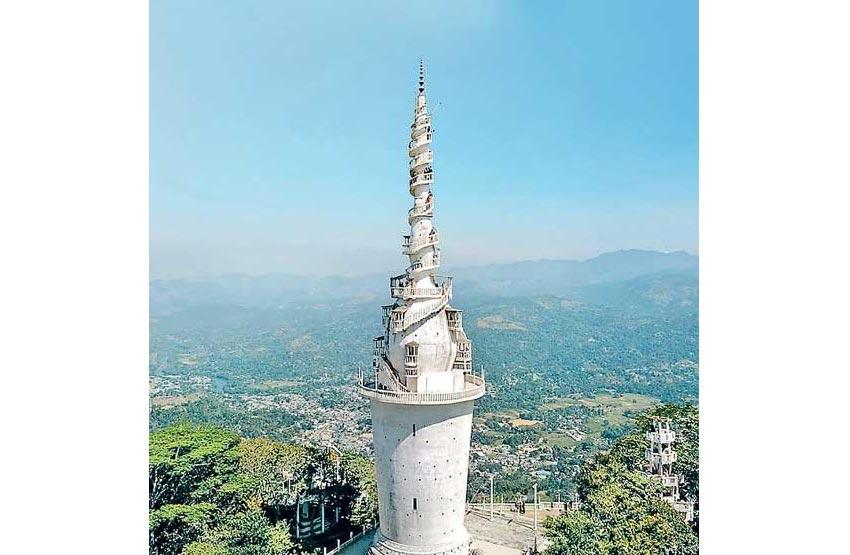
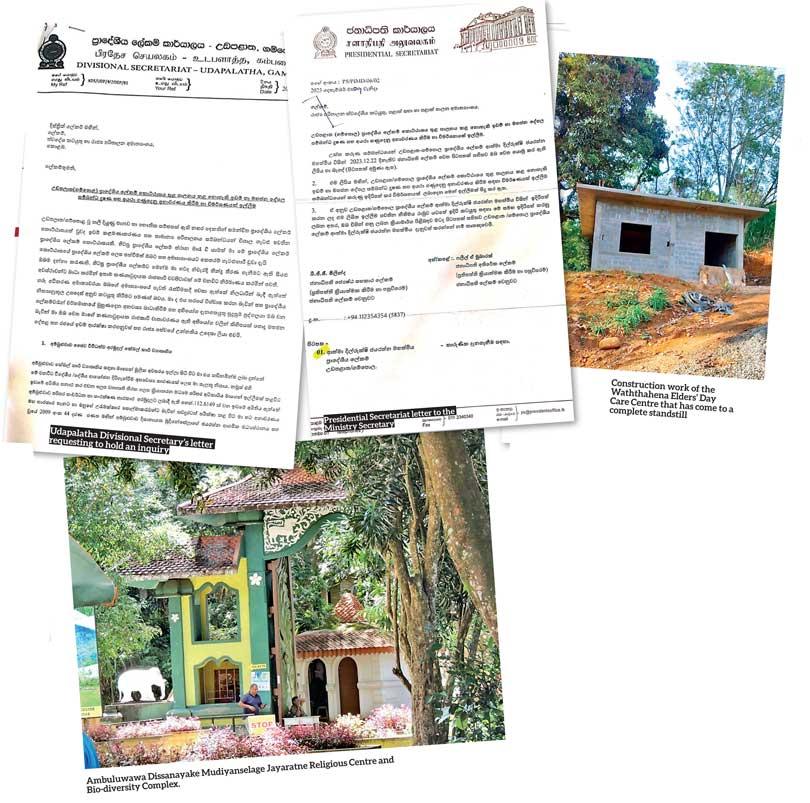
 The Secretary to the Ministry of Public Administration, Home Affairs, Provincial Councils and Local Government is accused of aiding and abetting a ruling party politician from the Kandy district in his alleged corrupt activities.
The Secretary to the Ministry of Public Administration, Home Affairs, Provincial Councils and Local Government is accused of aiding and abetting a ruling party politician from the Kandy district in his alleged corrupt activities.
Pradeep Yasaratne, the Ministry Secretary who is under the spotlight, attracted severe criticism for allegedly transferring A.D. Jayaratne the Divisional Secretary (DS) Udapalatha, Gampola, to the Ministry pool from January 26.
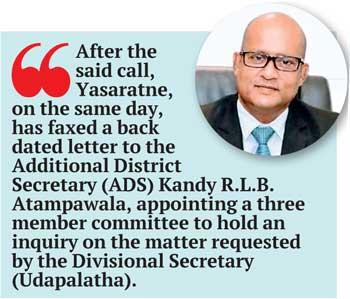 This was said to have done simply because Jayaratne was intending to file legal action on February 12 against ‘State Minister of Justice and Prison Affairs Anuradha Jayaratne’, for his alleged involvement in a number of corrupt deeds in Gampola.
This was said to have done simply because Jayaratne was intending to file legal action on February 12 against ‘State Minister of Justice and Prison Affairs Anuradha Jayaratne’, for his alleged involvement in a number of corrupt deeds in Gampola.
However, the Public Service Commission (PSC) turned down the transfer on January 30 and had instructed Yasaratne to revert the decision. But, Yasaratne is alleged to have appealed against this decision and had requested the PSC to consider implementing this transfer. The PSC had reprimanded the Ministry Secretary and directed the latter to reinstate the Divisional Secretary with immediate effect.
The reason for this questionable transfer was due to the Divisional Secretary (Udapalatha) requesting the District Secretary Kandy Chandana Tennakoon to hold an inquiry against the State Minister for his alleged involvement in many corrupt activities in Gampola. By letter dated December 22, 2023 the Divisional Secretary had requested from Tennakoon- copying the same to the Ministry Secretary Yasaratne and the President Secretary- to hold an inquiry against the State Minister. Instead of taking action Yasaratne had transferred the Divisional Secretary to the ministry pool without initiating an inquiry against the allegations levelled at the State Minister.
Although Yasaratne- as the Ministry Secretary- failed to discharge his duties, Additional Secretary to the President Faleel A. Mubarak, on the advice of the Senior Additional Secretary to the President (Policy Implementation and Monitoring Division) B.G.G. Milinda, by letter dated December 29, 2023, has instructed Yasaratne to initiate an inquiry on the said matter and to report back to him the outcome of the investigation.
“Yasaratne has ignored the Presidential Secretariat directives vehemently,” sources from the Presidential Secretariat told this newspaper.
Instructions
Soon after the Divisional Secretary (Udapalatha) was transferred, this newspaper contacted Yasaratne on January 31, 2024, to find out why he had not taken any action regarding the request made by the Divisional Secretary and also failed to abide by the instructions given by the Presidential Secretariat, Yasaratne did not make any comment claiming that he was busy with back to back meetings.
After the said call, Yasaratne, on the same day, has faxed a back dated letter to the Additional District Secretary (ADS) Kandy R.L.B. Atampawala, appointing a three member committee to hold an inquiry on the matter requested by the Divisional Secretary (Udapalatha).
Yasaratne’s letter to appoint the three member committee- although dated as January 16, 2024- had been faxed to the ADS office on January 31, 2014. The official stamp of the ADS placed on this letter confirms it was received on January 31. A copy of this letter is in possession of this newspaper.
“If the letter was typed on January 16, Yasaratne should have either faxed or posted it to the ADS office the following day. The reason for him to fax this back dated letter on January 31, was because the media questioned him on why he did not take any action against the State Minister,” a senior officer at the ADS Office Kandy told this newspaper.
Divisional Secretary (Udapalatha) in her letter has requested District Secretary Kandy to hold an inquiry into the alleged misappropriation of funds of the Ambuluwawa Trust Fund, how the State Minister was involved against the construction of the Elderly Day Care Centre at Waththahena Grama Niladari Division and how the national heritage building at Gampola has been leased out using a forged document.
According to reliable sources from the Kandy District Secretariat, all attempts taken to construct the day-care centre for the elders was foiled by the State Minister claiming that no one is allowed to do any development work in state lands in the area without his permission.
Threats
“Despite these threats the National Secretariat for Elders allocated Rs.3.5 million to the Divisional Secretary to construct this day-care centre which commenced in December 2023.
However OIC Gampola Laksiri Fernando is alleged to have acted on the instructions of the State Minister and has threatened the contractor and his workers to stop the construction work stating that failing which they would be arrested and put behind bars. The Divisional Secretary had once called the OIC to ask why he is threatening the construction workers to which he had stated that it was Anuradha Jayaratne that wanted him to do so. The Divisional Secretary has got this conversation recorded. As a result of these threats, the National Secretariat for Elders- by letter dated December 23, 2023- had wanted the Divisional Secretary to stop the construction work and to reimburse the balance monie. By December 31, the work came to a complete standstill; depriving the elderly residents in the area a place to spend their time when their kith and kin are away at work,” sources said.
When Gampola OIC Fernando was contacted to know why he threatened the contractors, he said that there were many complaints from the villagers against this construction. When asked whether it was the villagers or the State Minister that wanted him to get this work stopped, the OIC said that the State Minister was not involved, but he acted merely on the complaints lodged by the villagers.
Meanwhile, our sources further revealed how the State Minister has allegedly leased out part of the Cultural Heritage Building at Gampola on a forged deed.
“When the Grama Niladari in the division had informed this to the Divisional Secretary, she immediately checked whether this has been leased out by the Divisional Secretariat. She had found out from the Land Registry that a forged deed had been given to the lessee. Immediately the Divisional Secretary had pasted a notice on the wall asking them to vacate the building, but these instructions were to no avail. She had lodged a complaint with the CID to look into how a forged deed had been registered with the Land Registry,” sources said.
Be that as it may, it has now come to light how the Ambuluwawa Dissanayake Mudiyanselage Jayaratne Religious Centre and Bio-diversity Complex Trust Fund has misappropriated the income of the Religious Centre and Bio-diversity Complex amounting to billions of rupees. The Auditor General’s reports from 2010 to 2022 -copies of which this newspaper is in possession of- clearly state how the Trust Fund has been maintained violating all norms of Government Financial Regulations. They also give details of how the authorities have continuously failed to provide the necessary documents for the Government Audit on time.
According to the Hansard Report of November 18, 2023, MP Chaminda Wijesiri has stated that a Rs.176.887 million fraud had taken place at the Religious Centre and Bio-diversity Complex Trust Fund and while referring to 2021 Auditor General’s (AG) Report has informed the parliament that counterfoils of all entrance tickets issued have been set on fire to prevent the AG from obtaining details regarding the sale of tickets.
Wijesiri has also brought to the notice of parliament how the Trust Fund vehicles have been sold without following procurement guidelines and how payments have been made to unauthorised vouchers which amounts to several million of rupees.
Accounts
Ambuluwawa Dissanayake Mudiyanselage Jayaratne Religious Centre and Bio-diversity Complex Trust Fund Act No: 44 of 2009 was enacted by the Parliament of Sri Lanka. As per Section 10 (4), the Auditor General (AG) shall audit the accounts of the Fund annually in accordance with Article 154 of the Constitution.
Although there are 20 objectives the Trust Fund has to fulfill with the income it generates, the audit report shows that this Fund has failed to accomplish most of these objectives as stipulated in Section 4 of the Act.
Section 10 (1) of this Act, says that the Trust Board shall cause proper books of accounts to be kept of the income and expenditure, assets and liabilities and all other transactions of the Fund.
But the audit reports show that the Trust Fund has failed to submit its performance reports, cash flow statements of changes in the accumulated fund, basic accounting policies and financial statements to the National Audit Office (NAO) on time; although it should be presented within two months after the end of each financial year.
Violating Financial Regulation 135, the Trust Fund has not delegated its authority to anyone to certify/approve to make payments in respect of all expenses. Two employees- who are not authorised- have approved and certified payment vouchers. The Trust Fund also has not maintained a register of counterfoil books and had not maintained records to show how many entrance tickets had been issued. As a result, the NAO has failed to find out how many tickets have been issued and how much money was generated through ticket sales.
The summery of the government audit reports shows that the scams involved in the Trust Fund are approximately a staggering as Rs.114.094 million.
According to the audit reports from 2009 to 2012, the Trust Fund has not accounted Rs.13.619 million which it received from the Public Trustee. Hence the audit was unable to find out for what purpose this money was spent on.
The Trust Fund has also not accounted for the interest it receives from a fixed deposit amounting to Rs.15 million. The deposit was opened by the Public Trustee at the National Savings Bank under the Trust Fund’s name in 2009. For the year 2010, the receivable interest was Rs. 875, 000, for 2011 the receivable interest was Rs.1.625 million and for the year 2012 the interest was Rs.2.375 million. Hence the NAO has failed to determine what happened to the interest it accumulated within these three years.
The value of two buildings belonging to the Trust Fund, as at December 31, 2010, amounting to Rs. 4.67 million, had been omitted from fixed assets.
As per the agreement entered into with telephone companies to erect telephone towers within Ambuluwawa- for the period starting from June 7, 2010 to June 6, 2015-a lease rent of Rs. 54, 000 should be received by the Fund monthly. However, the accounts do not disclose of any of the rental monies they received. The NAO was unable to ascertain how much money they received from these telephone tower lease agreement.
As per the 2020 audit report, three FD certificates to the amount of Rs.4 million at the Bank of Ceylon Gampola had not been furnished for the audit. Although the Trust Fund states that it does not have in its possession the original certificates, but only bank certified copies, the NAO has stated that the original Fixed Deposit certificates should be submitted for the audit.
According to the audit reports, entrance tickets had not been printed in accordance to a proper plan. The tickets at the value of Rs.25 had been altered and used instead of tickets valued at Rs. 100, 150 and 300; leading to financial irregularities.
Action had not been taken to obtain the daily income reports and monthly summary reports related to the sale of tickets. These tickets were issued using computers. Those possessing these tickets were given access to enter the Ambuluwawa Biodiversity Complex. These tickets were accounted for under the supervision of a responsible person.
A sum of Rs. 9.5 million had been shown in the register of revenue as the income earned through the sale of tickets. However, that income could not be satisfactorily vouched for as the counterfoils of the tickets had been destroyed purposely by setting fire to them. Although the Trust states that details of ticket sales had been recorded in the register on a daily basis, the NAO in its recommendations has stated that the counterfoils of the admissions should be made available to figure out the revenue. A register of counterfoil books had not been maintained to keep records regarding the issuing of tickets.
The treasurer of the Fund has informed the NAO that two vehicles owned by the Fund had been sold to external parties at a value of Rs.7.5 million during the preceding years based on an assessment made privately by a government valuing process without following the tender procedure. However, the documents of assessment and information on the funds received after the sale of these vehicles have not been made available to the audit.
It is also reported on how a vehicle worth of Rs.4 million- bought and handed over to the Trust by the Public Trustee- has gone missing and no one has any details regarding it.
As per the 2022 audit report, the board of Trustees had not taken steps to provide accurate, clear and comprehensive information to the audit regarding the transactions carried out in relation in 2022 and the preceding years. According to the audit report, documents and books were not maintained and there has been no authorised responsible officer employed in the office to maintain the books.
Violating government financial regulations, the Fund has paid Rs.37. 445 million for 277 unauthorised vouchers without obtaining the names of all payees. According to the audit reports names of every payee has to be written on each voucher and it’s a must to obtain acknowledgement receipts. However, this practice has not been followed by the Trust. The Trust Management has not made any comments to the NAO on these findings.
In making payments, although the relevant vouchers should be prepared, numbered and recorded in the cash book and in the expense register, cheques had been directly written and payments have been made without preparing vouchers. A register on advance payments had not been maintained and fixed assets had not been prepared. The management of the Trust Fund has stated that action will be taken to rectify what has been brought up by the NAO.
Although the number of the voucher should be mentioned on the counterfoil of each cheque drawn this practice has been ignored by the Trust Fund.
It has also come to light how payments to the value of Rs. 609, 845 had been made for non-submitted bills; leading to an irregularity.
Inquiry
Secretary Ministry of Public Administration, Home Affairs, Provincial Councils and Local Government Pradeep Yasaratne did not wish to clarify why he made an appeal to the PSC to transfer DS Udapalatha when the request he made initially was turned down. But he said that he had to make the appeal on the request of inquiring officers who are holding an inquiry against the Divisional Secretary.
“I am sorry I don’t have time to make any further comments on this as I am busy now. Call me later,” he added.
Attempts to contact fail
All attempts to contact Auditor General Chulantha Wickremasinghe for a comment failed as he neither respond to any of the calls nor to the text message sent to him till the paper went for publications.
Minister Jayaratne refutes allegations claims DS tarnished his image
State Minister Anuradha Jayaratne when contacted said that he never asked the Ministry Secretary to transfer the DS to the Ministry pool but filed legal action against her for tarnishing his name for baseless allegations.
“I sent her a letter of demand. The DS got an elderly day care center built at Waththahena in Gampola on a land I was planning to start a water purification centre to give clean drinking water for 21, 000 families in the area. For this elderly day care center, the government allocated Rs.3. 2 million and it was for the benefit of all elders in the district. Had she told me the requirement, I would have allocated a land for the project from Kandy town. She had to put this proposal to the District Development Committee which is headed by me. But she never informed me about this. Hence I had to ask the Secretary Ministry of Public Administration, Home Affairs, Provincial Councils and Local Government to conduct an inquiry on this against her. But I never asked him to transfer her which is not ethical,” the State Minister said.
When asked him why frauds are taking place at Ambuluwawa Trust Fund, State Minister Jayaratne refuted the allegations levelled and said that there are no frauds reported at the Trust Fund.
“We have to send all our financial statements to the Auditor General annually. I took over the Chairmanship in 2020 after my father’s demise in 2019. The AG sends these audit reports to the oversight committee. If there were reported frauds, the opposition would have brought this up in parliament. We have submitted all our income /expense statements to the government audit without any delay,” he added.
All attempts to contact Auditor General Chulantha Wickremasinghe for a comment failed as he neither respond to any of the calls nor to the text message sent to him till the paper went for publications.
 ]]>
]]>

 The Secretary to the Ministry of Public Administration, Home Affairs, Provincial Councils and Local Government is accused of aiding and abetting a ruling party politician from the Kandy district in his alleged corrupt activities.
The Secretary to the Ministry of Public Administration, Home Affairs, Provincial Councils and Local Government is accused of aiding and abetting a ruling party politician from the Kandy district in his alleged corrupt activities.
Pradeep Yasaratne, the Ministry Secretary who is under the spotlight, attracted severe criticism for allegedly transferring A.D. Jayaratne the Divisional Secretary (DS) Udapalatha, Gampola, to the Ministry pool from January 26.
 This was said to have done simply because Jayaratne was intending to file legal action on February 12 against ‘State Minister of Justice and Prison Affairs Anuradha Jayaratne’, for his alleged involvement in a number of corrupt deeds in Gampola.
This was said to have done simply because Jayaratne was intending to file legal action on February 12 against ‘State Minister of Justice and Prison Affairs Anuradha Jayaratne’, for his alleged involvement in a number of corrupt deeds in Gampola.
However, the Public Service Commission (PSC) turned down the transfer on January 30 and had instructed Yasaratne to revert the decision. But, Yasaratne is alleged to have appealed against this decision and had requested the PSC to consider implementing this transfer. The PSC had reprimanded the Ministry Secretary and directed the latter to reinstate the Divisional Secretary with immediate effect.
The reason for this questionable transfer was due to the Divisional Secretary (Udapalatha) requesting the District Secretary Kandy Chandana Tennakoon to hold an inquiry against the State Minister for his alleged involvement in many corrupt activities in Gampola. By letter dated December 22, 2023 the Divisional Secretary had requested from Tennakoon- copying the same to the Ministry Secretary Yasaratne and the President Secretary- to hold an inquiry against the State Minister. Instead of taking action Yasaratne had transferred the Divisional Secretary to the ministry pool without initiating an inquiry against the allegations levelled at the State Minister.
Although Yasaratne- as the Ministry Secretary- failed to discharge his duties, Additional Secretary to the President Faleel A. Mubarak, on the advice of the Senior Additional Secretary to the President (Policy Implementation and Monitoring Division) B.G.G. Milinda, by letter dated December 29, 2023, has instructed Yasaratne to initiate an inquiry on the said matter and to report back to him the outcome of the investigation.
“Yasaratne has ignored the Presidential Secretariat directives vehemently,” sources from the Presidential Secretariat told this newspaper.
Instructions
Soon after the Divisional Secretary (Udapalatha) was transferred, this newspaper contacted Yasaratne on January 31, 2024, to find out why he had not taken any action regarding the request made by the Divisional Secretary and also failed to abide by the instructions given by the Presidential Secretariat, Yasaratne did not make any comment claiming that he was busy with back to back meetings.
After the said call, Yasaratne, on the same day, has faxed a back dated letter to the Additional District Secretary (ADS) Kandy R.L.B. Atampawala, appointing a three member committee to hold an inquiry on the matter requested by the Divisional Secretary (Udapalatha).
Yasaratne’s letter to appoint the three member committee- although dated as January 16, 2024- had been faxed to the ADS office on January 31, 2014. The official stamp of the ADS placed on this letter confirms it was received on January 31. A copy of this letter is in possession of this newspaper.
“If the letter was typed on January 16, Yasaratne should have either faxed or posted it to the ADS office the following day. The reason for him to fax this back dated letter on January 31, was because the media questioned him on why he did not take any action against the State Minister,” a senior officer at the ADS Office Kandy told this newspaper.
Divisional Secretary (Udapalatha) in her letter has requested District Secretary Kandy to hold an inquiry into the alleged misappropriation of funds of the Ambuluwawa Trust Fund, how the State Minister was involved against the construction of the Elderly Day Care Centre at Waththahena Grama Niladari Division and how the national heritage building at Gampola has been leased out using a forged document.
According to reliable sources from the Kandy District Secretariat, all attempts taken to construct the day-care centre for the elders was foiled by the State Minister claiming that no one is allowed to do any development work in state lands in the area without his permission.
Threats
“Despite these threats the National Secretariat for Elders allocated Rs.3.5 million to the Divisional Secretary to construct this day-care centre which commenced in December 2023.
However OIC Gampola Laksiri Fernando is alleged to have acted on the instructions of the State Minister and has threatened the contractor and his workers to stop the construction work stating that failing which they would be arrested and put behind bars. The Divisional Secretary had once called the OIC to ask why he is threatening the construction workers to which he had stated that it was Anuradha Jayaratne that wanted him to do so. The Divisional Secretary has got this conversation recorded. As a result of these threats, the National Secretariat for Elders- by letter dated December 23, 2023- had wanted the Divisional Secretary to stop the construction work and to reimburse the balance monie. By December 31, the work came to a complete standstill; depriving the elderly residents in the area a place to spend their time when their kith and kin are away at work,” sources said.
When Gampola OIC Fernando was contacted to know why he threatened the contractors, he said that there were many complaints from the villagers against this construction. When asked whether it was the villagers or the State Minister that wanted him to get this work stopped, the OIC said that the State Minister was not involved, but he acted merely on the complaints lodged by the villagers.
Meanwhile, our sources further revealed how the State Minister has allegedly leased out part of the Cultural Heritage Building at Gampola on a forged deed.
“When the Grama Niladari in the division had informed this to the Divisional Secretary, she immediately checked whether this has been leased out by the Divisional Secretariat. She had found out from the Land Registry that a forged deed had been given to the lessee. Immediately the Divisional Secretary had pasted a notice on the wall asking them to vacate the building, but these instructions were to no avail. She had lodged a complaint with the CID to look into how a forged deed had been registered with the Land Registry,” sources said.
Be that as it may, it has now come to light how the Ambuluwawa Dissanayake Mudiyanselage Jayaratne Religious Centre and Bio-diversity Complex Trust Fund has misappropriated the income of the Religious Centre and Bio-diversity Complex amounting to billions of rupees. The Auditor General’s reports from 2010 to 2022 -copies of which this newspaper is in possession of- clearly state how the Trust Fund has been maintained violating all norms of Government Financial Regulations. They also give details of how the authorities have continuously failed to provide the necessary documents for the Government Audit on time.
According to the Hansard Report of November 18, 2023, MP Chaminda Wijesiri has stated that a Rs.176.887 million fraud had taken place at the Religious Centre and Bio-diversity Complex Trust Fund and while referring to 2021 Auditor General’s (AG) Report has informed the parliament that counterfoils of all entrance tickets issued have been set on fire to prevent the AG from obtaining details regarding the sale of tickets.
Wijesiri has also brought to the notice of parliament how the Trust Fund vehicles have been sold without following procurement guidelines and how payments have been made to unauthorised vouchers which amounts to several million of rupees.
Accounts
Ambuluwawa Dissanayake Mudiyanselage Jayaratne Religious Centre and Bio-diversity Complex Trust Fund Act No: 44 of 2009 was enacted by the Parliament of Sri Lanka. As per Section 10 (4), the Auditor General (AG) shall audit the accounts of the Fund annually in accordance with Article 154 of the Constitution.
Although there are 20 objectives the Trust Fund has to fulfill with the income it generates, the audit report shows that this Fund has failed to accomplish most of these objectives as stipulated in Section 4 of the Act.
Section 10 (1) of this Act, says that the Trust Board shall cause proper books of accounts to be kept of the income and expenditure, assets and liabilities and all other transactions of the Fund.
But the audit reports show that the Trust Fund has failed to submit its performance reports, cash flow statements of changes in the accumulated fund, basic accounting policies and financial statements to the National Audit Office (NAO) on time; although it should be presented within two months after the end of each financial year.
Violating Financial Regulation 135, the Trust Fund has not delegated its authority to anyone to certify/approve to make payments in respect of all expenses. Two employees- who are not authorised- have approved and certified payment vouchers. The Trust Fund also has not maintained a register of counterfoil books and had not maintained records to show how many entrance tickets had been issued. As a result, the NAO has failed to find out how many tickets have been issued and how much money was generated through ticket sales.
The summery of the government audit reports shows that the scams involved in the Trust Fund are approximately a staggering as Rs.114.094 million.
According to the audit reports from 2009 to 2012, the Trust Fund has not accounted Rs.13.619 million which it received from the Public Trustee. Hence the audit was unable to find out for what purpose this money was spent on.
The Trust Fund has also not accounted for the interest it receives from a fixed deposit amounting to Rs.15 million. The deposit was opened by the Public Trustee at the National Savings Bank under the Trust Fund’s name in 2009. For the year 2010, the receivable interest was Rs. 875, 000, for 2011 the receivable interest was Rs.1.625 million and for the year 2012 the interest was Rs.2.375 million. Hence the NAO has failed to determine what happened to the interest it accumulated within these three years.
The value of two buildings belonging to the Trust Fund, as at December 31, 2010, amounting to Rs. 4.67 million, had been omitted from fixed assets.
As per the agreement entered into with telephone companies to erect telephone towers within Ambuluwawa- for the period starting from June 7, 2010 to June 6, 2015-a lease rent of Rs. 54, 000 should be received by the Fund monthly. However, the accounts do not disclose of any of the rental monies they received. The NAO was unable to ascertain how much money they received from these telephone tower lease agreement.
As per the 2020 audit report, three FD certificates to the amount of Rs.4 million at the Bank of Ceylon Gampola had not been furnished for the audit. Although the Trust Fund states that it does not have in its possession the original certificates, but only bank certified copies, the NAO has stated that the original Fixed Deposit certificates should be submitted for the audit.
According to the audit reports, entrance tickets had not been printed in accordance to a proper plan. The tickets at the value of Rs.25 had been altered and used instead of tickets valued at Rs. 100, 150 and 300; leading to financial irregularities.
Action had not been taken to obtain the daily income reports and monthly summary reports related to the sale of tickets. These tickets were issued using computers. Those possessing these tickets were given access to enter the Ambuluwawa Biodiversity Complex. These tickets were accounted for under the supervision of a responsible person.
A sum of Rs. 9.5 million had been shown in the register of revenue as the income earned through the sale of tickets. However, that income could not be satisfactorily vouched for as the counterfoils of the tickets had been destroyed purposely by setting fire to them. Although the Trust states that details of ticket sales had been recorded in the register on a daily basis, the NAO in its recommendations has stated that the counterfoils of the admissions should be made available to figure out the revenue. A register of counterfoil books had not been maintained to keep records regarding the issuing of tickets.
The treasurer of the Fund has informed the NAO that two vehicles owned by the Fund had been sold to external parties at a value of Rs.7.5 million during the preceding years based on an assessment made privately by a government valuing process without following the tender procedure. However, the documents of assessment and information on the funds received after the sale of these vehicles have not been made available to the audit.
It is also reported on how a vehicle worth of Rs.4 million- bought and handed over to the Trust by the Public Trustee- has gone missing and no one has any details regarding it.
As per the 2022 audit report, the board of Trustees had not taken steps to provide accurate, clear and comprehensive information to the audit regarding the transactions carried out in relation in 2022 and the preceding years. According to the audit report, documents and books were not maintained and there has been no authorised responsible officer employed in the office to maintain the books.
Violating government financial regulations, the Fund has paid Rs.37. 445 million for 277 unauthorised vouchers without obtaining the names of all payees. According to the audit reports names of every payee has to be written on each voucher and it’s a must to obtain acknowledgement receipts. However, this practice has not been followed by the Trust. The Trust Management has not made any comments to the NAO on these findings.
In making payments, although the relevant vouchers should be prepared, numbered and recorded in the cash book and in the expense register, cheques had been directly written and payments have been made without preparing vouchers. A register on advance payments had not been maintained and fixed assets had not been prepared. The management of the Trust Fund has stated that action will be taken to rectify what has been brought up by the NAO.
Although the number of the voucher should be mentioned on the counterfoil of each cheque drawn this practice has been ignored by the Trust Fund.
It has also come to light how payments to the value of Rs. 609, 845 had been made for non-submitted bills; leading to an irregularity.
Inquiry
Secretary Ministry of Public Administration, Home Affairs, Provincial Councils and Local Government Pradeep Yasaratne did not wish to clarify why he made an appeal to the PSC to transfer DS Udapalatha when the request he made initially was turned down. But he said that he had to make the appeal on the request of inquiring officers who are holding an inquiry against the Divisional Secretary.
“I am sorry I don’t have time to make any further comments on this as I am busy now. Call me later,” he added.
Attempts to contact fail
All attempts to contact Auditor General Chulantha Wickremasinghe for a comment failed as he neither respond to any of the calls nor to the text message sent to him till the paper went for publications.
Minister Jayaratne refutes allegations claims DS tarnished his image
State Minister Anuradha Jayaratne when contacted said that he never asked the Ministry Secretary to transfer the DS to the Ministry pool but filed legal action against her for tarnishing his name for baseless allegations.
“I sent her a letter of demand. The DS got an elderly day care center built at Waththahena in Gampola on a land I was planning to start a water purification centre to give clean drinking water for 21, 000 families in the area. For this elderly day care center, the government allocated Rs.3. 2 million and it was for the benefit of all elders in the district. Had she told me the requirement, I would have allocated a land for the project from Kandy town. She had to put this proposal to the District Development Committee which is headed by me. But she never informed me about this. Hence I had to ask the Secretary Ministry of Public Administration, Home Affairs, Provincial Councils and Local Government to conduct an inquiry on this against her. But I never asked him to transfer her which is not ethical,” the State Minister said.
When asked him why frauds are taking place at Ambuluwawa Trust Fund, State Minister Jayaratne refuted the allegations levelled and said that there are no frauds reported at the Trust Fund.
“We have to send all our financial statements to the Auditor General annually. I took over the Chairmanship in 2020 after my father’s demise in 2019. The AG sends these audit reports to the oversight committee. If there were reported frauds, the opposition would have brought this up in parliament. We have submitted all our income /expense statements to the government audit without any delay,” he added.
All attempts to contact Auditor General Chulantha Wickremasinghe for a comment failed as he neither respond to any of the calls nor to the text message sent to him till the paper went for publications.
 ]]>
]]>
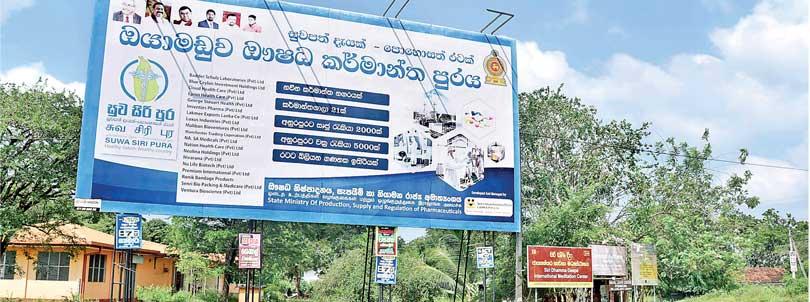
A large billboard giving details of the Oyamaduwa pharmaceutical manufacturing zone
- Individuals with vested interests monitoring this project have employed various tactics to impede the construction of factories in the zone; resulting in changes to initial plans
- Several factors, including the appreciation of the dollar have contributed to delays in the construction of the manufacturing zone
- 21 pharmaceutical manufacturing companies were selected for the initial phase
- The manufacturing zone is expected to generate 2000 direct jobs and 5000 indirect jobs
 Twenty one companies within the Oyamaduwa pharmaceutical manufacturing zone received approval from the Ministry of Health. The government does not allocate funds for the establishment of these factories; instead, the participating companies are required to cover the costs associated with this venture. An Indian company and its subsidiary, Spectrum Pharma TECH Lanka Pvt Ltd in Sri Lanka, were chosen to construct these factories through a tender process. Eighty percent of the project will be developed by the Indian company, with the remaining 20 percent by the local representative company, Spectrum Pharmatech Lanka Pvt. Tenders were submitted from three institutions and 35 factories for constructions in this manufacturing zone. 21 pharmaceutical manufacturing companies were selected for the initial phase.
Twenty one companies within the Oyamaduwa pharmaceutical manufacturing zone received approval from the Ministry of Health. The government does not allocate funds for the establishment of these factories; instead, the participating companies are required to cover the costs associated with this venture. An Indian company and its subsidiary, Spectrum Pharma TECH Lanka Pvt Ltd in Sri Lanka, were chosen to construct these factories through a tender process. Eighty percent of the project will be developed by the Indian company, with the remaining 20 percent by the local representative company, Spectrum Pharmatech Lanka Pvt. Tenders were submitted from three institutions and 35 factories for constructions in this manufacturing zone. 21 pharmaceutical manufacturing companies were selected for the initial phase.
The local company affiliated to the Indian company was granted permission to oversee and provide the infrastructure necessary for establishing the manufacturing zone; collaborating with relevant construction companies under a 35-year contract. In this arrangement, each respective company is required to establish factories on their designated land. It is the duty of the local company, associating with the Indian company, to secure funds from the relevant companies and manage these tasks.
 The manufacturing zone is expected to generate 2000 direct jobs and 5000 indirect jobs. The estimated cost for establishing this manufacturing zone is 130 million dollars, and plans have been formulated for its construction on an 80-acre land. None of the pharmaceutical products manufactured in this manufacturing zone will be transported to Colombo; instead distribution is planned in such a way to cover the rest of Sri Lanka and will be done from the Oyamaduwa Manufacturing Zone. Plans were devised to carry out quality control of medicines, distribute pharmaceutical products and construct a laboratory with all the essential facilities on the designated land.
The manufacturing zone is expected to generate 2000 direct jobs and 5000 indirect jobs. The estimated cost for establishing this manufacturing zone is 130 million dollars, and plans have been formulated for its construction on an 80-acre land. None of the pharmaceutical products manufactured in this manufacturing zone will be transported to Colombo; instead distribution is planned in such a way to cover the rest of Sri Lanka and will be done from the Oyamaduwa Manufacturing Zone. Plans were devised to carry out quality control of medicines, distribute pharmaceutical products and construct a laboratory with all the essential facilities on the designated land.
No illegal activities have been reported of during the construction phase of the manufacturing zone. Approximately 28 trees were felled in the area during road preparation phase. Spectrum Pharmatech Lanka Pvt Ltd Chief Executive Officer Dr. Priya Dissanayake informed this newspaper that the timber was handed over to the State Timber Corporation and the revenue generated was remitted to the government. Several factors, including the appreciation of the dollar have contributed to delays in the construction of the manufacturing zone. During the planning phase, the dollar exchange rate was 196 rupees. Dr. Dissanayake mentioned that the Ministry of Health granted permission to recover the costs of the manufacturing zone from the manufacturers based on that exchange rate.
The construction of this manufacturing zone does not create any environmental damage. Factories are categorised as non-harmful, mildly harmful and harmful and this is done with the aim of minimising the impact on the environment. And plans to commence these factories were formulated considering the allocated investments for each category. Dr. Dissanayake said that these plans were developed following an audit and cost calculation.
As of now, eight selected companies have received approval for tax payments. This is a project that comes under the Ministry of Health. Despite that, according to Dr. Dissanayake, considerations have been made to relocate the Pharmaceutical Manufacturing Zone from Oyamadu to Koggala through the Industrial Development Board. Additionally, he mentioned that former Health Minister Keheliya Rambukwella, had entered into an agreement with 12 companies to initiate this manufacturing zone in Oyamaduwa itself.
However, there are plans now to relocate the manufacturing zone to Koggala; leading to heightened skepticism among potential investors and raising concerns about the accountability regarding their investments, Dr. Priya Dissanayake added.
“The project was continually subject to delay and when inquiries were made former Health Minister Keheliya Rambukwella said that the Health Ministry would purchase all medicines produced by the factories involved in this venture. We sought a letter of confirmation for this commitment and a buyback agreement was provided as a guarantee. The agreement is valid for the first five years and can be extended for an additional five years, in line with the operational methodology of the factories,” Dr. Dissanayake added.
“With the surge in the value of the dollar, we communicated the corresponding price increases to the Ministry of Health and established new pricing. However, not all investors were willing to accept these changes. As the value of the dollar rose from 190 rupees to 320 rupees, the construction of the manufacturing zone became unthinkable within the initially planned budget. When we proposed new prices, some investors resisted urging adherence to the previous pricing structure. As we cannot commence factories while obtaining raw materials at the old prices, I investigated the reason behind their strong reluctance to agree to new price rates.
“Then we learned that some companies- profiting from large-scale drug imports- obtained land from this manufacturing zone under the guise of making an investment with the intention of delaying its commencement. Others purchased land without establishing factories; subsequently selling the land to different companies and causing delays in setting up the factory. They requested an acre of land for pharmaceutical production, although this amount is insufficient to build a pharmaceutical company; at least 3 acres are required. These investors are selected by the Ministry of Health and those who make choices may lack knowledge about the infrastructure needed to establish a pharmaceutical company. Therefore, some individuals who acquired land may have sold it to external companies,” said Dr. Dissanayake.
Investors face significant challenges
Others reserve land for setting up factories, but fail to follow through with the construction process. They secure land, claiming they intend to manufacture medicine that would otherwise be imported; yet no factory is built. By postponing their plans, they ensure the continued importation of foreign-made medicine, thus preventing its local production in Sri Lanka, emphasised Dr. Dissanayake. These underhand activities make it necessary to continue with the ongoing import of medicine.
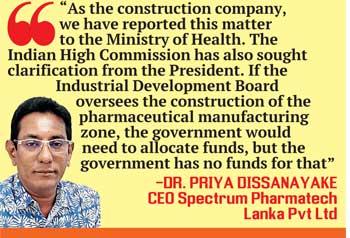 Out of the 21 investors who initially expressed interest in constructing the Oyamaduwa Pharmaceutical Manufacturing Zone, only 12 proceeded to sign contracts. The remaining investors have abandoned their investment plans. Among the 12, eight are prepared to halt progress by feigning intentions to build the manufacturing zone, with only four genuinely attempting to establish companies. Some of the aforementioned eight companies, accused of hindering development, have issued dishonoured cheques. Dr. Dissanayaka said, “Others claimed to use their contractors instead of making consultations with our company and the Indian company. Their contractors provided extremely low prices”. The Ministry of Health was asked to consider these prices. Dr. Dissanayake further stated that such contracting companies are unregistered and the quoted prices are unacceptable; this is a point acknowledged by the Health Ministry.
Out of the 21 investors who initially expressed interest in constructing the Oyamaduwa Pharmaceutical Manufacturing Zone, only 12 proceeded to sign contracts. The remaining investors have abandoned their investment plans. Among the 12, eight are prepared to halt progress by feigning intentions to build the manufacturing zone, with only four genuinely attempting to establish companies. Some of the aforementioned eight companies, accused of hindering development, have issued dishonoured cheques. Dr. Dissanayaka said, “Others claimed to use their contractors instead of making consultations with our company and the Indian company. Their contractors provided extremely low prices”. The Ministry of Health was asked to consider these prices. Dr. Dissanayake further stated that such contracting companies are unregistered and the quoted prices are unacceptable; this is a point acknowledged by the Health Ministry.
These individuals have employed various tactics to impede the construction of factories and this has resulted in changes to initial plans. They continue to create numerous obstacles, hindering the progress of the pharmaceutical zone. Currently, there is an attempt to relocate this manufacturing zone to Koggala through the Industrial Development Board. Companies that have already invested in Oyamaduwa face significant challenges due to these disruptions. If it is relocated to Koggala and Oyamaduwa zone is stalled, reinvesting becomes impractical. Additionally, obtaining new environmental reports and other approvals could take another 2-3 years; which could then lead to a potential halt in the project. Dr. Dissanayake said that prospective investors in the manufacturing zone are now hesitant due to the uncertainties associated with the project.
“As the construction company, we have reported this matter to the Ministry of Health. The Indian High Commission has also sought clarification from the President. If the Industrial 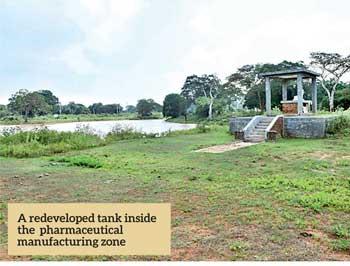 Development Board oversees the construction of the pharmaceutical manufacturing zone, the government would need to allocate funds, but the government has no funds for that. Moreover, all the previously conducted tender procedures would be nullified; necessitating the initiation of a new tender process. This could potentially lead to the entire zone not being constructed. In such a scenario, it would be considered a victory for the efforts of the drug mafia,” said Dr. Dissanayake adding that they are currently awaiting the President’s decision regarding this matter.
Development Board oversees the construction of the pharmaceutical manufacturing zone, the government would need to allocate funds, but the government has no funds for that. Moreover, all the previously conducted tender procedures would be nullified; necessitating the initiation of a new tender process. This could potentially lead to the entire zone not being constructed. In such a scenario, it would be considered a victory for the efforts of the drug mafia,” said Dr. Dissanayake adding that they are currently awaiting the President’s decision regarding this matter.
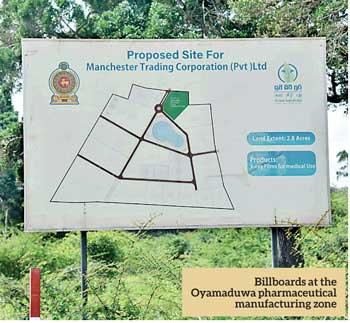
 ]]>
]]>
A large billboard giving details of the Oyamaduwa pharmaceutical manufacturing zone
- Individuals with vested interests monitoring this project have employed various tactics to impede the construction of factories in the zone; resulting in changes to initial plans
- Several factors, including the appreciation of the dollar have contributed to delays in the construction of the manufacturing zone
- 21 pharmaceutical manufacturing companies were selected for the initial phase
- The manufacturing zone is expected to generate 2000 direct jobs and 5000 indirect jobs
 Twenty one companies within the Oyamaduwa pharmaceutical manufacturing zone received approval from the Ministry of Health. The government does not allocate funds for the establishment of these factories; instead, the participating companies are required to cover the costs associated with this venture. An Indian company and its subsidiary, Spectrum Pharma TECH Lanka Pvt Ltd in Sri Lanka, were chosen to construct these factories through a tender process. Eighty percent of the project will be developed by the Indian company, with the remaining 20 percent by the local representative company, Spectrum Pharmatech Lanka Pvt. Tenders were submitted from three institutions and 35 factories for constructions in this manufacturing zone. 21 pharmaceutical manufacturing companies were selected for the initial phase.
Twenty one companies within the Oyamaduwa pharmaceutical manufacturing zone received approval from the Ministry of Health. The government does not allocate funds for the establishment of these factories; instead, the participating companies are required to cover the costs associated with this venture. An Indian company and its subsidiary, Spectrum Pharma TECH Lanka Pvt Ltd in Sri Lanka, were chosen to construct these factories through a tender process. Eighty percent of the project will be developed by the Indian company, with the remaining 20 percent by the local representative company, Spectrum Pharmatech Lanka Pvt. Tenders were submitted from three institutions and 35 factories for constructions in this manufacturing zone. 21 pharmaceutical manufacturing companies were selected for the initial phase.
The local company affiliated to the Indian company was granted permission to oversee and provide the infrastructure necessary for establishing the manufacturing zone; collaborating with relevant construction companies under a 35-year contract. In this arrangement, each respective company is required to establish factories on their designated land. It is the duty of the local company, associating with the Indian company, to secure funds from the relevant companies and manage these tasks.
 The manufacturing zone is expected to generate 2000 direct jobs and 5000 indirect jobs. The estimated cost for establishing this manufacturing zone is 130 million dollars, and plans have been formulated for its construction on an 80-acre land. None of the pharmaceutical products manufactured in this manufacturing zone will be transported to Colombo; instead distribution is planned in such a way to cover the rest of Sri Lanka and will be done from the Oyamaduwa Manufacturing Zone. Plans were devised to carry out quality control of medicines, distribute pharmaceutical products and construct a laboratory with all the essential facilities on the designated land.
The manufacturing zone is expected to generate 2000 direct jobs and 5000 indirect jobs. The estimated cost for establishing this manufacturing zone is 130 million dollars, and plans have been formulated for its construction on an 80-acre land. None of the pharmaceutical products manufactured in this manufacturing zone will be transported to Colombo; instead distribution is planned in such a way to cover the rest of Sri Lanka and will be done from the Oyamaduwa Manufacturing Zone. Plans were devised to carry out quality control of medicines, distribute pharmaceutical products and construct a laboratory with all the essential facilities on the designated land.
No illegal activities have been reported of during the construction phase of the manufacturing zone. Approximately 28 trees were felled in the area during road preparation phase. Spectrum Pharmatech Lanka Pvt Ltd Chief Executive Officer Dr. Priya Dissanayake informed this newspaper that the timber was handed over to the State Timber Corporation and the revenue generated was remitted to the government. Several factors, including the appreciation of the dollar have contributed to delays in the construction of the manufacturing zone. During the planning phase, the dollar exchange rate was 196 rupees. Dr. Dissanayake mentioned that the Ministry of Health granted permission to recover the costs of the manufacturing zone from the manufacturers based on that exchange rate.
The construction of this manufacturing zone does not create any environmental damage. Factories are categorised as non-harmful, mildly harmful and harmful and this is done with the aim of minimising the impact on the environment. And plans to commence these factories were formulated considering the allocated investments for each category. Dr. Dissanayake said that these plans were developed following an audit and cost calculation.
As of now, eight selected companies have received approval for tax payments. This is a project that comes under the Ministry of Health. Despite that, according to Dr. Dissanayake, considerations have been made to relocate the Pharmaceutical Manufacturing Zone from Oyamadu to Koggala through the Industrial Development Board. Additionally, he mentioned that former Health Minister Keheliya Rambukwella, had entered into an agreement with 12 companies to initiate this manufacturing zone in Oyamaduwa itself.
However, there are plans now to relocate the manufacturing zone to Koggala; leading to heightened skepticism among potential investors and raising concerns about the accountability regarding their investments, Dr. Priya Dissanayake added.
“The project was continually subject to delay and when inquiries were made former Health Minister Keheliya Rambukwella said that the Health Ministry would purchase all medicines produced by the factories involved in this venture. We sought a letter of confirmation for this commitment and a buyback agreement was provided as a guarantee. The agreement is valid for the first five years and can be extended for an additional five years, in line with the operational methodology of the factories,” Dr. Dissanayake added.
“With the surge in the value of the dollar, we communicated the corresponding price increases to the Ministry of Health and established new pricing. However, not all investors were willing to accept these changes. As the value of the dollar rose from 190 rupees to 320 rupees, the construction of the manufacturing zone became unthinkable within the initially planned budget. When we proposed new prices, some investors resisted urging adherence to the previous pricing structure. As we cannot commence factories while obtaining raw materials at the old prices, I investigated the reason behind their strong reluctance to agree to new price rates.
“Then we learned that some companies- profiting from large-scale drug imports- obtained land from this manufacturing zone under the guise of making an investment with the intention of delaying its commencement. Others purchased land without establishing factories; subsequently selling the land to different companies and causing delays in setting up the factory. They requested an acre of land for pharmaceutical production, although this amount is insufficient to build a pharmaceutical company; at least 3 acres are required. These investors are selected by the Ministry of Health and those who make choices may lack knowledge about the infrastructure needed to establish a pharmaceutical company. Therefore, some individuals who acquired land may have sold it to external companies,” said Dr. Dissanayake.
Investors face significant challenges
Others reserve land for setting up factories, but fail to follow through with the construction process. They secure land, claiming they intend to manufacture medicine that would otherwise be imported; yet no factory is built. By postponing their plans, they ensure the continued importation of foreign-made medicine, thus preventing its local production in Sri Lanka, emphasised Dr. Dissanayake. These underhand activities make it necessary to continue with the ongoing import of medicine.
 Out of the 21 investors who initially expressed interest in constructing the Oyamaduwa Pharmaceutical Manufacturing Zone, only 12 proceeded to sign contracts. The remaining investors have abandoned their investment plans. Among the 12, eight are prepared to halt progress by feigning intentions to build the manufacturing zone, with only four genuinely attempting to establish companies. Some of the aforementioned eight companies, accused of hindering development, have issued dishonoured cheques. Dr. Dissanayaka said, “Others claimed to use their contractors instead of making consultations with our company and the Indian company. Their contractors provided extremely low prices”. The Ministry of Health was asked to consider these prices. Dr. Dissanayake further stated that such contracting companies are unregistered and the quoted prices are unacceptable; this is a point acknowledged by the Health Ministry.
Out of the 21 investors who initially expressed interest in constructing the Oyamaduwa Pharmaceutical Manufacturing Zone, only 12 proceeded to sign contracts. The remaining investors have abandoned their investment plans. Among the 12, eight are prepared to halt progress by feigning intentions to build the manufacturing zone, with only four genuinely attempting to establish companies. Some of the aforementioned eight companies, accused of hindering development, have issued dishonoured cheques. Dr. Dissanayaka said, “Others claimed to use their contractors instead of making consultations with our company and the Indian company. Their contractors provided extremely low prices”. The Ministry of Health was asked to consider these prices. Dr. Dissanayake further stated that such contracting companies are unregistered and the quoted prices are unacceptable; this is a point acknowledged by the Health Ministry.
These individuals have employed various tactics to impede the construction of factories and this has resulted in changes to initial plans. They continue to create numerous obstacles, hindering the progress of the pharmaceutical zone. Currently, there is an attempt to relocate this manufacturing zone to Koggala through the Industrial Development Board. Companies that have already invested in Oyamaduwa face significant challenges due to these disruptions. If it is relocated to Koggala and Oyamaduwa zone is stalled, reinvesting becomes impractical. Additionally, obtaining new environmental reports and other approvals could take another 2-3 years; which could then lead to a potential halt in the project. Dr. Dissanayake said that prospective investors in the manufacturing zone are now hesitant due to the uncertainties associated with the project.
“As the construction company, we have reported this matter to the Ministry of Health. The Indian High Commission has also sought clarification from the President. If the Industrial  Development Board oversees the construction of the pharmaceutical manufacturing zone, the government would need to allocate funds, but the government has no funds for that. Moreover, all the previously conducted tender procedures would be nullified; necessitating the initiation of a new tender process. This could potentially lead to the entire zone not being constructed. In such a scenario, it would be considered a victory for the efforts of the drug mafia,” said Dr. Dissanayake adding that they are currently awaiting the President’s decision regarding this matter.
Development Board oversees the construction of the pharmaceutical manufacturing zone, the government would need to allocate funds, but the government has no funds for that. Moreover, all the previously conducted tender procedures would be nullified; necessitating the initiation of a new tender process. This could potentially lead to the entire zone not being constructed. In such a scenario, it would be considered a victory for the efforts of the drug mafia,” said Dr. Dissanayake adding that they are currently awaiting the President’s decision regarding this matter.

 ]]>
]]>
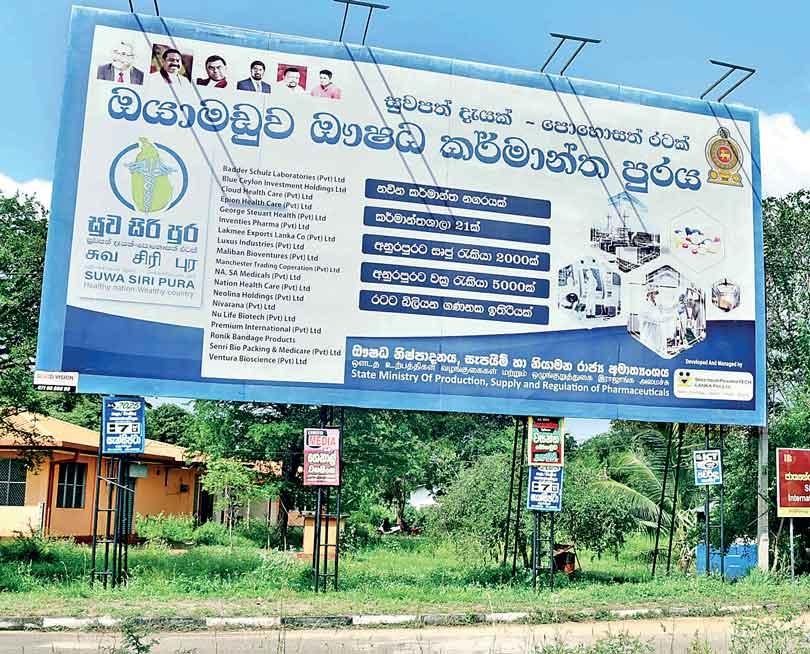
Out of the 400 acres allocated for Deyata Kirula, 80 acres was designated for the pharmaceutical investment zone. Twenty-four medium-sized businessmen were prepared to invest over 300 million USD in the project
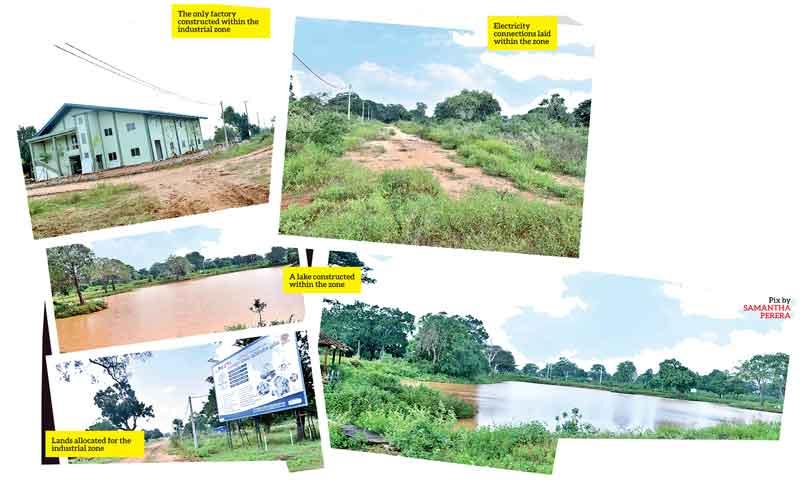
- Twenty-four businessmen were prepared to invest over 300 million USD in a pharmaceutical manufacturing zone which is yet to be completed
- Through the project there is an aim to manufacture 236 types of medicines and 44 surgical instruments within Sri Lanka
- There was speculation regarding relocating the manufacturing zone to Koggala and this made investors hesitate whether to invest or not
- Due to the establishment of this pharmaceutical manufacturing zone, 2000 direct employment opportunities will be generated for the youth in the area
- The total investment on the zone amounts to 80 billion rupees
- The then government announced that the anticipated investment by these investors for this project was over 300 million rupees
- Sri Lanka was at one time rated as the highest importer of drugs in Asia
- There is a proposal to lease plots of land in the pharmaceutical manufacturing zone for a period of 35 years with a tax holiday for the first 5 years
 In 2021, former President Gotabaya Rajapaksa had a goal to produce 50% of the country’s pharmaceutical needs locally by the year 2024. This goal was set during a time when the state was spending Rs 130 billion annually to import the needed quantum of pharmaceuticals. The government’s plan was to offer high-quality medicines at affordable prices to both the foreign market and the local population. Consequently, steps were taken to establish a pharmaceutical manufacturing zone in Sri Lanka to meet recommendations and standards of the World Health Organization (WHO).
In 2021, former President Gotabaya Rajapaksa had a goal to produce 50% of the country’s pharmaceutical needs locally by the year 2024. This goal was set during a time when the state was spending Rs 130 billion annually to import the needed quantum of pharmaceuticals. The government’s plan was to offer high-quality medicines at affordable prices to both the foreign market and the local population. Consequently, steps were taken to establish a pharmaceutical manufacturing zone in Sri Lanka to meet recommendations and standards of the World Health Organization (WHO).
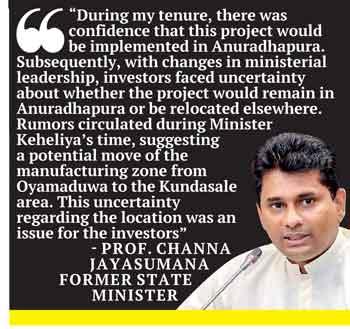 Eighty-five percent of the nation’s pharmaceutical requirements are sourced from imports.The annual expenditure on imports amounts to 130 billion rupees. During that period, the government foresaw making a potential annual saving of 60 billion rupees by meeting the nation’s pharmaceutical needs domestically. This calculation was based on the fact that Sri Lanka rated as the highest importer of drugs in Asia. Former President Gotabaya Rajapaksa, urging an immediate change in this situation, sought local large-scale investors capable of contributing to the production of medicines in the country.
Eighty-five percent of the nation’s pharmaceutical requirements are sourced from imports.The annual expenditure on imports amounts to 130 billion rupees. During that period, the government foresaw making a potential annual saving of 60 billion rupees by meeting the nation’s pharmaceutical needs domestically. This calculation was based on the fact that Sri Lanka rated as the highest importer of drugs in Asia. Former President Gotabaya Rajapaksa, urging an immediate change in this situation, sought local large-scale investors capable of contributing to the production of medicines in the country.
The site where the Deyata Kirula exhibition took place in Oyamaduwa, Anuradhapura was chosen for a pharmaceutical investment zone. The land was owned by the National Livestock Development Board. Out of the 400 acres allocated for Deyata Kirula, 80 acres was designated for the pharmaceutical investment zone. Twenty-four medium-sized businessmen were prepared to invest over 300 million USD in the project.
Forty two (42) percent of the country’s total pharmaceutical and medical equipment requirements are to be produced by these pharmaceutical industries. The foundation stone for the factory of this initiative, named Oyamaduwa “Suvasiripura” pharmaceutical manufacturing zone, was laid in 2021 by former Minister of State for Pharmaceutical Production, Supply, and Regulation, Prof. Channa Jayasumana. Through the project there is an aim to manufacture 236 types of medicines and 44 surgical instruments within Sri Lanka. The goal for this initiative was to manufacture all drugs feasible for production within the country. It was to be done adhering to international standards. High-quality drugs were to be produced and made available to patients at a low cost. The project was to be initiated by local investors and its entire cost was to be borne by them. The foundation stone for the factory was laid in 2021, and the plan was to complete the facility within three years. However, although the plan remains unchanged, the construction of pharmaceutical factories is currently progressing at a slow pace. Approximately 100 project name boards can be found in the manufacturing zone and surrounding towns. The land, covering 80 acres, has undergone a clearing process leading to the removal of large Palu and Buruta trees. The tank in this precinct that catered to the animals in providing them with water had also been developed in such a way that it no longer serves this purpose. At present when one walks around this manufacturing zone, such transformations are strikingly evident. However, despite all these changes to the environment the manufacturing zone does not appear to have commenced operations.
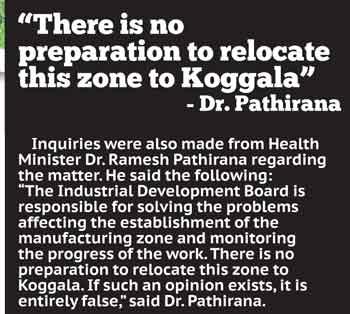 There is a proposal to lease plots of land for a period of 35 years with a tax holiday for the first 5 years. This facility will be provided to selected investors who are involved in the pharmaceutical manufacturing zone. The Ministry of Health has planned to provide guidelines in the production, supply and regulation of medicines in this proposed pharmaceutical production zone, which will be operated as a strategic development project under the State Ministries. The cabinet has also approved this project because of its significant benefits to the country. Twenty four investors for this project were chosen by an expert committee after considering proposals from qualified investors. The then government announced that the anticipated investment by these investors for this project was over 300 million rupees. However, due to the prevailing unfavourable political climate and economic challenges in the country, the construction of these pharmaceutical factories was subject to continuous delays. Though about 20 factories were initially expected to be completed within three years, only one factory has been built so far; even its construction is not yet complete. The foundation stone for the second factory was laid last January.
There is a proposal to lease plots of land for a period of 35 years with a tax holiday for the first 5 years. This facility will be provided to selected investors who are involved in the pharmaceutical manufacturing zone. The Ministry of Health has planned to provide guidelines in the production, supply and regulation of medicines in this proposed pharmaceutical production zone, which will be operated as a strategic development project under the State Ministries. The cabinet has also approved this project because of its significant benefits to the country. Twenty four investors for this project were chosen by an expert committee after considering proposals from qualified investors. The then government announced that the anticipated investment by these investors for this project was over 300 million rupees. However, due to the prevailing unfavourable political climate and economic challenges in the country, the construction of these pharmaceutical factories was subject to continuous delays. Though about 20 factories were initially expected to be completed within three years, only one factory has been built so far; even its construction is not yet complete. The foundation stone for the second factory was laid last January.
But the government could not open even a single factory for a period of three years. This was in a situation where emerging evidence suggested that some individuals in the health sector were involved in importing substandard drugs at higher prices and thereby purporting an island wide shortage of drugs. Against this backdrop, the citizens of this country would certainly experience greater benefits if the interest in developing the pharmaceutical manufacturing zone in Oyamaduwa is pursued. If this project becomes a reality patients would be able to purchase quality medicines at lower prices. However, there is sufficient doubt to entertain the thought whether delaying the establishment of the zone has benefited certain individuals. This is because there is information regarding a drug fraud.
Furthermore, the Ministry of Health took steps to rearrange investments in this manufacturing zone by securing agreements with companies interested in investing in the project. Twelve such companies signed these agreements in an event chaired by Keheliya Rambukwella, the Health Minister at that time. Contracts for these investments were also offered. However, although 24 companies had initially agreed to invest in this manufacturing zone, only 12 factories ultimately became part of the investment.
The delay in investment by the relevant companies in the pharmaceutical manufacturing zone was not solely attributed to the economic crisis. Numerous challenges have emerged in providing infrastructure for the factories under construction. There are also issues related to water, electricity, concerns about wild elephants and difficulties in obtaining technical support from the Department of Wildlife and Conservation (DWC) when constructing elephant fences. Recent discussions have taken place between the relevant investment companies and the Ministry of Health. Given these circumstances, the government should possess the capability to address these issues promptly, offer solutions to the problems and provide encouragement to the investors.
During Keheliya Rambukwella’s tenure as Minister of Health, companies including Maliban Bioventures (Pvt.) Ltd, George Steuart Health (Pvt.) Ltd, Luxus Medicine (Pvt.) Ltd, Premium International Biologics (Pvt) Ltd, Epione Health Services (Pvt.) Ltd, NU Life Biotech (Pvt.) Ltd, Neolina Holdings (Pvt.) Ltd, Nivarana (Pvt.) Ltd, Blue Ceylon Investment Holdings (Pvt.) Ltd, Meditech Lanka (Pvt) Ltd, and Clean Ozo Bio – Bin’s (Pvt) Ltd signed contracts to be involved in this project. If these companies have not yet initiated their activities, the government should inquire into these delays and address any issues that may have affected the progress of the operation. Quick action taken to kick start this zone could potentially elevate the production of local medicines from the current 15-20 percent to a substantial 60-80 percent level.
Due to the establishment of this pharmaceutical manufacturing zone, 2000 direct employment opportunities will be generated for the youth in the area. Additionally, more than 5000 people will benefit from indirect employment opportunities. The total investment for the zone amounts to 80 billion rupees. The Ministry of Health maintains that these investments are coming through local investments.
According to an announcement from the Ministry of Health, Spectrum PharmaTECHLanka Pvt Ltd, a Sri Lankan subsidiary of Spectrum PharmaTECHConsultants Pvt. Ltd, India, will be responsible for the development and management of the manufacturing zone. There are plans to export these pharmaceutical products; the anticipated annual income from this project is about one billion dollars. Dr. Ramesh Pathirana, the Minister of Industry and Health, has assured investors that the infrastructure challenges affecting the establishment of the manufacturing zone will be promptly resolved and the pharmaceutical manufacturing zone will be inaugurated. This assurance was given during a discussion between the Minister and representatives of the Oyamaduwa Pharmaceutical Manufacturers Association.
This newspaper also made inquiries from Manjari C. Chandradasa, Divisional Secretary of Maha Vilachchiya, regarding the issues causing delays in this project. She had this to say: “The Ministry of Health decided who would oversee this project in this manufacturing zone that was initiated at the end of 2021. We were instructed to allocate land for this purpose. Consequently, we allocated 80 acres to initiate 20 factories. Subsequent land allocations were based on the specific needs of the respective factories. The plan was formulated by the Ministry of Health. Lease approval has been granted for 19 out of the 20 plots of land. Presently, 10 plots of land have been designated for leasehold preparation. At present, one factory is in the final stages of construction, and the foundation stone for another factory has been laid,” she stated.
Inquiries were also made from former State Minister Professor Channa Jayasumana on this matter. The former state minister shared the following perspective: “Investors initially stepped forward to start the manufacturing zone with the understanding that the government would purchase all medicines produced by this project. Additionally, there was a plan to export surplus medicines. However, when the Covid-19 epidemic emerged, investors hesitated due to the prevailing situation in the country. This was because questions arose whether the government would buy these medicines, or whether the investors would be able to sell the medicines they produce. During my tenure, there was confidence that this project would be implemented in Anuradhapura. Subsequently, with changes in ministerial leadership, investors faced uncertainty about whether the project would remain in Anuradhapura or be relocated elsewhere. Rumors circulated during Minister Keheliya’s time, suggesting a potential move of the manufacturing zone from Oyamaduwa to the Kundasale area. This uncertainty regarding the location was an issue for the investors. Later, there was speculation about relocating the manufacturing zone to Koggala. Consequently, investors hesitated again to invest. Their concern is that, despite investing in building a manufacturing zone, the medicine will not be purchased and that contributed to the delay in the project,” said Prof. Jayasumana.
“But Oyamaduwa still remains as the ideal location for the pharmaceutical manufacturing zone. There are necessary facilities and infrastructure in that area. I still opine that the same area is the most suitable for that purpose,” Prof. Jayasumana added.
If this manufacturing zone is beneficial for the country, the government should intervene and initiate it promptly. However, if there is a change of ministers who are in charge of this subject and the successors of the past minister attempt to move such projects to their areas of preference, the delays that are caused due to such developments cannot be approved.
 ]]>
]]>
Out of the 400 acres allocated for Deyata Kirula, 80 acres was designated for the pharmaceutical investment zone. Twenty-four medium-sized businessmen were prepared to invest over 300 million USD in the project

- Twenty-four businessmen were prepared to invest over 300 million USD in a pharmaceutical manufacturing zone which is yet to be completed
- Through the project there is an aim to manufacture 236 types of medicines and 44 surgical instruments within Sri Lanka
- There was speculation regarding relocating the manufacturing zone to Koggala and this made investors hesitate whether to invest or not
- Due to the establishment of this pharmaceutical manufacturing zone, 2000 direct employment opportunities will be generated for the youth in the area
- The total investment on the zone amounts to 80 billion rupees
- The then government announced that the anticipated investment by these investors for this project was over 300 million rupees
- Sri Lanka was at one time rated as the highest importer of drugs in Asia
- There is a proposal to lease plots of land in the pharmaceutical manufacturing zone for a period of 35 years with a tax holiday for the first 5 years
 In 2021, former President Gotabaya Rajapaksa had a goal to produce 50% of the country’s pharmaceutical needs locally by the year 2024. This goal was set during a time when the state was spending Rs 130 billion annually to import the needed quantum of pharmaceuticals. The government’s plan was to offer high-quality medicines at affordable prices to both the foreign market and the local population. Consequently, steps were taken to establish a pharmaceutical manufacturing zone in Sri Lanka to meet recommendations and standards of the World Health Organization (WHO).
In 2021, former President Gotabaya Rajapaksa had a goal to produce 50% of the country’s pharmaceutical needs locally by the year 2024. This goal was set during a time when the state was spending Rs 130 billion annually to import the needed quantum of pharmaceuticals. The government’s plan was to offer high-quality medicines at affordable prices to both the foreign market and the local population. Consequently, steps were taken to establish a pharmaceutical manufacturing zone in Sri Lanka to meet recommendations and standards of the World Health Organization (WHO).
 Eighty-five percent of the nation’s pharmaceutical requirements are sourced from imports.The annual expenditure on imports amounts to 130 billion rupees. During that period, the government foresaw making a potential annual saving of 60 billion rupees by meeting the nation’s pharmaceutical needs domestically. This calculation was based on the fact that Sri Lanka rated as the highest importer of drugs in Asia. Former President Gotabaya Rajapaksa, urging an immediate change in this situation, sought local large-scale investors capable of contributing to the production of medicines in the country.
Eighty-five percent of the nation’s pharmaceutical requirements are sourced from imports.The annual expenditure on imports amounts to 130 billion rupees. During that period, the government foresaw making a potential annual saving of 60 billion rupees by meeting the nation’s pharmaceutical needs domestically. This calculation was based on the fact that Sri Lanka rated as the highest importer of drugs in Asia. Former President Gotabaya Rajapaksa, urging an immediate change in this situation, sought local large-scale investors capable of contributing to the production of medicines in the country.
The site where the Deyata Kirula exhibition took place in Oyamaduwa, Anuradhapura was chosen for a pharmaceutical investment zone. The land was owned by the National Livestock Development Board. Out of the 400 acres allocated for Deyata Kirula, 80 acres was designated for the pharmaceutical investment zone. Twenty-four medium-sized businessmen were prepared to invest over 300 million USD in the project.
Forty two (42) percent of the country’s total pharmaceutical and medical equipment requirements are to be produced by these pharmaceutical industries. The foundation stone for the factory of this initiative, named Oyamaduwa “Suvasiripura” pharmaceutical manufacturing zone, was laid in 2021 by former Minister of State for Pharmaceutical Production, Supply, and Regulation, Prof. Channa Jayasumana. Through the project there is an aim to manufacture 236 types of medicines and 44 surgical instruments within Sri Lanka. The goal for this initiative was to manufacture all drugs feasible for production within the country. It was to be done adhering to international standards. High-quality drugs were to be produced and made available to patients at a low cost. The project was to be initiated by local investors and its entire cost was to be borne by them. The foundation stone for the factory was laid in 2021, and the plan was to complete the facility within three years. However, although the plan remains unchanged, the construction of pharmaceutical factories is currently progressing at a slow pace. Approximately 100 project name boards can be found in the manufacturing zone and surrounding towns. The land, covering 80 acres, has undergone a clearing process leading to the removal of large Palu and Buruta trees. The tank in this precinct that catered to the animals in providing them with water had also been developed in such a way that it no longer serves this purpose. At present when one walks around this manufacturing zone, such transformations are strikingly evident. However, despite all these changes to the environment the manufacturing zone does not appear to have commenced operations.
 There is a proposal to lease plots of land for a period of 35 years with a tax holiday for the first 5 years. This facility will be provided to selected investors who are involved in the pharmaceutical manufacturing zone. The Ministry of Health has planned to provide guidelines in the production, supply and regulation of medicines in this proposed pharmaceutical production zone, which will be operated as a strategic development project under the State Ministries. The cabinet has also approved this project because of its significant benefits to the country. Twenty four investors for this project were chosen by an expert committee after considering proposals from qualified investors. The then government announced that the anticipated investment by these investors for this project was over 300 million rupees. However, due to the prevailing unfavourable political climate and economic challenges in the country, the construction of these pharmaceutical factories was subject to continuous delays. Though about 20 factories were initially expected to be completed within three years, only one factory has been built so far; even its construction is not yet complete. The foundation stone for the second factory was laid last January.
There is a proposal to lease plots of land for a period of 35 years with a tax holiday for the first 5 years. This facility will be provided to selected investors who are involved in the pharmaceutical manufacturing zone. The Ministry of Health has planned to provide guidelines in the production, supply and regulation of medicines in this proposed pharmaceutical production zone, which will be operated as a strategic development project under the State Ministries. The cabinet has also approved this project because of its significant benefits to the country. Twenty four investors for this project were chosen by an expert committee after considering proposals from qualified investors. The then government announced that the anticipated investment by these investors for this project was over 300 million rupees. However, due to the prevailing unfavourable political climate and economic challenges in the country, the construction of these pharmaceutical factories was subject to continuous delays. Though about 20 factories were initially expected to be completed within three years, only one factory has been built so far; even its construction is not yet complete. The foundation stone for the second factory was laid last January.
But the government could not open even a single factory for a period of three years. This was in a situation where emerging evidence suggested that some individuals in the health sector were involved in importing substandard drugs at higher prices and thereby purporting an island wide shortage of drugs. Against this backdrop, the citizens of this country would certainly experience greater benefits if the interest in developing the pharmaceutical manufacturing zone in Oyamaduwa is pursued. If this project becomes a reality patients would be able to purchase quality medicines at lower prices. However, there is sufficient doubt to entertain the thought whether delaying the establishment of the zone has benefited certain individuals. This is because there is information regarding a drug fraud.
Furthermore, the Ministry of Health took steps to rearrange investments in this manufacturing zone by securing agreements with companies interested in investing in the project. Twelve such companies signed these agreements in an event chaired by Keheliya Rambukwella, the Health Minister at that time. Contracts for these investments were also offered. However, although 24 companies had initially agreed to invest in this manufacturing zone, only 12 factories ultimately became part of the investment.
The delay in investment by the relevant companies in the pharmaceutical manufacturing zone was not solely attributed to the economic crisis. Numerous challenges have emerged in providing infrastructure for the factories under construction. There are also issues related to water, electricity, concerns about wild elephants and difficulties in obtaining technical support from the Department of Wildlife and Conservation (DWC) when constructing elephant fences. Recent discussions have taken place between the relevant investment companies and the Ministry of Health. Given these circumstances, the government should possess the capability to address these issues promptly, offer solutions to the problems and provide encouragement to the investors.
During Keheliya Rambukwella’s tenure as Minister of Health, companies including Maliban Bioventures (Pvt.) Ltd, George Steuart Health (Pvt.) Ltd, Luxus Medicine (Pvt.) Ltd, Premium International Biologics (Pvt) Ltd, Epione Health Services (Pvt.) Ltd, NU Life Biotech (Pvt.) Ltd, Neolina Holdings (Pvt.) Ltd, Nivarana (Pvt.) Ltd, Blue Ceylon Investment Holdings (Pvt.) Ltd, Meditech Lanka (Pvt) Ltd, and Clean Ozo Bio – Bin’s (Pvt) Ltd signed contracts to be involved in this project. If these companies have not yet initiated their activities, the government should inquire into these delays and address any issues that may have affected the progress of the operation. Quick action taken to kick start this zone could potentially elevate the production of local medicines from the current 15-20 percent to a substantial 60-80 percent level.
Due to the establishment of this pharmaceutical manufacturing zone, 2000 direct employment opportunities will be generated for the youth in the area. Additionally, more than 5000 people will benefit from indirect employment opportunities. The total investment for the zone amounts to 80 billion rupees. The Ministry of Health maintains that these investments are coming through local investments.
According to an announcement from the Ministry of Health, Spectrum PharmaTECHLanka Pvt Ltd, a Sri Lankan subsidiary of Spectrum PharmaTECHConsultants Pvt. Ltd, India, will be responsible for the development and management of the manufacturing zone. There are plans to export these pharmaceutical products; the anticipated annual income from this project is about one billion dollars. Dr. Ramesh Pathirana, the Minister of Industry and Health, has assured investors that the infrastructure challenges affecting the establishment of the manufacturing zone will be promptly resolved and the pharmaceutical manufacturing zone will be inaugurated. This assurance was given during a discussion between the Minister and representatives of the Oyamaduwa Pharmaceutical Manufacturers Association.
This newspaper also made inquiries from Manjari C. Chandradasa, Divisional Secretary of Maha Vilachchiya, regarding the issues causing delays in this project. She had this to say: “The Ministry of Health decided who would oversee this project in this manufacturing zone that was initiated at the end of 2021. We were instructed to allocate land for this purpose. Consequently, we allocated 80 acres to initiate 20 factories. Subsequent land allocations were based on the specific needs of the respective factories. The plan was formulated by the Ministry of Health. Lease approval has been granted for 19 out of the 20 plots of land. Presently, 10 plots of land have been designated for leasehold preparation. At present, one factory is in the final stages of construction, and the foundation stone for another factory has been laid,” she stated.
Inquiries were also made from former State Minister Professor Channa Jayasumana on this matter. The former state minister shared the following perspective: “Investors initially stepped forward to start the manufacturing zone with the understanding that the government would purchase all medicines produced by this project. Additionally, there was a plan to export surplus medicines. However, when the Covid-19 epidemic emerged, investors hesitated due to the prevailing situation in the country. This was because questions arose whether the government would buy these medicines, or whether the investors would be able to sell the medicines they produce. During my tenure, there was confidence that this project would be implemented in Anuradhapura. Subsequently, with changes in ministerial leadership, investors faced uncertainty about whether the project would remain in Anuradhapura or be relocated elsewhere. Rumors circulated during Minister Keheliya’s time, suggesting a potential move of the manufacturing zone from Oyamaduwa to the Kundasale area. This uncertainty regarding the location was an issue for the investors. Later, there was speculation about relocating the manufacturing zone to Koggala. Consequently, investors hesitated again to invest. Their concern is that, despite investing in building a manufacturing zone, the medicine will not be purchased and that contributed to the delay in the project,” said Prof. Jayasumana.
“But Oyamaduwa still remains as the ideal location for the pharmaceutical manufacturing zone. There are necessary facilities and infrastructure in that area. I still opine that the same area is the most suitable for that purpose,” Prof. Jayasumana added.
If this manufacturing zone is beneficial for the country, the government should intervene and initiate it promptly. However, if there is a change of ministers who are in charge of this subject and the successors of the past minister attempt to move such projects to their areas of preference, the delays that are caused due to such developments cannot be approved.
 ]]>
]]>

Duminda Silva Hirunika Premachandra
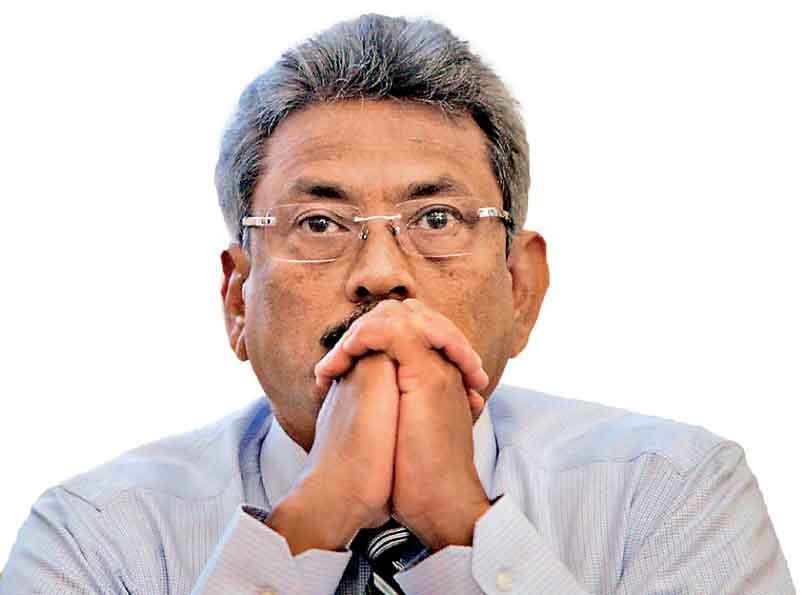
Former President Gotabaya Rajapaksa
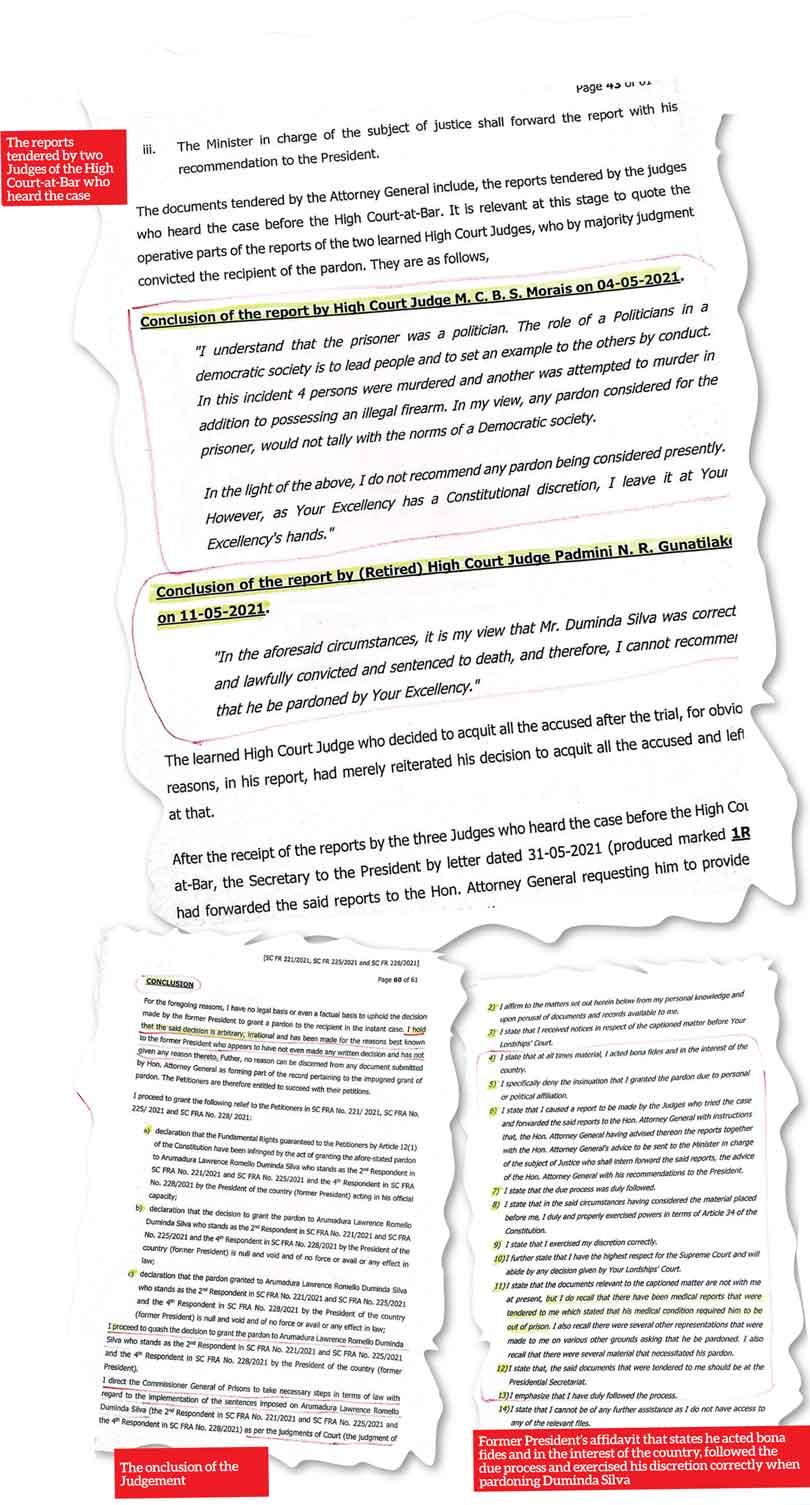
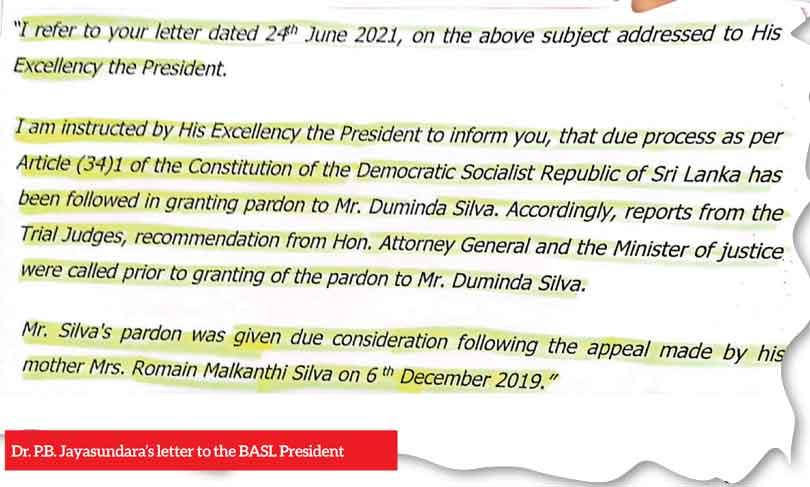
- All the counsels, who appeared for the three petitioners, stated that Rajapaksa infringed the FR guaranteed to each citizen, in terms of Article 12 of the Constitution
- The Counsels for the Petitioners further said that Rajapaksa had completely ignored the provisions in Article 35 of the Constitution and has acted arbitrarily and outside the powers given to him
- The only document which indicates that such a pardon has been granted was Dr. Jayasundera’s letter to the President BASL dated July 5, 2021
- In Dr. Jayasundera’s letter, it is clear that it has been written after the conclusion of granting the pardon
 It has now come to light how former President Gotabaya Rajapaksa acted arbitrary and unreasonably for reasons best known to him when granting pardon to former parliamentarian Duminda Silva in 2021.
It has now come to light how former President Gotabaya Rajapaksa acted arbitrary and unreasonably for reasons best known to him when granting pardon to former parliamentarian Duminda Silva in 2021.
Although the recent Supreme Court (SC) Judgement that quashed Silva’s pardon reveals this, the former President by an affidavit dated February 3, 2023, has informed the Apex Court that he followed the due process and exercised powers duly and properly in terms of Article 34 of the Constitution and implemented his discretion correctly when granting pardon to Silva.
The three bench that quashed Silva’s pardon on January 17, 2024 comprised Justices P. Padman Surasena, E.A.G.R. Amarasekera and Arjuna Obeyesekere.
President’s Counsel M.A. Sumanthiran with Suren Fernando, Niranjan Arulpragasam and Khyati Wickramanayake appeared for the Petitioner Hirunika Premachandra in SC FRA 221/21.
Sumana Premachandra (SC FR 225/21) and former member of the Human Rights Commission Attorney at Law Ghasali Hussain (SC FR 228/21) too filed two separate FR Applications.
Appearing for Rajapaksa, Manohara de Silva PC, in his submissions, stated that the SC should not exercise its powers and review the pardon granted by the President to which both Gamini Marapana PC and Anuja Premaratne PC- who appeared for Duminda Silva in case No: SC FR 221/21 and228/21- respectively took the similar position on the review ability of the pardon granted.
However, the three member bench held that the grant of a pardon to an offender by the President is reviewable by the SC in terms of its jurisdiction under Article 126 of the constitution.
All the counsels, who appeared for the three petitioners, stated that Rajapaksa infringed the FR guaranteed to each citizen, in terms of Article 12 of the Constitution, when he chose to grant the pardon only to Silva ignoring the other three convicted by the Trial-at Bar which was affirmed by the SC.
“The President of the country should treat all prisoners equally. A treatment that’s not equal cannot be expected from the Head of the State when there are many convicts with severe sicknesses on death row,” a leading legal luminary said on condition of anonymity.
The Counsels for the Petitioners further said that Rajapaksa had completely ignored the provisions in Article 35 of the Constitution and has acted arbitrarily and outside the powers given to him by the constitution;the decision taken by him is irrational, unreasonable and cannot be supported by any reason;has failed to give any reason whatsoever to justify his decision and has completely ignored the provisions in Section 3(q)of the Assistance to and protection of Victims of Crime and Witnesses Protection Act No. 4 of 2015 as amended; had made a biased decision when he chose to grant the pardon who is one of his close friends and a political ally and the pardon granted erodes the confidence the public has reposed in the criminal justice system of the country.
When the appeal was taken up by the SC, by an interim order, directed the Attorney General (1A Respondent), Minister of Justice Ali Sabry PC (3rdRespondent) and the 4th Respondent President Bar Association of Sri Lanka (BASL) Saliya Peiris PC, to submit all relevant documentation pertaining to the pardon including the communications sent by the President and the recommendations the latter received.
The other documents that were expected to be submitted to Court were- any petition for release/ pardon submitted on behalf of Silva; the report/s if any caused to be made to the President by the Hon. Judges who heard the case initially; the advice of the AG and the documentation that was forwarded to Minister of Justice; the recommendations made by the Minister of Justice which was submitted to the President along with any other documentation;correspondence between the BASL and the President on the subject matter and a true copy of the Gazette, proclamation or document containing the decision in granting pardon.
But the AG by his motion dated July 28, 2022, has submitted only the following documents-the request made by Duminda Silva’s mother; the request made by 117 MPs; Secretary to the President’s letter to the AG; the reports of the Judges of the Trial-at-Bar; the advice of the AG to the Minister of Justice and President’s Secretary Dr. P.B. Jayasundera’s letter to the President of the BASL.
Although the court expected the relevant respondents to submit the record pertaining to the pardon - a copy of the gazette, proclamation or document containing the decision, neither the AG nor any other Respondent submitted the said document.
The only document which indicates that such a pardon has been granted was Dr. Jayasundera’s letter to the President BASL dated July 5, 2021.
Dr. Jayasundera’s letter to the President BASL states, ‘I refer to your letter dated June 24, 2021, on the above subject addressed to the President.
‘I am instructed by the President to inform you that due process as per article 34 (1) of the Constitution has been followed in granting pardon to Mr. Duminda Silva. Accordingly, reports from the Trial Judges, recommendation from the AG and the Minister of Justice were called prior to granting of the pardon.
‘Mr. Silva’s pardon was given due consideration following the appeal made by his mother Mrs. Romain Malkanthi Silva on December 6, 2019’.
In Dr. Jayasundera’s letter, it is clear that it has been written after the conclusion of granting the pardon. By this letter he has neither divulged as to when the pardon was granted nor given the reason why it was granted.
Further to the affidavit submitted by Rajapaksa, it states that he called reports from the Judges of the Trial-at-Bar and forwarded them to the AG. These reports and the AG’s advice had been then sent to the Minister of Justice. Later he had obtained the Minister’s recommendations together with the said reports and AG’s advice.
The affidavit further states, ‘Having considered the material placed before me, I duly and properly exercised powers in terms of Article 34 of the Constitution. I state that I acted bona fides in the interest of the country; I state that the documents relevant to the captioned matter are not with me at present, but I do recall that there have been medical reports that were tendered to me which stated that his medical condition required him to be out of prison. I also recall there were several other representations that were made to me on various other grounds asking that he be pardoned. I also recall that there were several material that necessitated his pardon’.
“What is the interest of the country he had taken into consideration?None of the documents the AG has submitted has ever indicated that the granting of the pardon was based on such a reason- interest of the country,” the sources said.
As per the Judgement, this position taken by the former President is not supported either by himself or by the other documentation before the court. Therefor it is unable to accept that the President had acted in the interest of the country when he decided to grant the pardon. Apart from the reports of the Judges at the High Court-at- Bar, the advice of the AG to the Minister and the recommendation of the Minister, there are only two other documents submitted to courts which could be regarded as material placed before the President for his decision. Those two documents contain the requests made by Silva’s mother and 117 Members of Parliament to grant pardon Silva. Although the President has stated that he recalls that there are several other representations made to him to pardon Silva, the court has not found any such material other than the said two letters.
When reports were called from the Judges of the High Court-at-Bar, M.C.B.S. Morais in his report dated May 4, 2021, has stated, ‘I understand that the prisoner was a politician. The role of a politician in a democratic society is to lead people and to set an example to the others by conduct. In this incident, four persons were murdered and there was attempted murder on another in addition to the possessing an illegal firearm. In my view any pardon considered for the prisoner would not tally with the norms of a democratic society.
‘In the light of the above, I do not recommend any pardon being considered presently. However, as your Excellency has a constitutional discretion I leave it in your Excellency’s hands’.
High Court Judge Morias in his report, submitted under Article 34 of the Constitution with regard to the prisoner, opined that in considering a pardon the President may consider whether the objectives of granting a pardon was achieved and the extent of such an achievement. He noted that if the sentence is converted to years of imprisonment, it would be equivalent to 132 years of imprisonment and the prisoner has so far approximately served only 4 years and 8 months of the term.
High Court Judge Padmini N.R. Gunathilake in her report dated May 11, 2021, has stated, ‘In the aforesaid circumstances, it is my view, that Duminda Silva was correctly and lawfully convicted and sentenced to death and therefore I cannot recommend that he be pardoned by Your Excellency’.
As per the Judgement, High Court Judge Shiran Gooneratne who decided to acquit all the accused for obvious reasons, in his report to the President’s Secretary had merely reiterated his decision to acquit all the accused and left it at that.
After the receipt of the reports from the three Judges, President’s Secretary had forwarded them to the AG requesting him to provide his advice on the matter to the Minister of Justice.
Minister advised on proper legal position
The AG by letter dated June 21, 2021, had clearly advised the Minister on the proper legal position with regard to the decision-making process by the President. The AG has advised the Minister that the power of pardon, remission can be exercised upon discovery of an evident mistake in the judgement or undue harshness in the punishment imposed.
He has further underscored the counts upon which the recipient of the pardon was convicted on four charges of murder; one count of attempted murder and two charges of criminal intimidation.
Having considered the AG’s advice, the Minister of Justice has written back to the President not making any positive recommendation to grant the pardon. But questions have been raised whether the Minister considered and acted on the given advisesby the AG.
Meanwhile, PC Sumanthiran, referring to the letter submitted to court that the assertion by the Justice Minister, that ‘Justice Shiran Gooneratne in a communication to the President’s Secretary has expressed the view that all accused in this case should be acquitted of all counts on the indictment’ is false.
In the judgement it says, ‘Thus, I observe that High Court Judge Gooneratne in his report had not expressed the view that all accused in this case should be acquitted of all counts on the indictment. What was stated in his communication to the Secretary to the President is the fact that he had acquitted all the accused from all counts in the indictment for the reasons he had set out in his judgement. Therefore, other than repeating the effect of his judgement, which was by that time well-known to everyone concerned, High Court Judge Gooneratne had not expressed any fresh view on the matter. He is also silent about any recommendation to the President is not supported by the contents of the report made by Justice Gooneratne.
The question arises as to which official recommended to the President that the pardon should be granted. The answer is that no such stakeholder had ever recommended to the President that this offender had to be granted a pardon.
The AG has made it clear that the pardon is not a private act of grace from an individual possessing power, but is a part of the constitutional scheme. The Minister had merely reproduced only a part of the advice provided to him by the AG.
The former President hasn’t followed due process when granting the pardon; had opted not to adhere to the AG’s advice; had not at all considered what the law has required him to consider and is unable to hold that Rajapaksa had exercised his discretion correctly.
In the judgement, it says ‘This court has constantly held that the President is not only bound by law, but it is also the duty of him to uphold the law of the country which is set out in Article 33(h) of the constitution.. The sovereignty is vested in the people of this country and not in the President of the country.
‘When taking into consideration the resources used by the State to administer justice in this case as demonstrated above, there is neither a decision nor any reason for the granting of the pardon; I have to accept the petitioners argument that the instant grant of pardon to the recipient by the President has totally eroded the confidence the public has reposed in the criminal justice system of the country.
In the two letters that were sent to the former President requesting to grant permission to Silva, one of the request for a pardon was based on the fact the recipient of pardon had suffered head injuries due to gunshot.
The judgement states, ‘I have to hold the argument that the former President had decided to grant the pardon to the recipient as he had suffered head injuries. It is relevant to note here that it is the Minister of Justice who would have been in a better position to ascertain the correct position regarding the health/treatment conditions of the recipient of the pardon since the prison come under the direct purview of the Ministry. The Minister in his report had not recommended that a pardon be granted to the recipient on such basis.
If the recipient of the pardon stands wrongly convicted as claimed because one of the High Court Judges in the Trial-at-Bar was bias, it is needless to say, that all others accused in this case also stand on similar circumstances. The question then arises as to why the former President picked on just one accused, namely the recipient of the pardon out of many accused to grant a pardon on that basis. Does such a move stand the test of rationality, reasonableness, intelligibility and objectively. The answer clearly is no. Such a move adopted by the former President would be more indicative of an arbitrary action rather than an objective decision’.
Concluding the hearing, the Bench declared that the decision to grant a pardon to the recipient is arbitrary, irrational and has been made for the reasons best known to the former President who appears to have not even made any written decision and has not given any reason thereto.
The judgement further states, ‘I proceed to quash the decision to grant the pardon to Duminda Silva by the President of the country. I direct the Commissioner General of Prisons to take necessary steps in terms of law to implement the sentence imposed on Silva as per the Judgements of High Court of Colombo (HC Colombo/ TAB 7781/2015/06) read with the Judgement of the SC in case No. SC/TAB/2A-D/2017)’.
Sri Jayawardenepura Hospital refused to transfer Duminda
Meanwhile Prison Spokesman Gamini Dissanayake said that all their efforts taken to get Silva transferred to the Prison Hospital from Sri Jayawardenepura General Hospital from the time he was arrested with the interim order failed because the Jayawardenepura Hospital authorities refused to transfer him claiming that his condition was serious and that the prison hospital does not have the facility to treat Silva.
“There are sicknesses to inmates that the prison hospital cannot treat and with the medical officer’s recommendation we transfer such prisoners to the National Hospital Colombo as it is the only hospital that has all necessary facilities to treat patients, but not any other hospital in the country.
According to the Prison Spokesman, Silva has to be supplied with oxygen when he gets the fit and a Consultant Physician that visit the prison hospital checks on his condition and prescribes medicine if needed. He further said that they had to furnish a report to the SC about the Jayawardenepura hospital and getting Silva back into the prison.
“No sooner he was brought to the prison, he complained of a breathing difficulty and was admitted to the prison hospital,” she said.
Meanwhile, trade union officers at the National Housing Development Authority (NHDA)- where Silva worked as the Chairman from June 2021 up to the time he was arrested- said that he had not shown any sign of sickness when working with them, but from the moment the interim order was issued he was hospitalised for a medical condition employees at the NHDA was not aware of.
 ]]>
]]>
Duminda Silva Hirunika Premachandra

Former President Gotabaya Rajapaksa


- All the counsels, who appeared for the three petitioners, stated that Rajapaksa infringed the FR guaranteed to each citizen, in terms of Article 12 of the Constitution
- The Counsels for the Petitioners further said that Rajapaksa had completely ignored the provisions in Article 35 of the Constitution and has acted arbitrarily and outside the powers given to him
- The only document which indicates that such a pardon has been granted was Dr. Jayasundera’s letter to the President BASL dated July 5, 2021
- In Dr. Jayasundera’s letter, it is clear that it has been written after the conclusion of granting the pardon
 It has now come to light how former President Gotabaya Rajapaksa acted arbitrary and unreasonably for reasons best known to him when granting pardon to former parliamentarian Duminda Silva in 2021.
It has now come to light how former President Gotabaya Rajapaksa acted arbitrary and unreasonably for reasons best known to him when granting pardon to former parliamentarian Duminda Silva in 2021.
Although the recent Supreme Court (SC) Judgement that quashed Silva’s pardon reveals this, the former President by an affidavit dated February 3, 2023, has informed the Apex Court that he followed the due process and exercised powers duly and properly in terms of Article 34 of the Constitution and implemented his discretion correctly when granting pardon to Silva.
The three bench that quashed Silva’s pardon on January 17, 2024 comprised Justices P. Padman Surasena, E.A.G.R. Amarasekera and Arjuna Obeyesekere.
President’s Counsel M.A. Sumanthiran with Suren Fernando, Niranjan Arulpragasam and Khyati Wickramanayake appeared for the Petitioner Hirunika Premachandra in SC FRA 221/21.
Sumana Premachandra (SC FR 225/21) and former member of the Human Rights Commission Attorney at Law Ghasali Hussain (SC FR 228/21) too filed two separate FR Applications.
Appearing for Rajapaksa, Manohara de Silva PC, in his submissions, stated that the SC should not exercise its powers and review the pardon granted by the President to which both Gamini Marapana PC and Anuja Premaratne PC- who appeared for Duminda Silva in case No: SC FR 221/21 and228/21- respectively took the similar position on the review ability of the pardon granted.
However, the three member bench held that the grant of a pardon to an offender by the President is reviewable by the SC in terms of its jurisdiction under Article 126 of the constitution.
All the counsels, who appeared for the three petitioners, stated that Rajapaksa infringed the FR guaranteed to each citizen, in terms of Article 12 of the Constitution, when he chose to grant the pardon only to Silva ignoring the other three convicted by the Trial-at Bar which was affirmed by the SC.
“The President of the country should treat all prisoners equally. A treatment that’s not equal cannot be expected from the Head of the State when there are many convicts with severe sicknesses on death row,” a leading legal luminary said on condition of anonymity.
The Counsels for the Petitioners further said that Rajapaksa had completely ignored the provisions in Article 35 of the Constitution and has acted arbitrarily and outside the powers given to him by the constitution;the decision taken by him is irrational, unreasonable and cannot be supported by any reason;has failed to give any reason whatsoever to justify his decision and has completely ignored the provisions in Section 3(q)of the Assistance to and protection of Victims of Crime and Witnesses Protection Act No. 4 of 2015 as amended; had made a biased decision when he chose to grant the pardon who is one of his close friends and a political ally and the pardon granted erodes the confidence the public has reposed in the criminal justice system of the country.
When the appeal was taken up by the SC, by an interim order, directed the Attorney General (1A Respondent), Minister of Justice Ali Sabry PC (3rdRespondent) and the 4th Respondent President Bar Association of Sri Lanka (BASL) Saliya Peiris PC, to submit all relevant documentation pertaining to the pardon including the communications sent by the President and the recommendations the latter received.
The other documents that were expected to be submitted to Court were- any petition for release/ pardon submitted on behalf of Silva; the report/s if any caused to be made to the President by the Hon. Judges who heard the case initially; the advice of the AG and the documentation that was forwarded to Minister of Justice; the recommendations made by the Minister of Justice which was submitted to the President along with any other documentation;correspondence between the BASL and the President on the subject matter and a true copy of the Gazette, proclamation or document containing the decision in granting pardon.
But the AG by his motion dated July 28, 2022, has submitted only the following documents-the request made by Duminda Silva’s mother; the request made by 117 MPs; Secretary to the President’s letter to the AG; the reports of the Judges of the Trial-at-Bar; the advice of the AG to the Minister of Justice and President’s Secretary Dr. P.B. Jayasundera’s letter to the President of the BASL.
Although the court expected the relevant respondents to submit the record pertaining to the pardon - a copy of the gazette, proclamation or document containing the decision, neither the AG nor any other Respondent submitted the said document.
The only document which indicates that such a pardon has been granted was Dr. Jayasundera’s letter to the President BASL dated July 5, 2021.
Dr. Jayasundera’s letter to the President BASL states, ‘I refer to your letter dated June 24, 2021, on the above subject addressed to the President.
‘I am instructed by the President to inform you that due process as per article 34 (1) of the Constitution has been followed in granting pardon to Mr. Duminda Silva. Accordingly, reports from the Trial Judges, recommendation from the AG and the Minister of Justice were called prior to granting of the pardon.
‘Mr. Silva’s pardon was given due consideration following the appeal made by his mother Mrs. Romain Malkanthi Silva on December 6, 2019’.
In Dr. Jayasundera’s letter, it is clear that it has been written after the conclusion of granting the pardon. By this letter he has neither divulged as to when the pardon was granted nor given the reason why it was granted.
Further to the affidavit submitted by Rajapaksa, it states that he called reports from the Judges of the Trial-at-Bar and forwarded them to the AG. These reports and the AG’s advice had been then sent to the Minister of Justice. Later he had obtained the Minister’s recommendations together with the said reports and AG’s advice.
The affidavit further states, ‘Having considered the material placed before me, I duly and properly exercised powers in terms of Article 34 of the Constitution. I state that I acted bona fides in the interest of the country; I state that the documents relevant to the captioned matter are not with me at present, but I do recall that there have been medical reports that were tendered to me which stated that his medical condition required him to be out of prison. I also recall there were several other representations that were made to me on various other grounds asking that he be pardoned. I also recall that there were several material that necessitated his pardon’.
“What is the interest of the country he had taken into consideration?None of the documents the AG has submitted has ever indicated that the granting of the pardon was based on such a reason- interest of the country,” the sources said.
As per the Judgement, this position taken by the former President is not supported either by himself or by the other documentation before the court. Therefor it is unable to accept that the President had acted in the interest of the country when he decided to grant the pardon. Apart from the reports of the Judges at the High Court-at- Bar, the advice of the AG to the Minister and the recommendation of the Minister, there are only two other documents submitted to courts which could be regarded as material placed before the President for his decision. Those two documents contain the requests made by Silva’s mother and 117 Members of Parliament to grant pardon Silva. Although the President has stated that he recalls that there are several other representations made to him to pardon Silva, the court has not found any such material other than the said two letters.
When reports were called from the Judges of the High Court-at-Bar, M.C.B.S. Morais in his report dated May 4, 2021, has stated, ‘I understand that the prisoner was a politician. The role of a politician in a democratic society is to lead people and to set an example to the others by conduct. In this incident, four persons were murdered and there was attempted murder on another in addition to the possessing an illegal firearm. In my view any pardon considered for the prisoner would not tally with the norms of a democratic society.
‘In the light of the above, I do not recommend any pardon being considered presently. However, as your Excellency has a constitutional discretion I leave it in your Excellency’s hands’.
High Court Judge Morias in his report, submitted under Article 34 of the Constitution with regard to the prisoner, opined that in considering a pardon the President may consider whether the objectives of granting a pardon was achieved and the extent of such an achievement. He noted that if the sentence is converted to years of imprisonment, it would be equivalent to 132 years of imprisonment and the prisoner has so far approximately served only 4 years and 8 months of the term.
High Court Judge Padmini N.R. Gunathilake in her report dated May 11, 2021, has stated, ‘In the aforesaid circumstances, it is my view, that Duminda Silva was correctly and lawfully convicted and sentenced to death and therefore I cannot recommend that he be pardoned by Your Excellency’.
As per the Judgement, High Court Judge Shiran Gooneratne who decided to acquit all the accused for obvious reasons, in his report to the President’s Secretary had merely reiterated his decision to acquit all the accused and left it at that.
After the receipt of the reports from the three Judges, President’s Secretary had forwarded them to the AG requesting him to provide his advice on the matter to the Minister of Justice.
Minister advised on proper legal position
The AG by letter dated June 21, 2021, had clearly advised the Minister on the proper legal position with regard to the decision-making process by the President. The AG has advised the Minister that the power of pardon, remission can be exercised upon discovery of an evident mistake in the judgement or undue harshness in the punishment imposed.
He has further underscored the counts upon which the recipient of the pardon was convicted on four charges of murder; one count of attempted murder and two charges of criminal intimidation.
Having considered the AG’s advice, the Minister of Justice has written back to the President not making any positive recommendation to grant the pardon. But questions have been raised whether the Minister considered and acted on the given advisesby the AG.
Meanwhile, PC Sumanthiran, referring to the letter submitted to court that the assertion by the Justice Minister, that ‘Justice Shiran Gooneratne in a communication to the President’s Secretary has expressed the view that all accused in this case should be acquitted of all counts on the indictment’ is false.
In the judgement it says, ‘Thus, I observe that High Court Judge Gooneratne in his report had not expressed the view that all accused in this case should be acquitted of all counts on the indictment. What was stated in his communication to the Secretary to the President is the fact that he had acquitted all the accused from all counts in the indictment for the reasons he had set out in his judgement. Therefore, other than repeating the effect of his judgement, which was by that time well-known to everyone concerned, High Court Judge Gooneratne had not expressed any fresh view on the matter. He is also silent about any recommendation to the President is not supported by the contents of the report made by Justice Gooneratne.
The question arises as to which official recommended to the President that the pardon should be granted. The answer is that no such stakeholder had ever recommended to the President that this offender had to be granted a pardon.
The AG has made it clear that the pardon is not a private act of grace from an individual possessing power, but is a part of the constitutional scheme. The Minister had merely reproduced only a part of the advice provided to him by the AG.
The former President hasn’t followed due process when granting the pardon; had opted not to adhere to the AG’s advice; had not at all considered what the law has required him to consider and is unable to hold that Rajapaksa had exercised his discretion correctly.
In the judgement, it says ‘This court has constantly held that the President is not only bound by law, but it is also the duty of him to uphold the law of the country which is set out in Article 33(h) of the constitution.. The sovereignty is vested in the people of this country and not in the President of the country.
‘When taking into consideration the resources used by the State to administer justice in this case as demonstrated above, there is neither a decision nor any reason for the granting of the pardon; I have to accept the petitioners argument that the instant grant of pardon to the recipient by the President has totally eroded the confidence the public has reposed in the criminal justice system of the country.
In the two letters that were sent to the former President requesting to grant permission to Silva, one of the request for a pardon was based on the fact the recipient of pardon had suffered head injuries due to gunshot.
The judgement states, ‘I have to hold the argument that the former President had decided to grant the pardon to the recipient as he had suffered head injuries. It is relevant to note here that it is the Minister of Justice who would have been in a better position to ascertain the correct position regarding the health/treatment conditions of the recipient of the pardon since the prison come under the direct purview of the Ministry. The Minister in his report had not recommended that a pardon be granted to the recipient on such basis.
If the recipient of the pardon stands wrongly convicted as claimed because one of the High Court Judges in the Trial-at-Bar was bias, it is needless to say, that all others accused in this case also stand on similar circumstances. The question then arises as to why the former President picked on just one accused, namely the recipient of the pardon out of many accused to grant a pardon on that basis. Does such a move stand the test of rationality, reasonableness, intelligibility and objectively. The answer clearly is no. Such a move adopted by the former President would be more indicative of an arbitrary action rather than an objective decision’.
Concluding the hearing, the Bench declared that the decision to grant a pardon to the recipient is arbitrary, irrational and has been made for the reasons best known to the former President who appears to have not even made any written decision and has not given any reason thereto.
The judgement further states, ‘I proceed to quash the decision to grant the pardon to Duminda Silva by the President of the country. I direct the Commissioner General of Prisons to take necessary steps in terms of law to implement the sentence imposed on Silva as per the Judgements of High Court of Colombo (HC Colombo/ TAB 7781/2015/06) read with the Judgement of the SC in case No. SC/TAB/2A-D/2017)’.
Sri Jayawardenepura Hospital refused to transfer Duminda
Meanwhile Prison Spokesman Gamini Dissanayake said that all their efforts taken to get Silva transferred to the Prison Hospital from Sri Jayawardenepura General Hospital from the time he was arrested with the interim order failed because the Jayawardenepura Hospital authorities refused to transfer him claiming that his condition was serious and that the prison hospital does not have the facility to treat Silva.
“There are sicknesses to inmates that the prison hospital cannot treat and with the medical officer’s recommendation we transfer such prisoners to the National Hospital Colombo as it is the only hospital that has all necessary facilities to treat patients, but not any other hospital in the country.
According to the Prison Spokesman, Silva has to be supplied with oxygen when he gets the fit and a Consultant Physician that visit the prison hospital checks on his condition and prescribes medicine if needed. He further said that they had to furnish a report to the SC about the Jayawardenepura hospital and getting Silva back into the prison.
“No sooner he was brought to the prison, he complained of a breathing difficulty and was admitted to the prison hospital,” she said.
Meanwhile, trade union officers at the National Housing Development Authority (NHDA)- where Silva worked as the Chairman from June 2021 up to the time he was arrested- said that he had not shown any sign of sickness when working with them, but from the moment the interim order was issued he was hospitalised for a medical condition employees at the NHDA was not aware of.
 ]]>
]]>
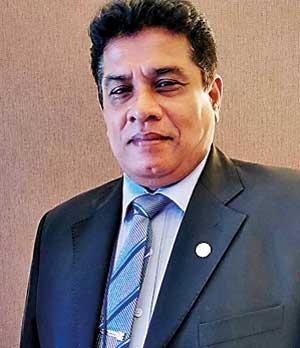
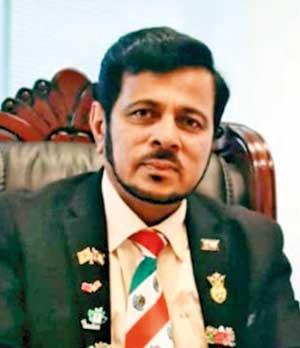
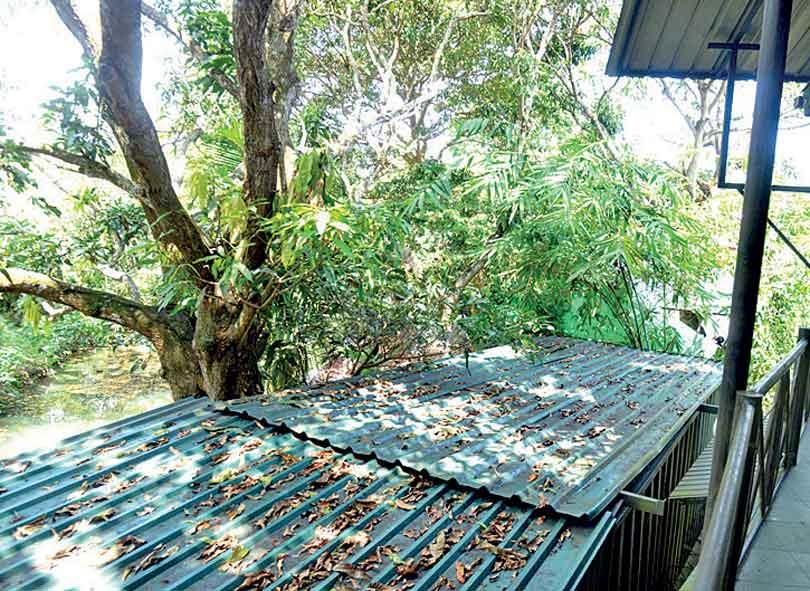
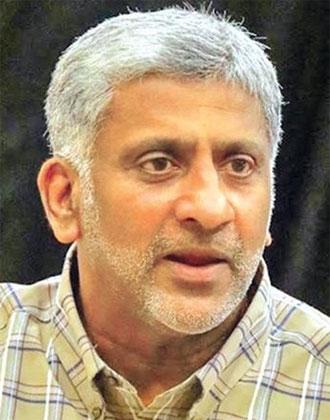
 No court decision has been issued to me or my wife to vacate the land that rightfully belongs to us”
No court decision has been issued to me or my wife to vacate the land that rightfully belongs to us”